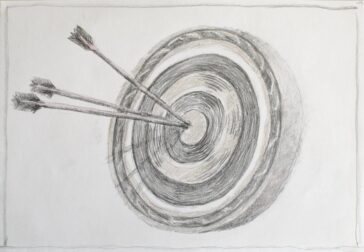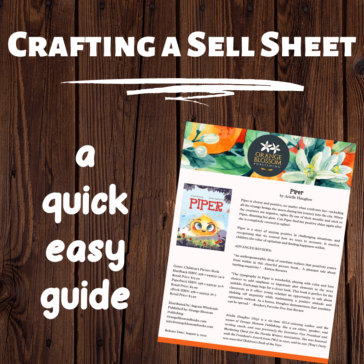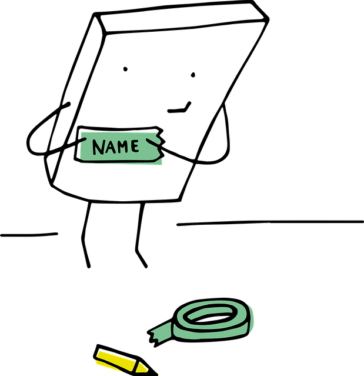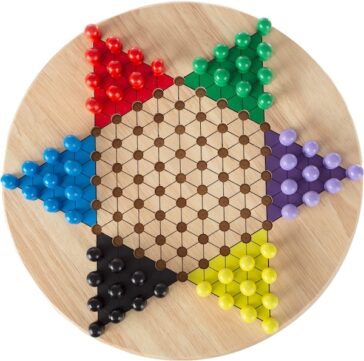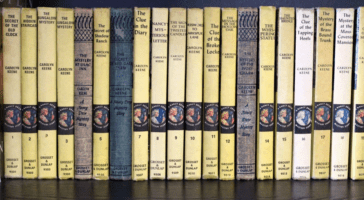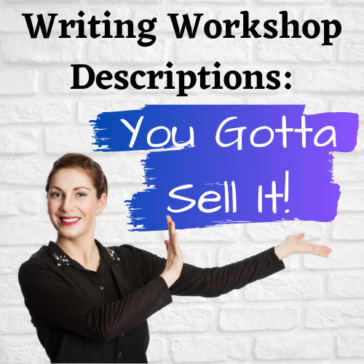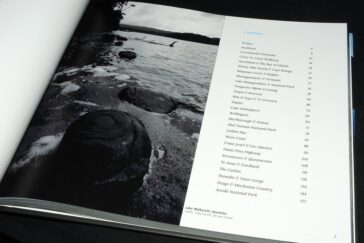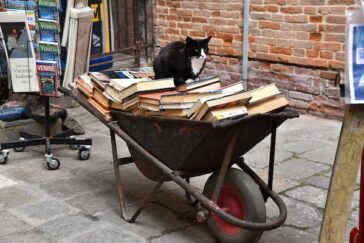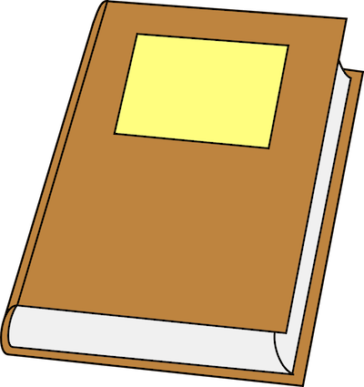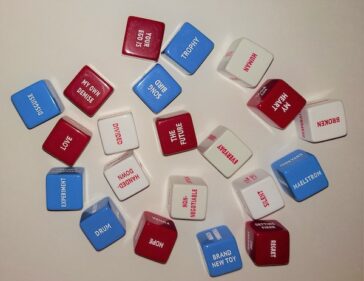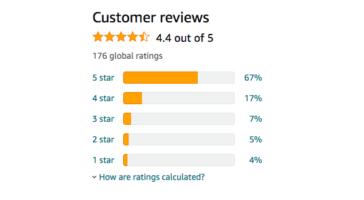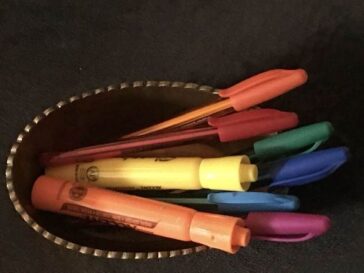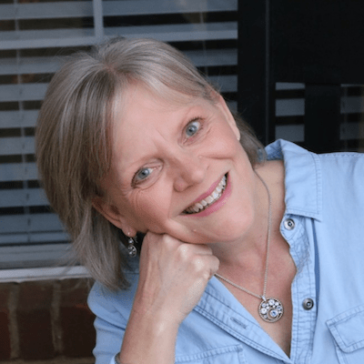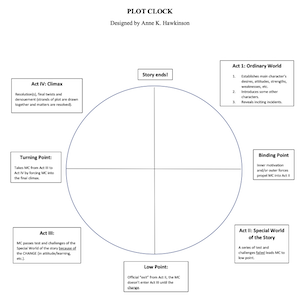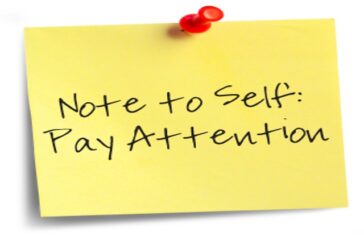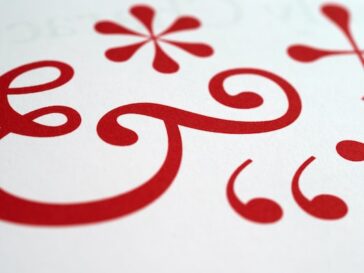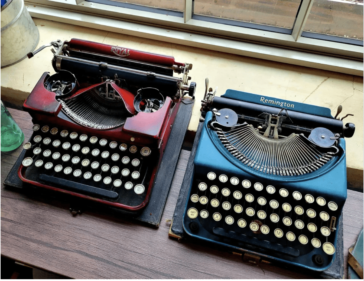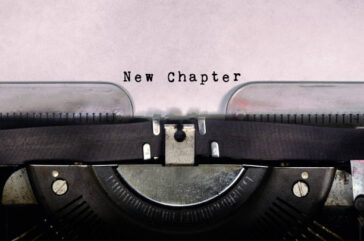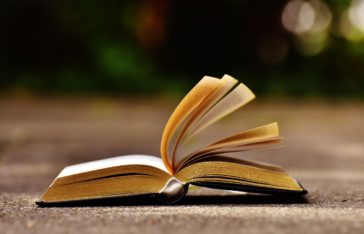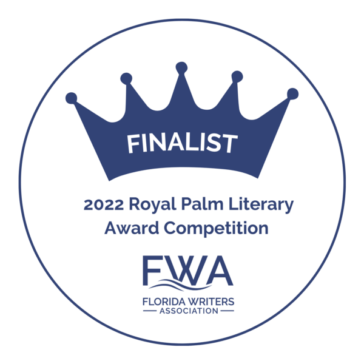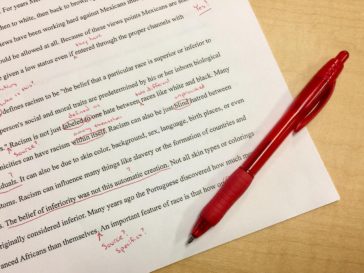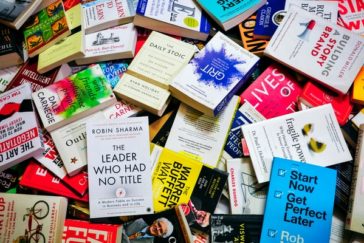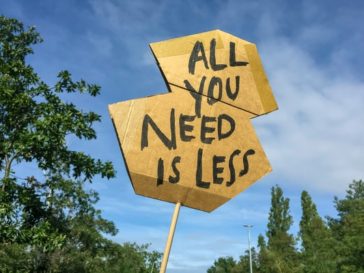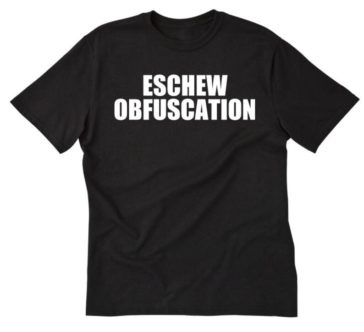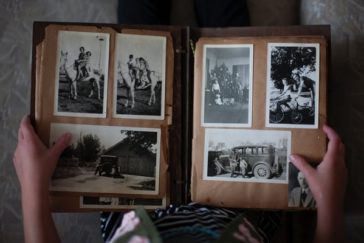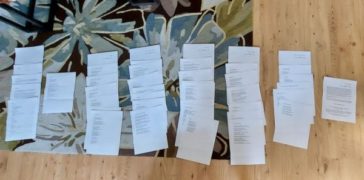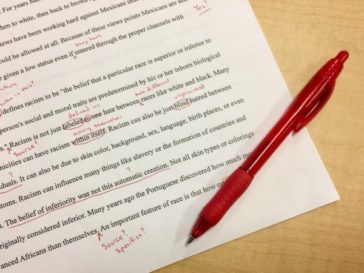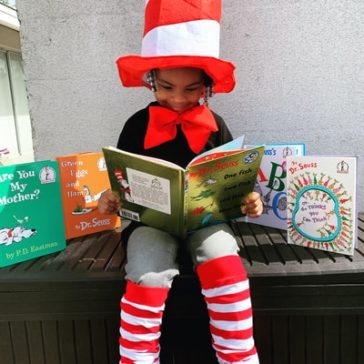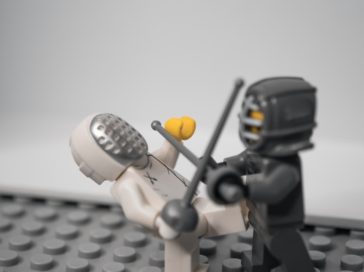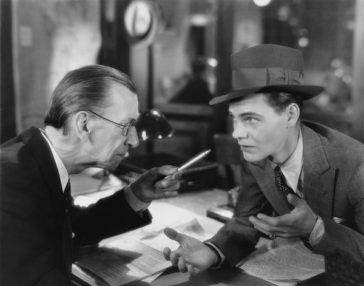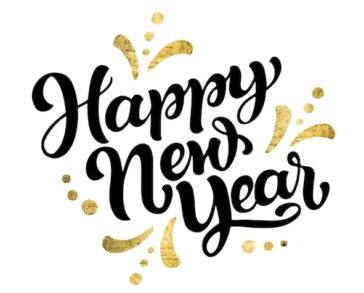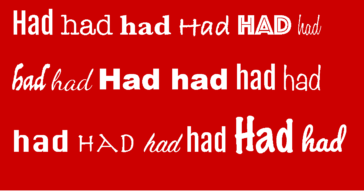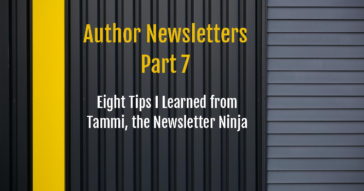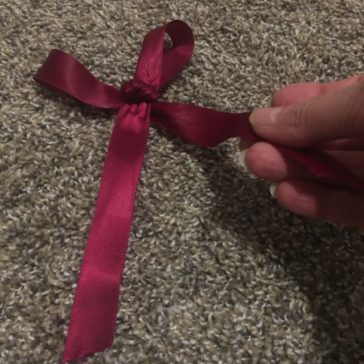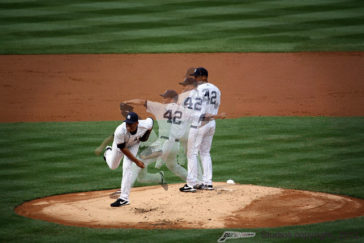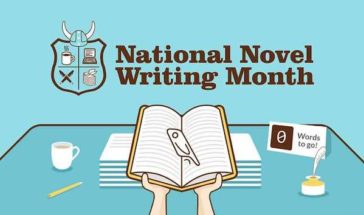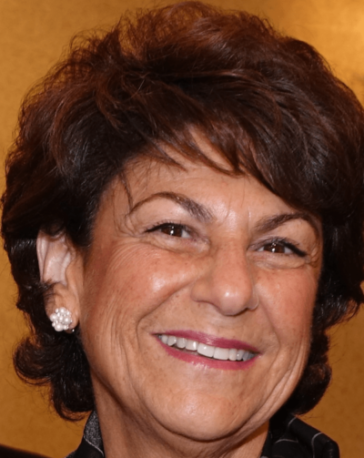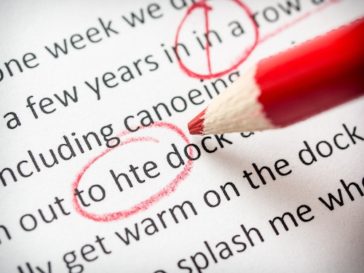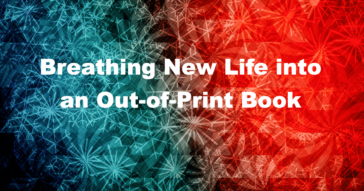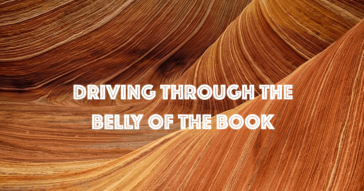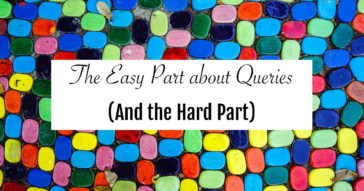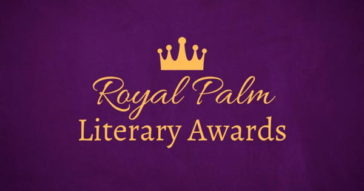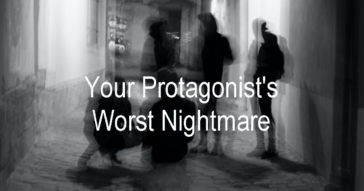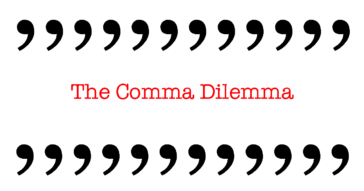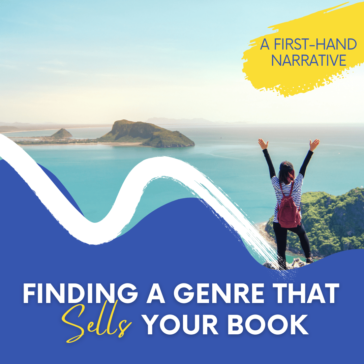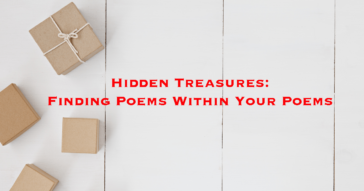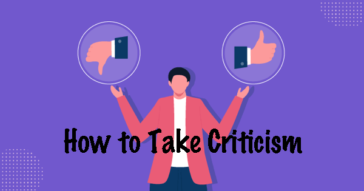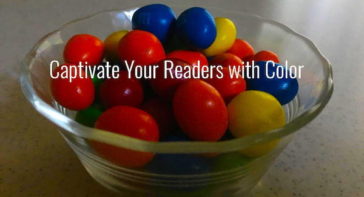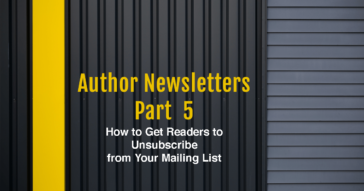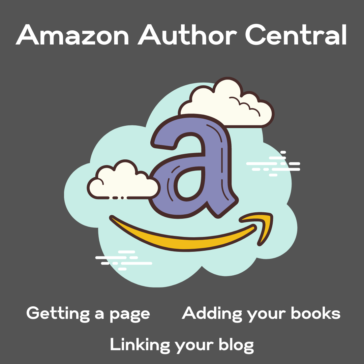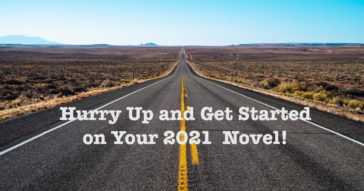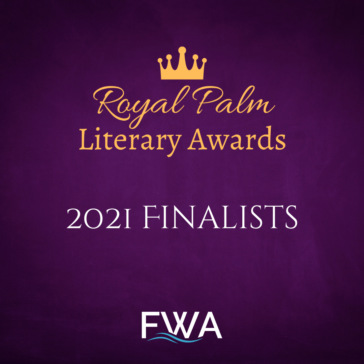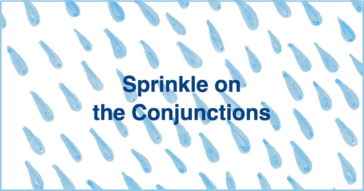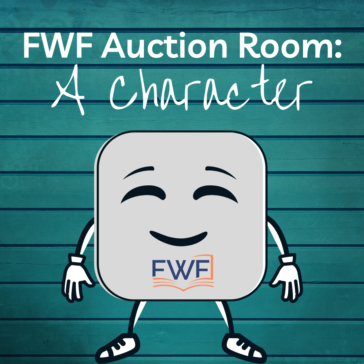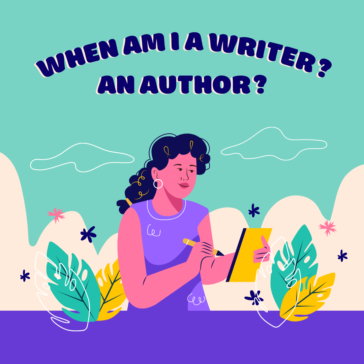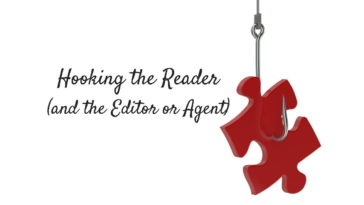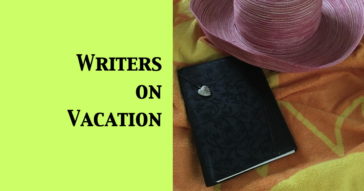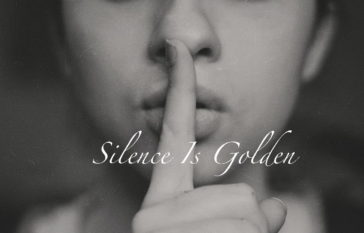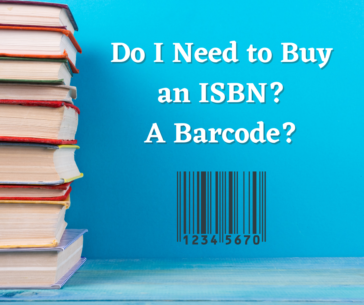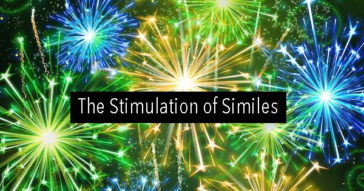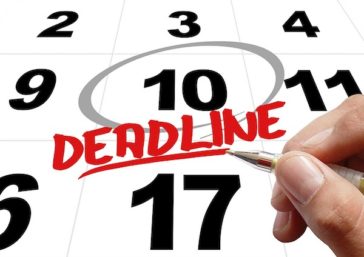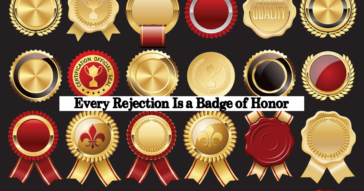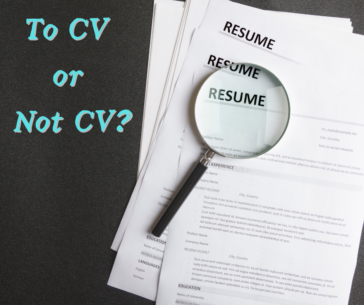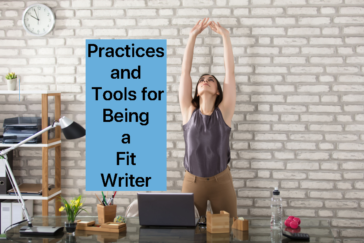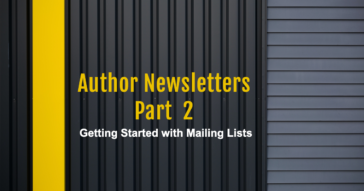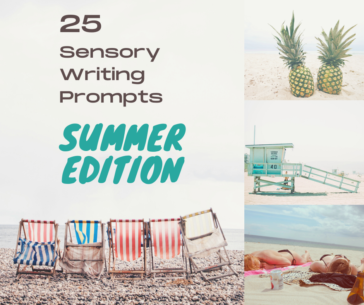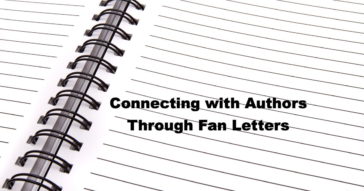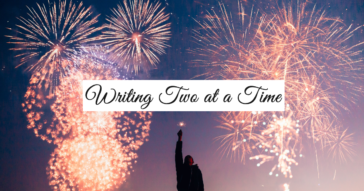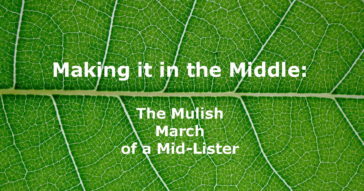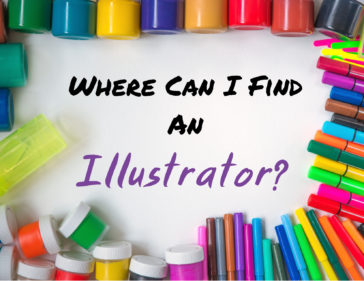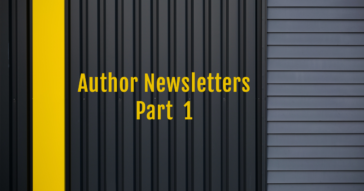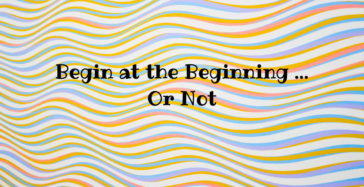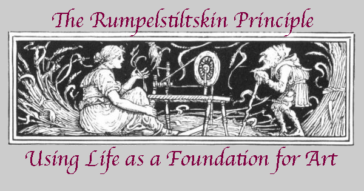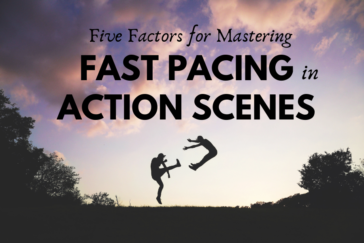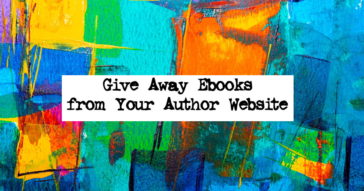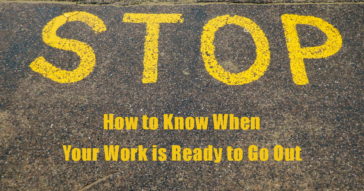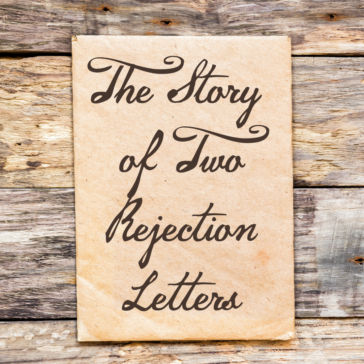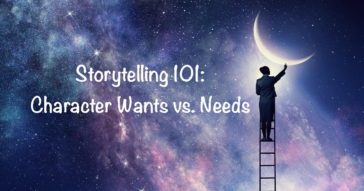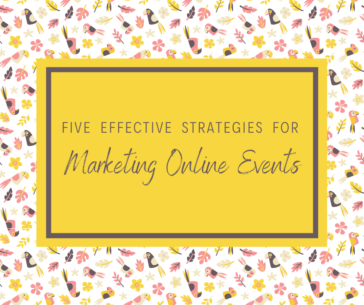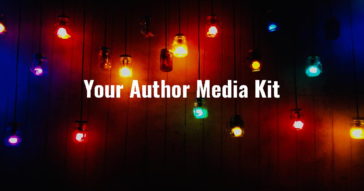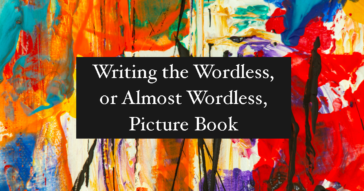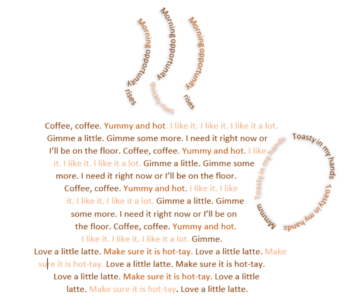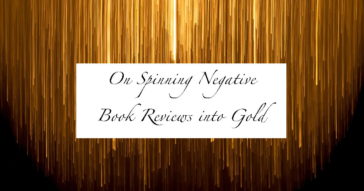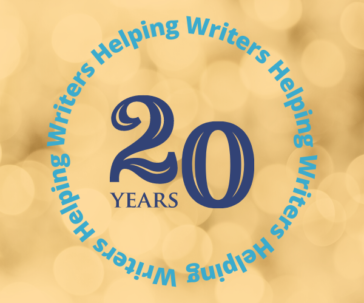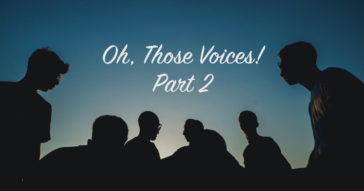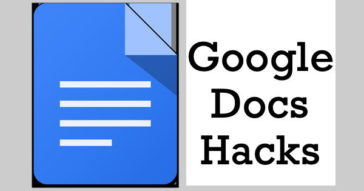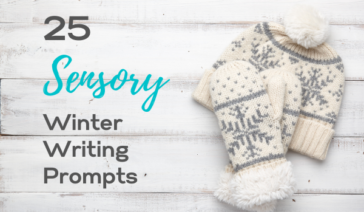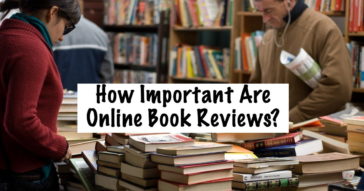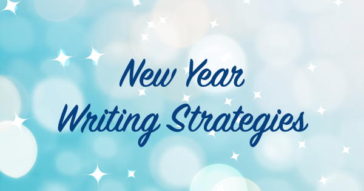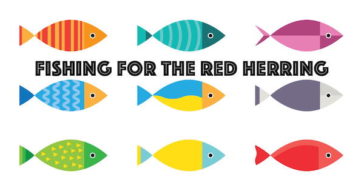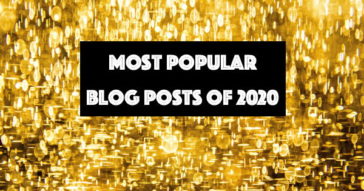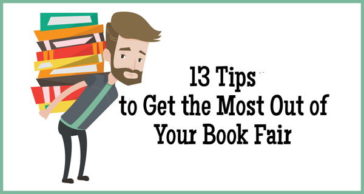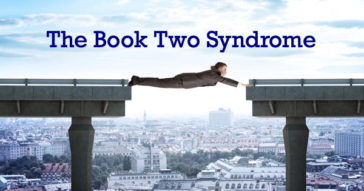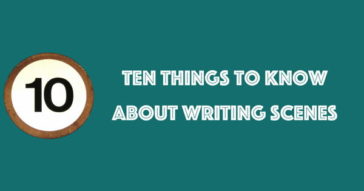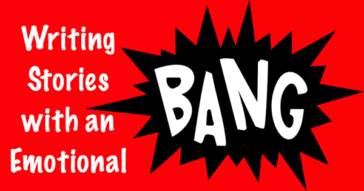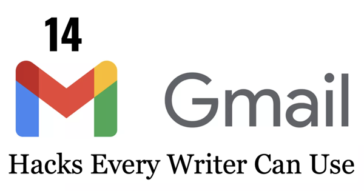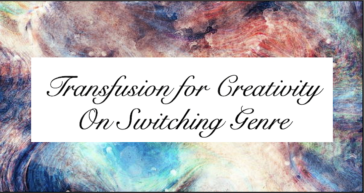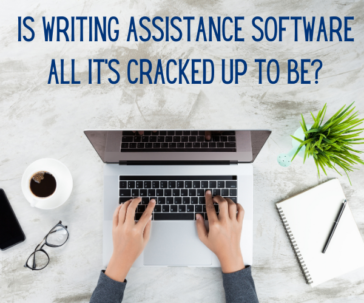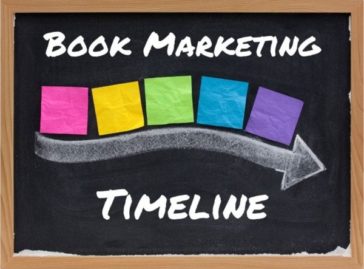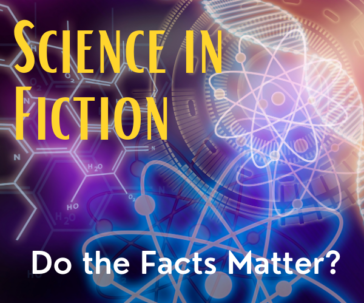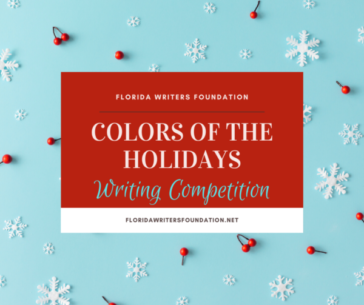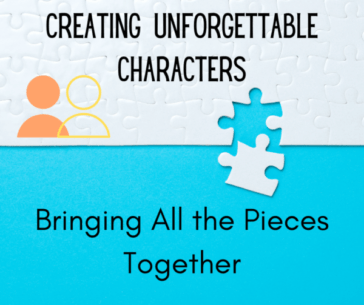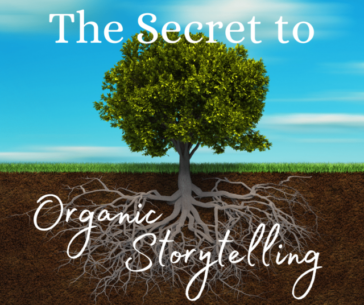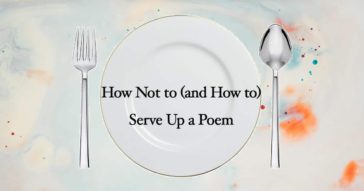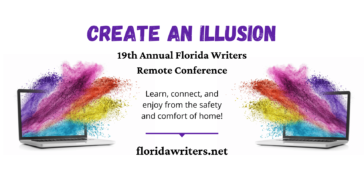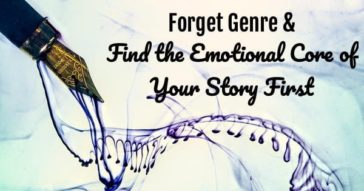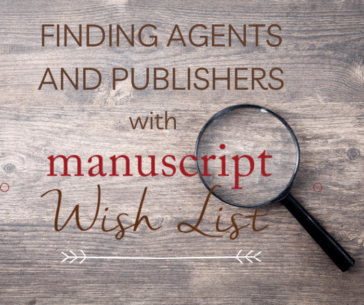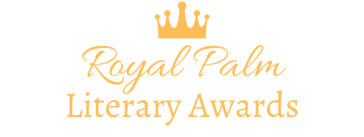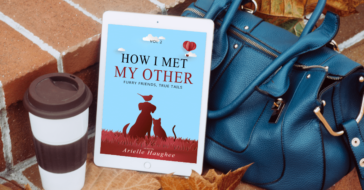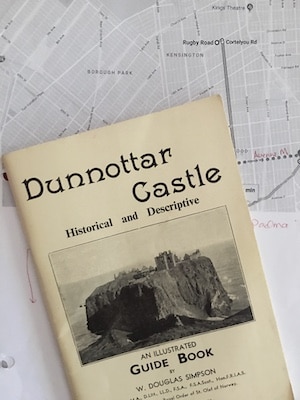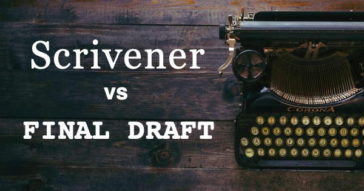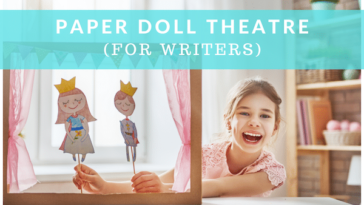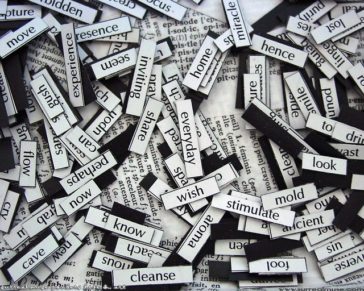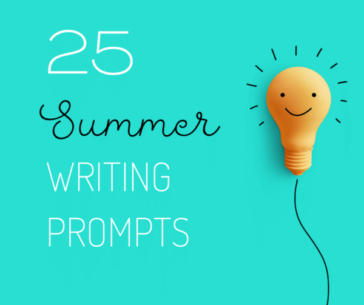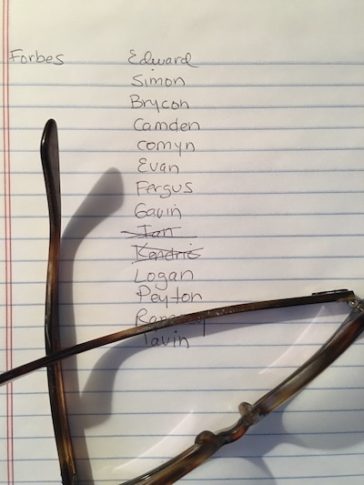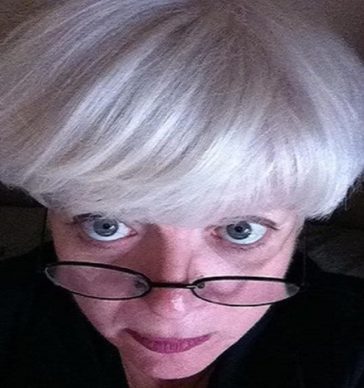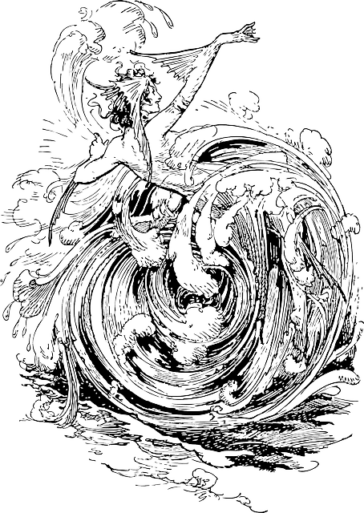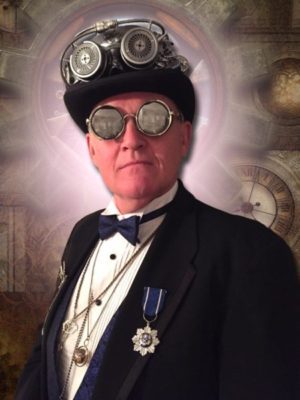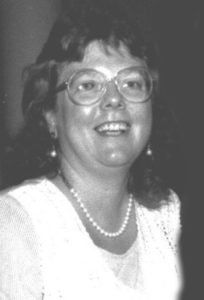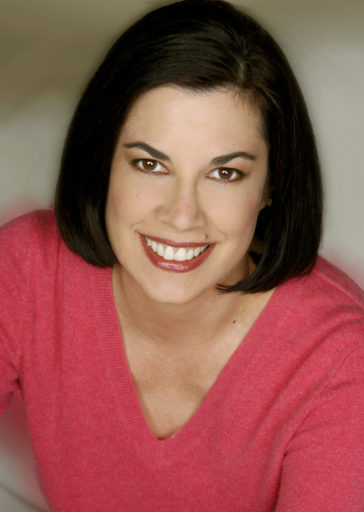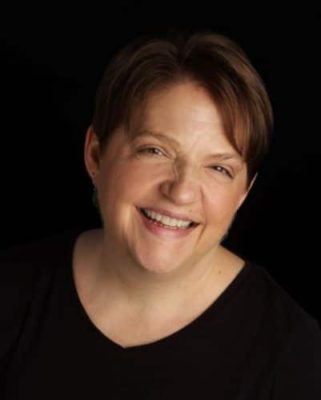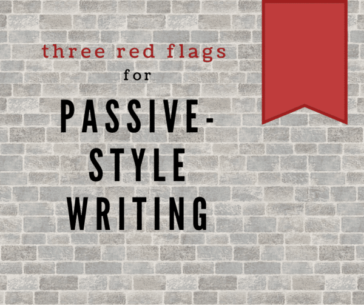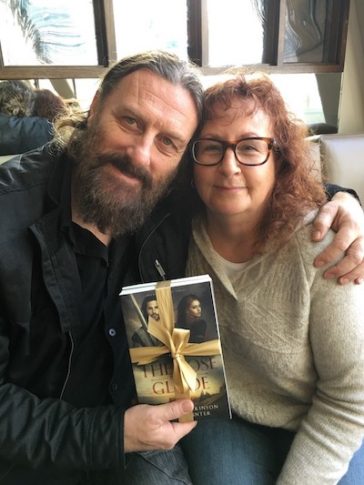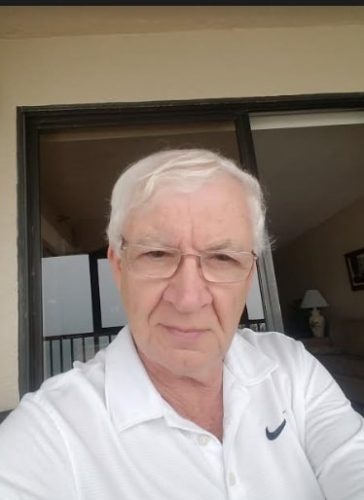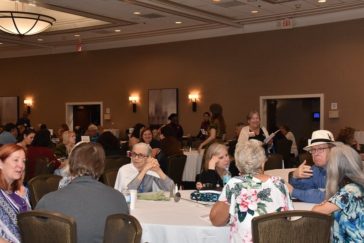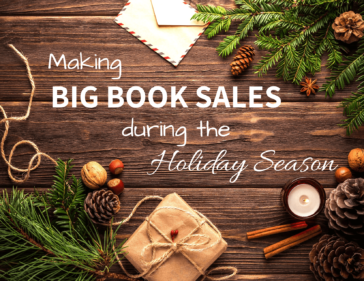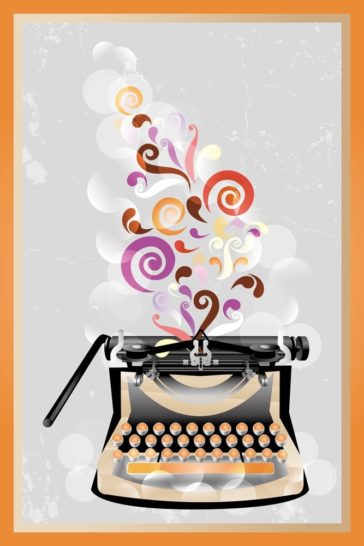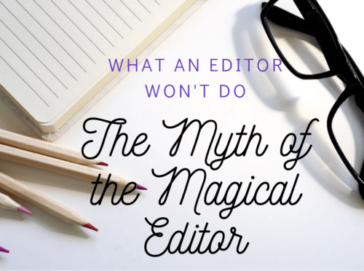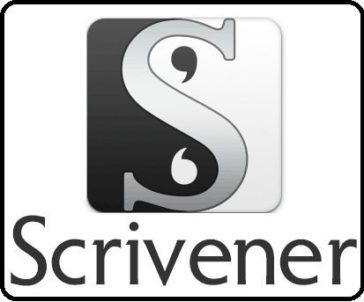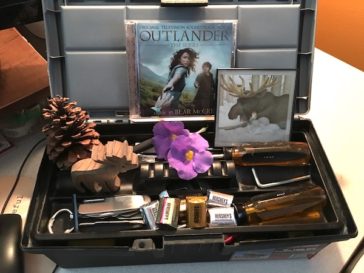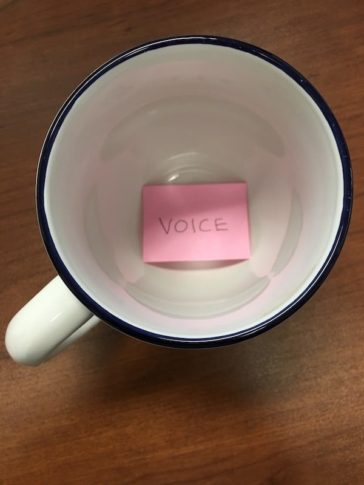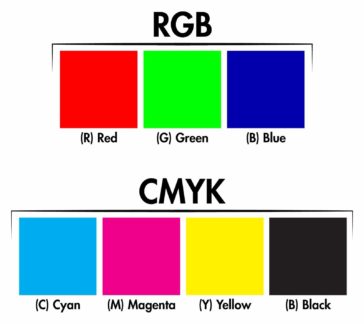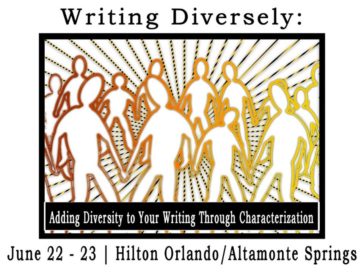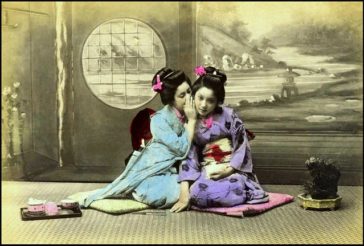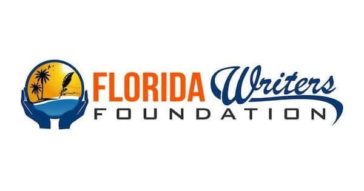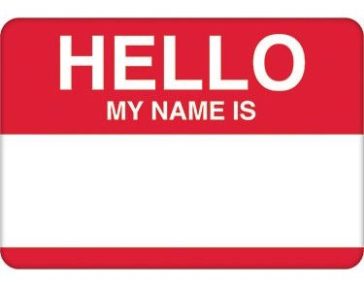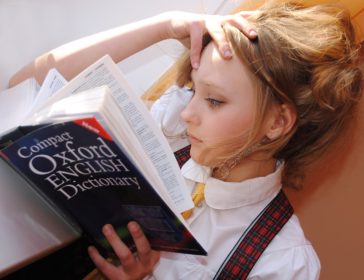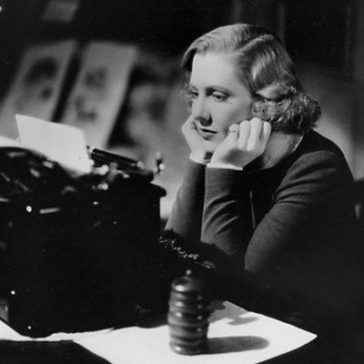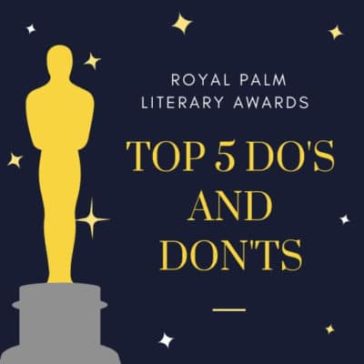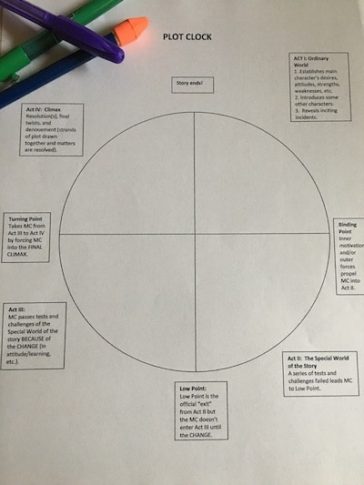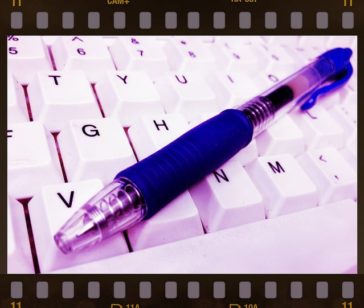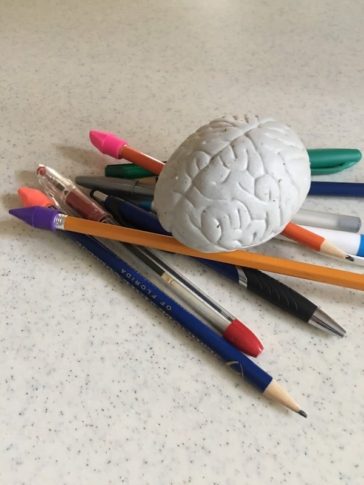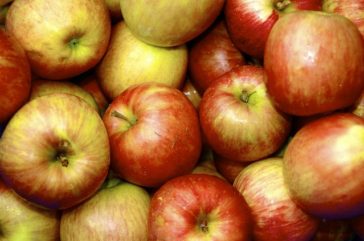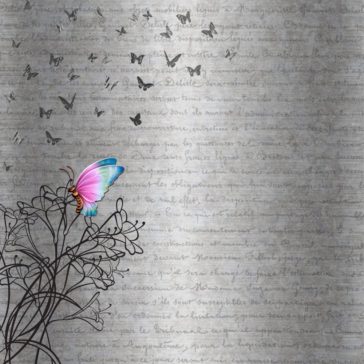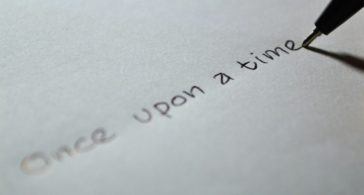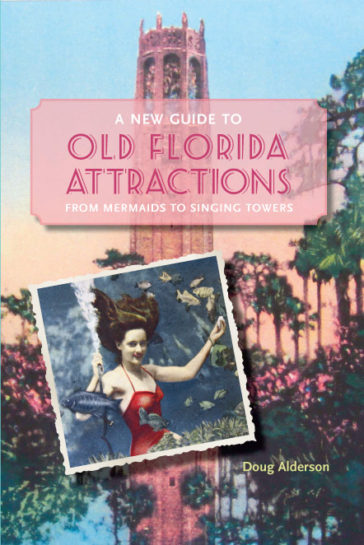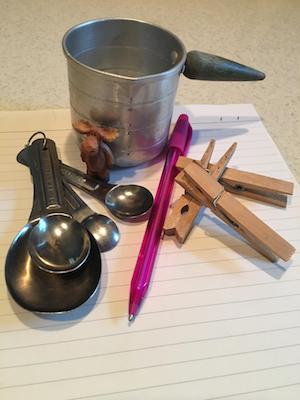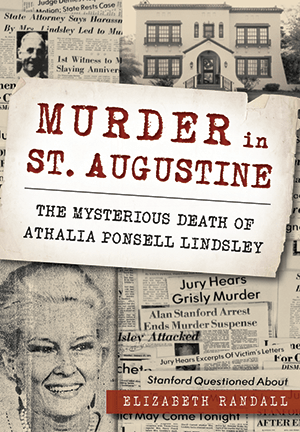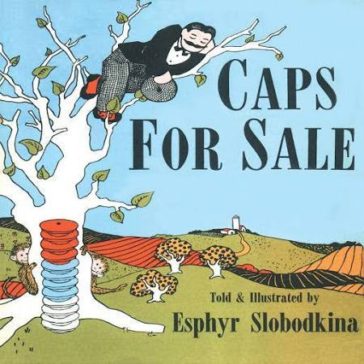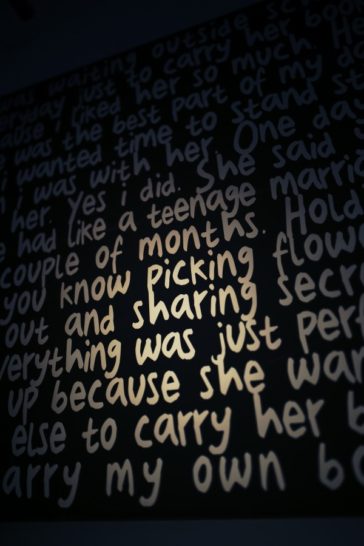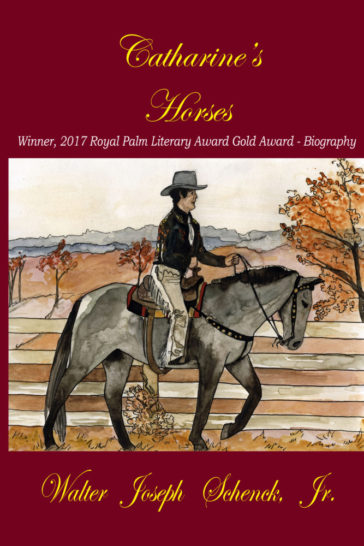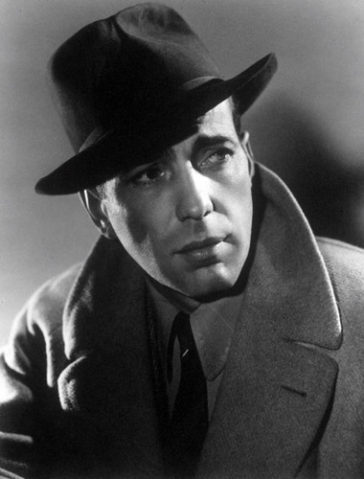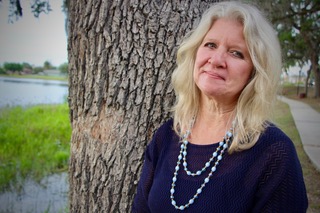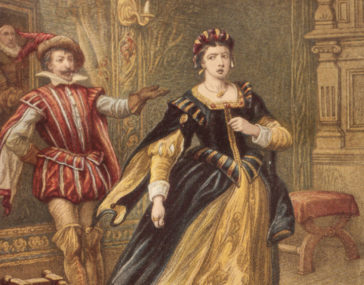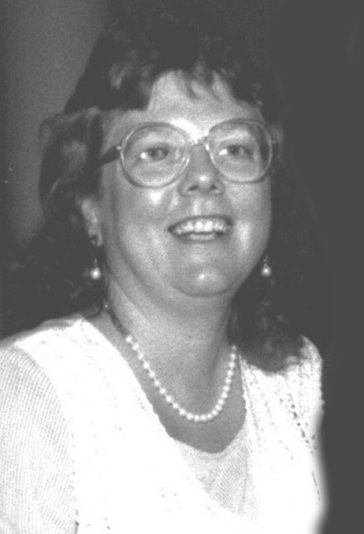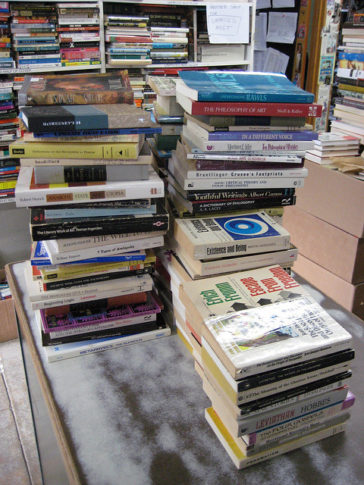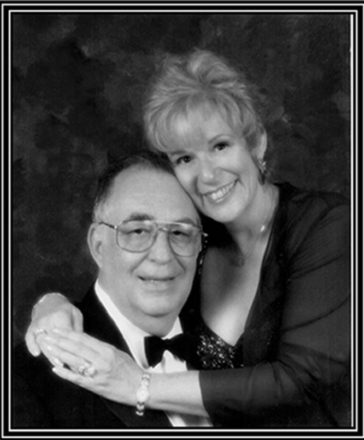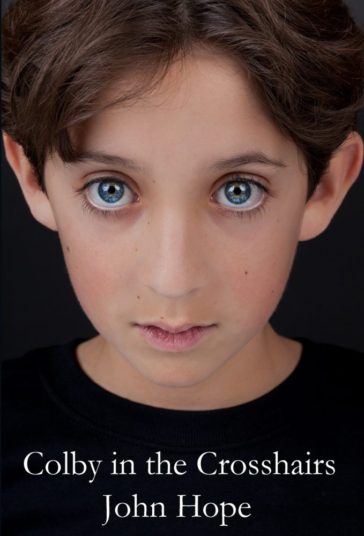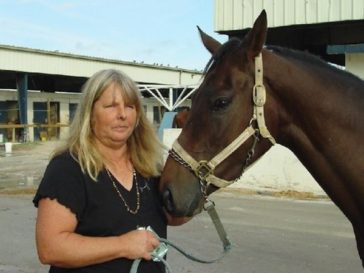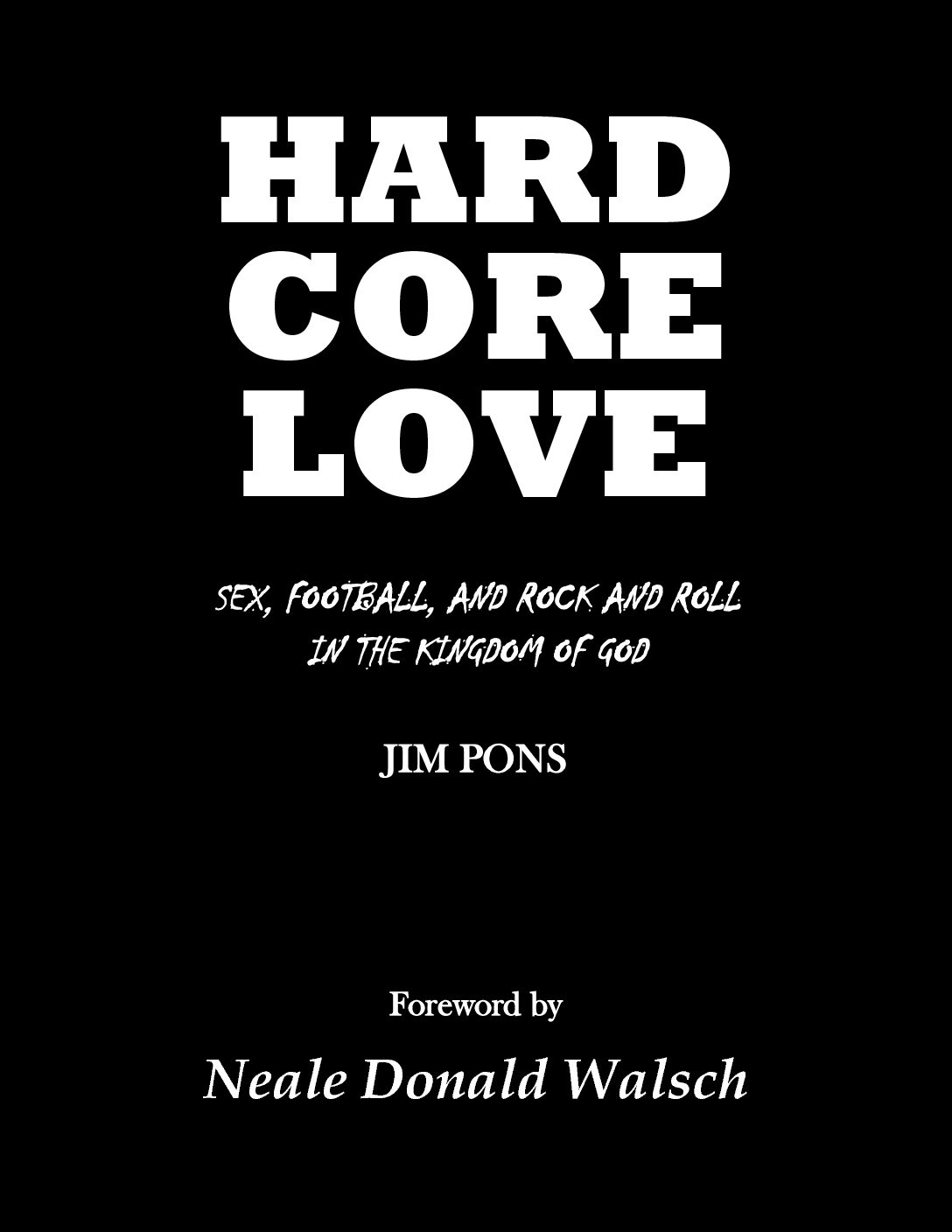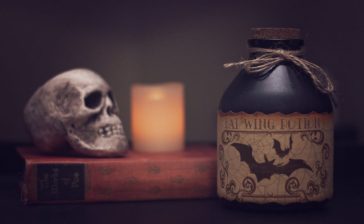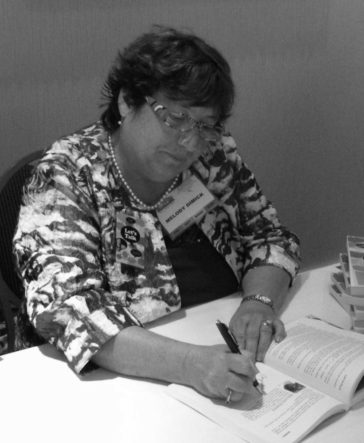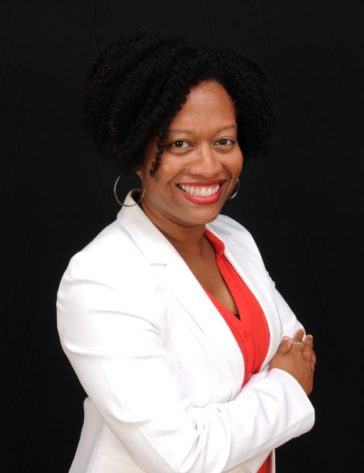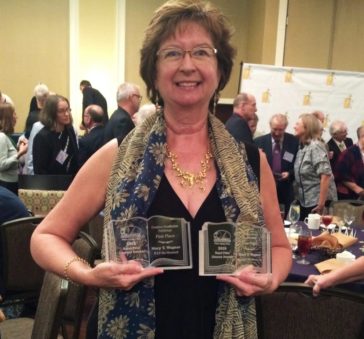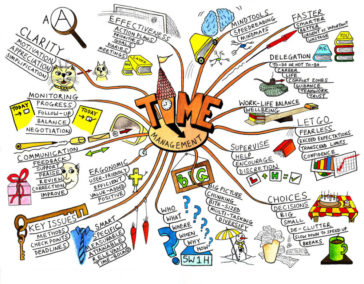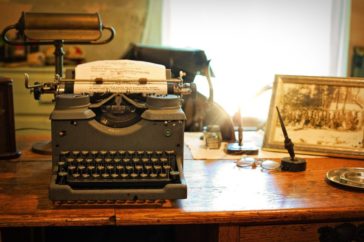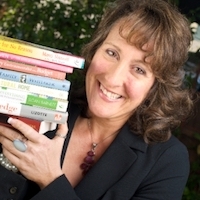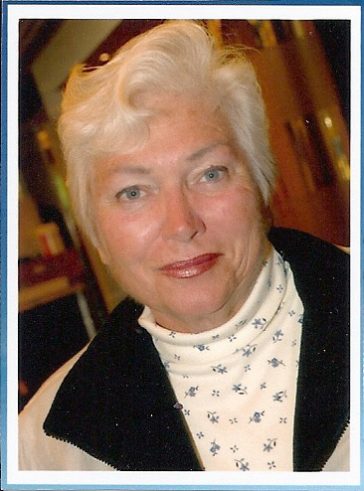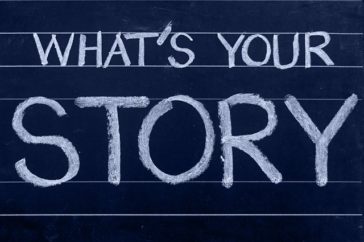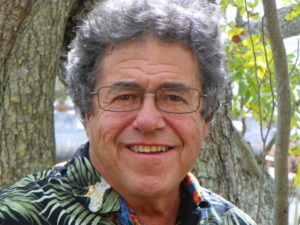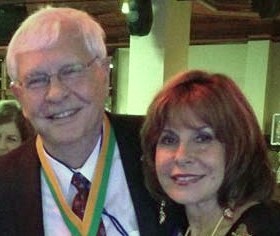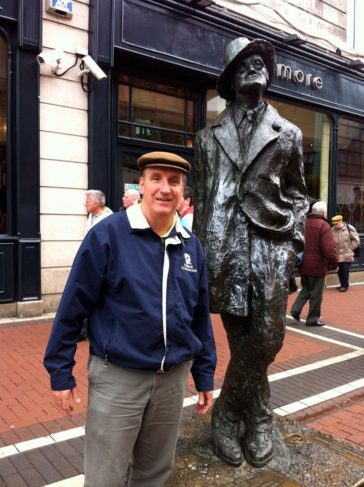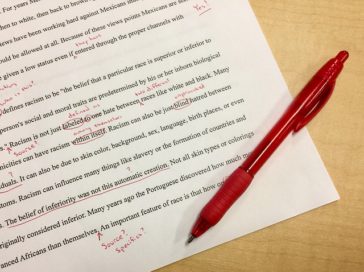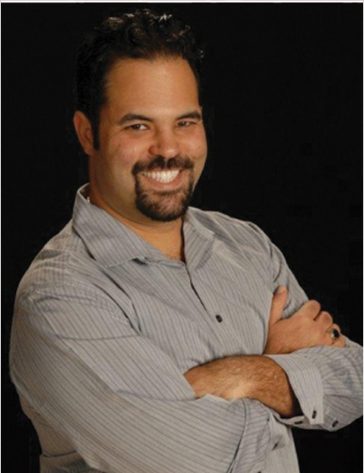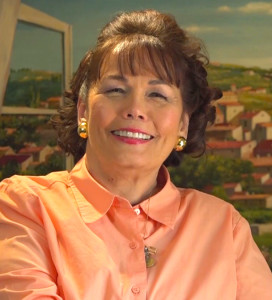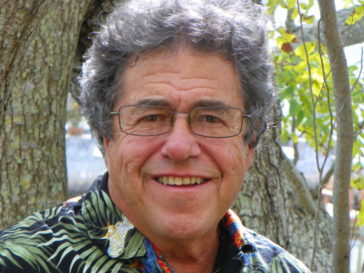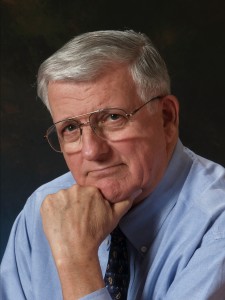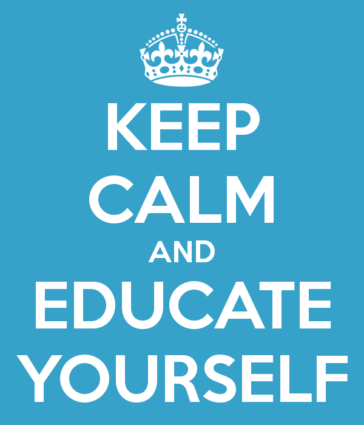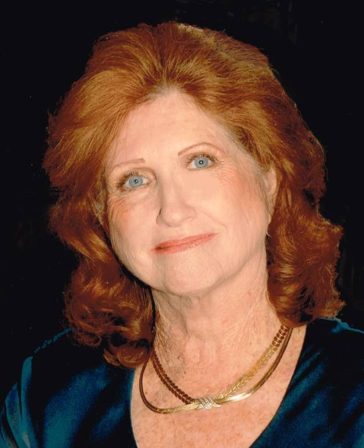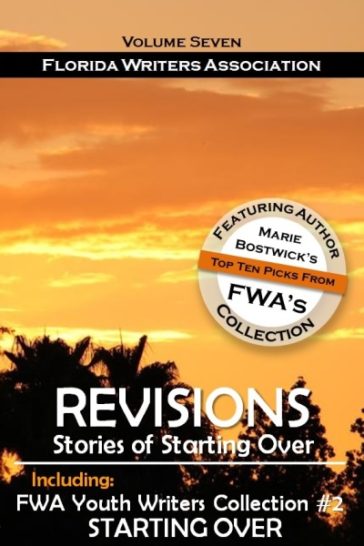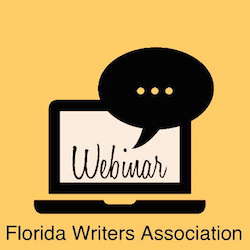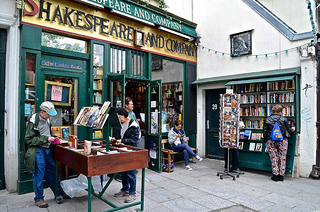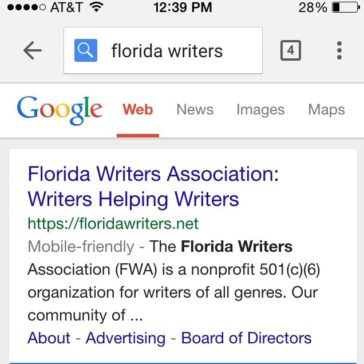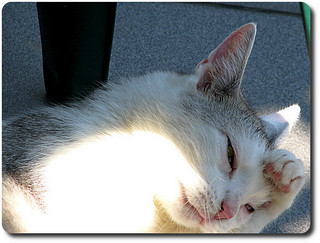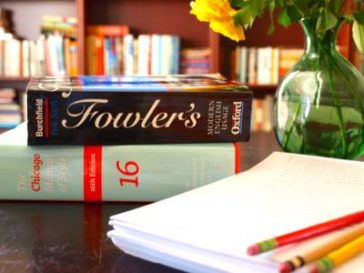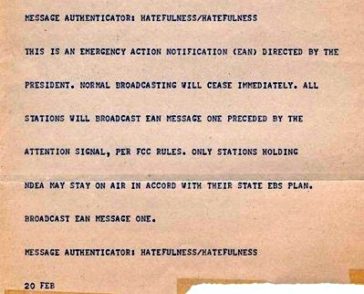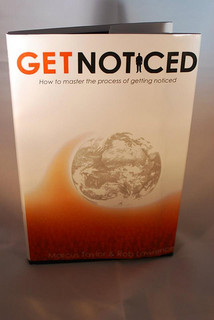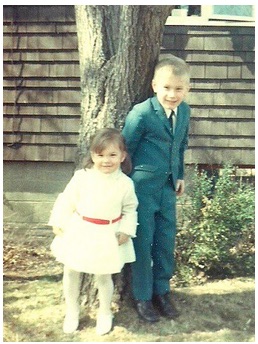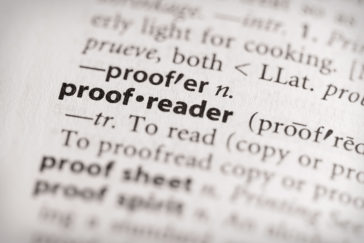Art Imitating Life
Interviewers have frequently asked me, “Where do you get your ideas?” — as if there were some mysterious wellspring from which imagination bubbles that spews out a whole plotted book. We can call this inspiration. Where does it come from? In fact, in the deeper sense, that’s not an easy question to answer. I certainly don’t understand the workings of my own brain well enough to say what childhood encounter might have spawned a certain character. But since I write … Read More »
Nailing the Landing—Endings to Poems
In February and March I addressed good openings for almost any kind of writing here at the FWA blog. And in April we meandered in the middle of poems. So now, let’s talk about how to nail the perfect ending to a poem. (I apologize in advance if this turns out to be a bit of a rant. Bad endings to good poems drive me crazy!) Perhaps the most egregious crime of bad poetry is when the poet tries to … Read More »
Parsimony of Language
As my friends (and probably my readers) can tell you, I’m no enemy to baroque language. I do love me some rich descriptions! But that’s not the same as wasting words, throwing them away on redundancies. While not everybody needs to write like Ernest Hemingway, a certain frugality with those precious little words keeps the writing clean and comprehensible. Let’s consider a few examples. Stating the Obvious Take the adverb aloud. It’s useful to indicate that something is not silent. … Read More »
Meandering in the Middle of a Poem—What to Do?
In February and March I addressed good openings for almost any kind of writing here at the FWA blog. Now, we come to the more difficult bit for most of us. Once you’ve invited your readers in, what are you going to serve them? Stale crackers and old cheese are just not going to cut it. I’ve done a bit of research on this, as well as a lot of thinking. (When I can unfreeze the little gray cells this … Read More »
Writing Our Furry Friends
I recently decided to stop being so anthropocentric and incorporate a dog into the cast of my protagonists. This took a bit of courage, because a) animal characters can be cutesy and maudlin, and b) all the animals in books I read as a kid got killed in the course of the story, and I can’t take any more, OK? But, used correctly, the animal character can be just as powerful a presence as a human. If the temptation to … Read More »
Four Ways to Invite Your Reader In (Part 2)
Last month I posted about four ways to roll out the welcome mat for our readers by providing easily accessible openings. And I said, if the opening is too longwinded then readers may not have time to figure out your point, or the why of the piece. Too obscure and immediately readers must decide if it’s going to be worth their precious time to figure things out. Too overused, trite, or tiresome and readers may think there are better things … Read More »
Listening for Characters’ Distinctive Voices
Here are some thoughts mainly (but not exclusively) meant for those who write in a close third-person or first-person point of view. We’ve all internalized the advice to stay in a consistent point of view. You know—not to see things Mr. POV can’t see (like his own face) nor to read other people’s minds. But there’s a different sense in which a writer has to think about voice, and not just in dialogue. Because each personage in a book, like … Read More »
Four Ways to Invite Your Reader In (Part 1)
It’s the opening of a new year. So, let’s talk about openings. You want your home to have curb appeal and your front door to be inviting—to say Welcome! as it opens. (At least most of us do.) It’s the same with a piece of writing. The last thing you want to do is to put a roadblock, or an overstuffed couch, in the way. Openings are tricky—help your reader Poet Billy Collins says, “Usually I try to create a … Read More »
Don’t Make Genre Writing Generic
A long time ago, I wrote about this topic, but now that I find myself writing cozy mysteries, I think I need to reflect on it again. Genre books should be good. Should even flirt with being “literary.” Because, let’s face it, there’s no excuse for writing bad books, no matter what kind. Laws That Never Shall Be Broken The informal definition of a genre book—whether romance, cozy, police procedural, or thriller—is that it follows certain closely constraining rules. And … Read More »
How Judging a Writing Contest Can Help Your Writing
I’ve been a judge for a number of different writing contests for young writers and for adults. I’ve even been the prize in a mentorship contest. As a judge, however, each competition is different in what it will ask of you personally—how much time, thought, and perhaps even research you will have to put into it. Some contests are less organized than others. Some are very well organized, such as the Royal Palm Literary Awards (RPLA). Some require in-person, or … Read More »
Writing Powerful Moments
Sitting here in front of the fire (no, I’m not in Florida!) makes me think of fire-like concepts. Like intensity, burning fiercely. Emotional intensity that leaves you physically limp. Intense suspense, so gripping you can’t put the book down. Hilarity that has you holding your sides while tears roll down your cheeks. These are the virtuous extremes that make a book unforgettable, unputdownable. They melt us onto them like a hot pan set down on a plastic lid. Now, it … Read More »
The Writing Trash Heap
It’s bound to happen. The story you were so eager to write is going nowhere. Or it’s going in too many directions. It doesn’t make sense anymore and bears no resemblance whatsoever to that exciting, glittering tale your mind conjured up. What’s your next move? Tempting as it may be, DO NOT hit the delete button and relegate your writing to the cyber cemetery for all eternity! There are less drastic steps that will eliminate any regret down the road. … Read More »
Last Minute Gifts for Writers: 2024
It’s that time of year again, and if you’re like me you’re a last-minute shopper. Either that, or someone in your immediate gift-giving circle is desperately pleading with you for gift ideas. Do them a favor—print out this list and others from past holiday seasons on the FWA blog. Put your concerned gift-givers out of their misery. A short list of some favorites Duotrope At the top of my list is a gift subscription to Duotrope. This software indexes over … Read More »
After the Writing: Cover Thoughts
Book covers are a tricky business. All of the wonderfulness of your story needs to be reflected in an attention-grabbing cover that will make readers want to choose your book. Now that your story has been written, lets explore some cover thoughts and ideas. Genre It’s important to convey the genre of your book to give potential readers an idea of what your book is about. Established design styles will serve as a guide, but here are a few examples: … Read More »
They’re Not What You Think: A Good Character/Bad Character Surprise
I’ve reflected before on the power of surprise in novels. But I’d like to share a few thoughts now about a certain kind of surprise—perhaps the most heart-wrenching kind, because it’s so relatable. That is, the “good” character who turns out to be bad, or the “bad” one who finally shows himself to be good(ish). The Good Are Bad It’s true, of course, that no human being is fully good or bad, and our fictional personages should reflect that. But … Read More »
Getting Started: Even with a Not-so-great Idea
I’ve been thinking about how one generates ideas for poems, stories, novels—or anything for that matter, like engineered new-fangled whatnots, or works of visual or auditory art. I suspect some of you are like me, wasting time thinking you don’t have an idea. And so, you don’t write or make other kinds of art. Last year I attended a program by Florida professor and poet David Kirby (FSU) hosted by the Florida State Poetry Association. During that session he talked … Read More »
In Praise of a Rich Verbal Vocabulary
You don’t have to have read too many books to realize that breadth of vocabulary is a great attribute for a writer. It goes back to Flaubert’s idea of the mot juste—using just the right word. The mot juste We tend to think of adjectives here because they’re descriptors. To describe the house precisely, we need the right adjectives, correct? A cozy little house. An impressive house. A dirty, sagging house. But adjectives are only one of many parts of … Read More »
Writing That Dedication Page
The time has finally come to write the dedication page to the story you’ve sweat blood and tears over. Should be easy enough, right? Sometimes it seems that these little blurbs are harder to write than the book itself. Let’s toss around some ideas to help you get this important part of your book written. Who? Who should you dedicate your book to? Well, there are many answers, and they can be a lot of creative fun. You can dedicate … Read More »
Poetry Short Form: The Rowdy Chastushka
Sit your chastushka down and raise the vodka in salute. Does that sound a little naughty? Well, it might. The chastushka is a short funny, ironic, or naughty Russian verse form, often on the same intellectual level as the limerick. If you’re quick on the draw and love working with silly rhymes, or satirical themes, the chastushka is for you. It can be a lot of fun. It’s a folk style that’s engendered many a rowdy competition—or friendly one. The … Read More »
The Question I Missed
When I was in high school, I missed a lot of questions on a lot of tests. But there’s one question I’ll never forget. It was pretty simple. The image displayed a slice of the earth’s interior, with a question: What is the name of the stuff in the middle? I thought of two answers. One was “the core of the earth,” because that IS the middle (and was the correct answer). But I tried to outsmart the question, and … Read More »
Filling Your Characters with Emotion
One usually approaches this topic as “filling scenes with emotion” although, if you think about it, it’s people who experience emotion. If your characters are feeling it, then they’ll embue the whole scene with it. And, because of the wonderful faculty of compassion, readers will start to twang with the same emotional resonance. Where do you stand? The exact way we, the authors, will go about this depends on what point of view we’ve chosen. Is it omniscient third person? … Read More »
Too Wrapped Up in Writing?
Writers are dedicated, committed, sometimes obsessed individuals. Their creativity seldom gives them a moment’s peace. Some writers work on multiple projects simultaneously, which amps up the pressure to create even more and leaves little, if any, time to just chill a little. So, how does a writer take a break without feeling like they’ve abandoned their work, impatient characters, and unresolved plot? Even if writers can’t completely disconnect, let’s explore some temporary solutions. A Related Break Set your work aside … Read More »
Deepening Character with Gesture
As humans we read signals all the time. If someone flips us the finger, we know that person is angry. If someone throws their arms wide and does a little dance, we know that the person is happy about something. We communicate every day without words. Gestures reveal so much about a character, and about a situation. Reveal is the important term here—reveal/show. It speaks to that old writing adage “show, don’t tell.” When we see certain gestures by characters … Read More »
Crafting a Sell Sheet: A Quick, Easy Guide
Sell sheets, also known as one sheets, are often requested by booksellers, award competitions, reviewers, and other industry folks. They are useful tools for people to get quick information about your book and make decisions, such as whether or not to stock your book in their store. It’s important to have all the standard elements on your sell sheet and to make sure they are organized in a structured way. So what exactly do you need to have on a … Read More »
The Charm Factor
I just read a charming book, and I’d like to be able to write one. But what exactly is charm? The word comes (from Latin by way of Middle French) from carmen, an incantation, and even today it can mean an enchantment, a magic spell. Yet we often also use it in a different, more secular sense to mean —I quote the Oxford Dictionary here — “the power or quality of delighting, attracting, or fascinating others.” Although, with all due … Read More »
Naming Your Story Characters
When it’s time to name the characters in your story, where do you start? If you’re lucky, one or more may have already told you who they are. What about the rest? Some may be secondary characters or ones that are mentioned only once or twice, but they still need names so readers can picture them in their mind and identify with them. Let’s see what we can do about those blank spaces on your character roster. Personality Traits Take … Read More »
Cut Unnecessary Prepositions and Prepositional Phrases
We all want to write elegantly. That calls for tightening lines. One way to rid excess verbiage is to cut all unnecessary prepositions and prepositional phrases. I say unnecessary because, as writers, we are also concerned about how a line sings. Sometimes prepositional phrases are needed to keep a meter, portray the voice of a persona, or enhance the lilt of the line. Barring that, here are some ways to cut unnecessary prepositions and prepositional phrases. 6 Ways to rework … Read More »
I Dream of a Book: Should a Novel Ever Begin with a Dream?
This is one of those questions that readers and writers have very different opinions about. Those who teach writing are pretty united in saying that it’s a bad idea to start a book with a dream. “But it seems so clever,” you say. “There’s that zingy moment when the character wakes up and the reader realizes that none of what she’s learned so far really happened.” Set Up for a Let Down Well, yes. But there’s also a certain element … Read More »
Writing that Book Blurb
At some point in the life of your story, you’re going to have to write a book blurb. Some writers are convinced that this short description is more challenging than writing an entire novel. How does one condense an 80,000 word story into a 150-250 word teaser? Well, it’s not impossible, and it’s important to try and get it as right as you can—for a number of reasons. Back Cover Showcase Your book blurb is an important attention-getter on the … Read More »
Poetry Short Forms: The Pensee
In my FWA posting for last month we dove into the tetractys, a poetry short form from Greece. This month let’s look closely at the pensee. The pensee (pronounced pahn-say) is a short syllabic form with specific attributes. But before we get into those let’s backtrack a little. The word pensee means a thought, or reflection, in French. When we speak of a pensee we are referring to a thought expressed in a literary way, such as the short form … Read More »
Writers: Need a Break?
Writers are pretty much a solitary, dedicated lot, listening to their characters and investing countless hours telling their story. Amidst that fierce determination is the stark realization that writers cannot work non-stop—it may even prove to be counter-productive. So, when is the best time to take a break, and should those breaks be totally unrelated to the craft of writing? Let’s explore some ideas about taking breaks and how they can help a writer become even more productive when they … Read More »
Setting: A Living Sense of Place
One of the things I love best as a reader is those books that create such a colorful sense of place that the setting becomes another character—so much so that a change in scene would change the feel of the book altogether. What would Inspector Brunetti be without Venice, right? Its geography shapes the action; its history shapes the people. Anyone who has ever visted that amazing city of water can immediately picture the ambulance taking off down the canal … Read More »
Poetry Short Forms: The Tetractys
Go on … think of a poetry short form you know. Probably, the first one that comes to mind is the haiku, or maybe, the limerick. I bet that’s what would come to mind for most folks. Or, if you’re familiar with Japanese forms you might also think of the tanka, or haibun. For many American writers that’s about the extent of our short form poetry knowledge. But there’s a vast world of short forms from almost every continent. (Probably, … Read More »
Where Does Your Story Begin?
I read a lot of book manuscripts, and I’m here to tell you there are some story openers in danger of being used more often than “once upon a time.” Here are some beginnings I see quite frequently: • Character waking up • Character looking out a window and thinking about the weather • Character thinking about the setting, reviewing the objects in a room • Character thinking or saying out loud, “This isn’t happening.” • Character pondering her life, … Read More »
To Repeat or Not to Repeat: How Much Regrounding in a Series?
These thoughts are aimed at those who are writing a series, as I have been. It’s begun to feel like I’m writing the same book over and over! Why? Because the characters and their sitz im leben need to be reintroduced each time, in case (a very likely case) someone picks up Book Three without having read Books One or Two. Just how much grounding in the continuum of the series is necessary for each episode? That depends on the … Read More »
Is Your Story Drowning in Details?
Every story needs details—it’s what helps bring it to life for the reader. Details set stories apart from one another and enable the writer to introduce seemingly insignificant nuggets that may play a major role as the story progresses. The challenge for the writer is to find the acceptable ratio of details to plot without drowning the reader in details. Let’s examine a few pitfalls and see what we can learn from them. Example: A historical fiction novel features a … Read More »
Literary Devices to Compare and Contrast
Writers create images with words, and the techniques used are called literary devices. Because of the wide variety of literary devices, we will examine them in groups. In this article, we review the literary devices used to compare and contrast. By comparing and contrasting things, the author invites the reader to see a deeper truth. Use these devices to emphasize an idea, a character, or important moment in the story. Analogy An analogy clarifies by comparison. Unlike simile and metaphor, … Read More »
Double Trouble, or Making the Same Point Twice
New York may be the city so nice they named it twice, but when it comes to novels, most readers want a point well made once and not battered home in multiple forms. There are several ways this can happen. One is by showing and telling the same fact. Here’s what I mean: She was steaming with frustration. “Why can’t you ever be on time?” she cried. Nothing is really incorrect about this, but it could be tighter. Her words … Read More »
When Writers Get Stuck
Writers, whether plotters or pantsers, inevitably get stuck somewhere along the way in the creation of their story and struggle to find a way forward. It’s a situation I’m familiar with, and it brought to mind a Robert Burns quote: “The best-laid plans of mice and men often go awry.” So, what’s a writer to do other than stare at the screen like a zombie for hours on end or throw their hands in the air and walk away in … Read More »
Creating Catchy Titles
Titles are so important. After noticing the cover and spine art, what’s the next thing a reader looks at? Maybe the author’s name, but certainly, the title. It’s got to catch the eye of the beholder. Which would you rather read: Eats, Shoots and Leaves by Lynne Truss or When to Use the Oxford Comma? Com’on, unless you’re a total punctuation nerd, you’ll head toward Eats, Shoots and Leaves. It’s a grabber. We don’t know if someone is shooting a … Read More »
Writing Workshop Descriptions: You Gotta Sell It!
You have a great idea for a workshop and there is a conference coming up. Time to fill out the faculty application. How can you give yourself the best chance of being selected as a presenter? Write a stellar workshop description! Many times writers view the description as a little nonfiction blurb stating the basics of what they will be sharing with the group. Incorrect. You are selling your workshop, and not just to the person selecting faculty, but to … Read More »
He Said She Said—Some Thoughts on Dialogue
Silence. Try to picture it: a novel with no dialogue. That would seem cold and distant indeed. Dialogue is showing, not telling what the characters think. It gives us their own tricks of speech, carries the weight of their emotions, lets us literally hear their own voices. Well done, it adds to the force and immediacy of the story. But if we neglect it, dialogue can drag down the pace, unravel the characterizations, even take readers out of the fictional … Read More »
Lasagna and Writing with the Five Senses
Successful stories take readers by the hand and invite them into the multi-sensory world the writer has created. Integrating as many senses as possible is critical to helping readers invest in the story and what is happening from one sentence/scene/chapter to the next. However, it requires a delicate touch to avoid bombarding the plot with in your face, obvious attempts at integrating the fabulous five: sight, smell, taste, hearing, and touch. Let’s whip up a batch of lasagna and see … Read More »
Kicking Your Picture Book Up a Notch (Without Adding Length)
Picture books are jewels in the world of literature; artistic, fun, informative, and full of heart-shine. One important aspect is that they are short. Many publishers insist on less than 500 words. Yet they must have characterization, plot, setting, theme, and mood—all the same things a 90,000-word novel has. The other thing they must do is grab and retain the interest of young minds. Those minds are racing at phenomenal speed. It’s a tricky business to get that young reader … Read More »
Here’s to Them Who Have Gone Before! Using Antecedents
Before you think I’m starting the New Year with a toast to the soldiers of many an ancient war, let’s reflect for a minute on our antecedents. Grammatical antecedents, that is. You know: the identifying name or noun to which a pronoun refers. John petted his dog. Whose dog? John’s, but fortunately you don’t have to say John petted John’s dog, because the proximity and word order tells you that his is a reference to John. Simple and straightforward. No … Read More »
How to Use Color in Your Writing
The world you create for your characters is bound to be full of color—it’s everywhere you and your character(s) look. Sight is a powerful sense, so you want to make the most of it. As a writer, the tendency might lean toward using your favorite color, simply naming what your character sees (the green tree), and move on with the rest of the story’s narrative. Hang on! Don’t let the power of color fade away into thin air! Let’s explore … Read More »
Unload Those Adjectives!
Stephen King wrote in his book On Writing: A Memoir of the Craft, “the road to hell is paved with adverbs.” We’re rightly admonished not to use adverbs. But what about adjectives? I’d argue that adjectives are also there in the mix that makes up the road to hell. In fact, Mark Twain wrote to student D. W. Bowser (3/20/1880) “When you catch an adjective, kill it. No, I don’t mean utterly, but kill most of them—then the rest will … Read More »
On Not Using Filtering Language
Nobody likes to peer through a glass darkly—it’s too hard to see. Why not just look directly at the scene rather than at its reflection, which is pale and distorted? (Unless you’re looking at an eclipse, of course.) Filter Not It’s just as hard to get the full impact of an emotional scene in a novel if the author dims everything through a series of filter words. You know what I mean: felt, seemed, heard, saw, and their kin. Needless … Read More »
Starting a Series?
You’ve decided. Your fiction story will become a series. The decision could have been made when you realized your characters have more to say than one book can hold, or you may have decided at the outset that a series is the best way forward. Either way, here are a few hints and suggestions to help make that series a successful one. Timeline Structuring It’s logical to think that books in a series continue where the last one left off, … Read More »
A Half-dozen Power Prompts to Wind up the Year (Or to start 2024)
In March of this year I wrote a posting for FWA titled: A Friday Folly: Get Prompted! Since then, my group and I have had many months of writing to fun, and sometimes difficult prompts. These are prompts that are all directed toward some aspect of the craft. To wind up the year I thought I’d share with you a half-dozen that worked well. Why not try some of these yourself, or within your writing group? 1. Working with numbers … Read More »
Sometimes Writing Is Hard
Sometimes writing is easy, when you feel deeply impassioned about a subject and know just how to say it. The words flow. I think it was Truman Capote who said something like: “I’ve always been able to throw words up in the air and have them come down in the right order.” Sometimes we can do that, too. When you’ve emptied the passion bucket, maybe all you have to do is tweak a sentence or two, choose a better word … Read More »
Don’t Be a Bore!
In reading novels as in attending parties, nobody wants to sit next to a bore. It’s easy to say what constitutes a social bore: she hogs the conversation, talks about herself, burrows into a one narrow topic that doesn’t interest you. What marks out a boring book? I had a recent opportunity to think about this when a friend asked me to read his manuscript and give him some feedback. The overarching problem that jumped out at me seemed worth … Read More »
TOC – Yes, or No?
It may feel like an afterthought or process a writer goes through when the writing is done, but whether or not to include a table of contents (TOC) warrants careful thought and special attention. The discussion that follows is based on my own (unofficial) research and inspection of various titles in my own small library. What is a TOC anyway? Basically, it’s a list of chapters and page numbers at the beginning of a book. As a writer, it’s important … Read More »
Surviving the Long Haul—Writing for Life
A friend of mine recently sent me a compiled list of writing tip lists. It’s here. (Do check it out, there’re some really good ones.) That got me thinking. I’ve been in this game for a long time—traditionally published for about forty-eight years with over 160 poems in print and 20 books out. And, of course, I’ve been writing for much longer than that. Which means that I, too, have a handy list that might supply the fuel for some … Read More »
What Pain Has to Offer in Your Novel
Ouch! This isn’t the reflection of a sadomasochist! Pain occurs (or should occur) a lot in novels, and it gives the author a lot of fresh ways to show something about their characters. I say “should occur” because it’s far less prevalent in hard-driving thrillers (for example) than it should be. If you jump off bridges and throw yourself out of moving cars, my guess is you’re going to get a few ouchy booboos. If the book makes any pretense … Read More »
The Tricky Task of Book Titles
Lucky is the writer whose book title is known before the first word is written. Other books may tease a vague hint or inclination, and then there are those that refuse to cooperate. At any level. If book titles are a challenge, let’s explore some possible remedies for those defiant or reluctant to make themselves known. Reflect the Book’s Tone The title of your book confers a critical first impression for a potential reader. It should provide insight into what … Read More »
Writing with Muscular Metaphors
In July of 2021 I wrote about Stimulating Similes. Now, t’s about time we got around to talking about metaphors—the big sister/brother of similes. Metaphors have more muscle than similes, and less tact. Rather than using a qualifying word such as “like” or “as” between two comparisons, metaphors just blurt out that one thing is another. Sure, tougher sibling Metaphor can be a bit rude, but it does its job quickly and without a lot of extraneous verbiage. For example, … Read More »
Story Pacers
There’s an ebb and flow to the pace of a story. Everything in the world moves at a pace that changes now and then, so your story needs to flow with a momentum that makes logical sense based on the setting, characters, and plot of the story. Let’s explore some ideas that will help vary the stride of your story. Word Choices Words have the power to move the reader along or slow them down, based on what is happening … Read More »
Using Themes
A really good book is like plywood—many layers of story glued together to produce an end product that’s stronger than any one layer alone. You have a main plot (say, retrieving the magic stone that protects the kingdom), one or more sub-plots (the heroine’s coming of age and her sidekick’s overcoming his sense of inferiority to a brother who died a hero), and then a thematic layer (resisting the temptation to do evil for a good cause). It’s about that … Read More »
Looking for a Critique Group?
Most writers will tell you that a writer’s group, or critique group, has proved indispensable to their writing success. The fellow writers in these groups offer encouragement, inspiration, valuable feedback from close readers, answers to other questions about the writing life (such as about the business end of things), a place to get beta readers for longer works and, often, friendship. I’ve been involved with writing groups for almost five decades and I have heard only from a couple of … Read More »
Splicing Time: Handling Multiple Storylines
Time is always tricky in structuring a novel, even one with a single line of action. Maybe your two sleuths split up to investigate two leads at once. In what order do you present their interviews? Because at some point you’ll need to bring them back together, and it should be in the smoothest possible way. But even more challenging is the ordering of a book with multiple timelines—two characters’ independent stories, for example, that braid together until they unite … Read More »
To Sequel – Or Not
The story that you doubted about, shed blood, sweat, and tears over, and dedicated countless hours to is finally in the hands of eager readers. Much to your delight (and relief), they love the story and wonder what happens next! They raise questions about a character’s fate, a relationship, or what the future holds for the plot itself. They’re asking about a sequel to your story. Do you write one? If you decide to, how do you begin? Here are … Read More »
Making Metaphors with a Roll of the Dice
In a recent interview Ted Kooser (U. S. Poet laureate: 2004-2006, Pulitzer Prize winner) said “I often start with a metaphor and build the poem out with that association.” So, not until he’s found the right metaphor does he begin. This makes sense to me, for I would hazard to say that all good poetry is metaphor—poems mean something more than what the words denote. The ability of poetry to stretch itself beyond the page and into our lives with … Read More »
What Does AI Mean for Writers?
Artificial intelligence, more commonly referred to as AI, is the hot tech topic of the day. The Writers Guild of America (WGA) wants AI addressed in their contract negotiations and Congress is holding a series of AI Insight Forums to gain a better understanding of it. If you find yourself wondering what AI means to the average writer, read on. Chat GPT To gain an understanding of just what AI can do, let’s take a look at a highly popular … Read More »
Want to get more reviews on Amazon? Here’s how!
You’ve written a great book, but how do you get reviews on Amazon? The Price of Fewer Reviews As a new author, you pay a tremendous price when you don’t get Amazon reviews. Your books have lower visibility and credibility, since reviews are social proof for potential buyers. Book sales may ultimately suffer as a result. Amazon reviews offer exposure to potential readers and can testify to your book’s quality and content. Reviews are an essential marketing tool. Positive reviews … Read More »
Mind Your Own Business! or Maintaining the POV
Once upon a time, it was common for books to be written in an omniscient third-person voice. A disembodied and all-seeing narrator told you the story, gentle reader, and he knew what every character was thinking and how they looked as well. Increasingly, though, readers seem to want the in-head experience of close third-person. One character carries them around through the action of the novel, and they see the world and other characters though her eyes. She can report her … Read More »
Help! I’ve Lost Control of My Story!
Have you lost control of your story? Has it decided the path you charted (by plotting, pantsing, or whatever) is not the way things are going to go? Is it a rebellion of sorts? A mutiny? Before you hoist the white flag of surrender, there are strategies to consider that can bring things back into balance and help you regain the upper hand. Plot In the Ditch? The story that was set to begin with a cruise to the Bahamas … Read More »
Writing for a Difficult Audience—Young Readers
A major challenge that writers for young readers face is having one’s work taken seriously. And I don’t mean just the response to the published book/piece, but the actual work of writing for a young audience. A sure-fire way to make a kind, unassuming children’s author foam at the mouth, or go for the jugular is to comment: “Well, that must have been easy to write, it’s only nine words long.” Or, “That must not have taken long to write.” … Read More »
Summer Bucket List for Writers
Summer is upon us! It’s time for vacations, beach trips, lazy afternoons, and bucket lists. Summer bucket lists are easy to find, and they’re filled with fun ideas. Go ziplining, Spot a herd of manatees. Swim in a lake. But what about writers? Wouldn’t it be fun to turn your writing goals and to-do list into a summer bucket list? What would that list include? How could it be both goal-oriented and fun? Well, I have a few ideas. Write … Read More »
Help! I’ve Lost Control of My Story!
Have you lost control of your story? Has it decided the path you charted (by plotting, pantsing, or whatever) is not the way things are going to go? Is it a rebellion of sorts? A mutiny? Before you hoist the white flag of surrender, there are strategies to consider that can bring things back into balance and help you regain the upper hand. Plot In the Ditch? The story that was set to begin with a cruise to the Bahamas … Read More »
Poetry and AI
Lately there’s both a lot of shoulder shrugging, and a lot of fear around generative AI making inroads into creative endeavors. Everybody seems to have some opinion about it, from Wow, so cool! To OMG! It’s going to take over! So of course, I had to try out a few things to see how well generative AI could reproduce one of my creative loves, poetry. Below is a very shortened run-down of my wrangling with ChatGPT and poetry. I started … Read More »
Creating Compelling Protagonist
When writing fiction, we often focus on the plot, and our characters become vehicles for moving the narrative forward. However, if we want readers to become invested in the story, we need to create protagonists who will draw them in. So what are some concrete strategies for helping readers identify with our main characters and develop some sort of attachment? How can we be sure readers care about what happens to these fictional friends, and that they stick around to … Read More »
Giving the Artist’s Date a Try
The other day in our writer’s group, somebody brought up the idea of each of us taking responsibility for a periodic “artist’s date” to recharge our creativity. Those of you who remember Julia Cameron’s 2020 blockbuster The Artist’s Way will recognize this concept. I, who avoid self-help books, did not, but when its eloquent proponent among us presented the idea, it sounded extremely appealing. And then I realized I’ve been on one long artist’s date here on the farm, and … Read More »
Non-Writing Writing
I’ve read a lot of social media posts by and about writers and their angst with the process. Many don’t think they’re actually writing if they’re not actively typing or putting words to paper. They lament the fact that they only wrote (insert a number here) words within a certain timeframe. Some exceeded their goal while others fell short (by their own estimation). I’d like to challenge the myth that writing is that one-dimensional, one setting pursuit. Plot-Pondering There are … Read More »
Poetry Basics: Stanzas (Please!)
Recently I was Zooming with some lovely poets. One of the poets read a prose poem that went on and on without stopping to take a breath. Not only did I feel a bit overwhelmed—and not in a good way—but I was saddened, because I could not get a moment to take in and reflect upon her many great images and wonderful word choices. Everything rushed by in such a blur I lost the emotional impact as well. I just … Read More »
Raising the Stakes in Your Story
As writers, we know that the three basic elements of a fictional story are character, setting, and plot. We spend a lot of time planning and developing each of those elements. However, if we want to create a story that really captures readers, we need to be mindful of the stakes. When we talk about stakes, we’re referring to what might be gained or lost in the story. The higher the stakes, the more compelling the story. If the protagonist … Read More »
On Choosing the Right Word
Picky! Picky!” wasn’t exactly a compliment when Mom aimed it at you at the dinner table. You were supposed to eat everything on the plate and have no preferences. But we writers can hardly be picky enough when it comes to choosing just the right word. It’s a primary duty of a prose author—let alone a poet—to expend some effort in finding the expression that captures exactly the image she wants to convey. The one that rolls most smoothly over … Read More »
Character Dressing
Your story idea is well underway, and the characters are firmly set in your mind. Yikes! They’re all naked! Unless your story takes place in a nudist colony, you’ll need to clothe those bodies, and quick! When and What? When your story takes place has a significant bearing on what your characters wear. You won’t dress a medieval peasant woman in a flowing gown of silk or velvet when they would be wearing linen or wool. They couldn’t afford it, … Read More »
Poetry Forms: Nocturnes and Aubades
I generally do not write to specific forms, and always have to look up the “rules” for villanelles, Shakespearean Sonnets, sestinas, and the like. What I truly love is free verse. However, there are many times that working within a form is liberating in that you’ve already got a set of parameters you don’t have to worry about. And, sometimes, when you’re forced to conform to a certain structure the little creative geniuses in your brain run off into territory … Read More »
Prepping for Poetry Month
During my years of teaching, this was the time of year when I unrolled a favorite laminated poster and taught my students this lovely poem by Beatrice Schenk de Regniers: Keep a poem in your pocket And a picture in your head And you’ll never feel lonely At night when you’re in bed The little poem will sing to you The little picture bring to you A dozen dreams to dance to you At night when you’re in bed So … Read More »
Building a Story
Yay! You came up with an awesome idea for a story! It’s been swirling around in your brain for months, growing in size and complexity, and it’s getting more and more insistent in its pleadings to be released onto the page. You finally comply and begin the process but find yourself frozen in front of the screen/paper. What happened? And, just as important, what can be done to jump-start the journey from brain to book? As much as I may … Read More »
A Friday Folly—Get Prompted!
When the first round of covid hit a couple of years ago, it seemed like everything stopped. And in that stoppage was the monthly critique group I’d been part of since 2001. During that hiatus I thought if I can just keep myself motivated—keep that little spark of inspiration which was usually fueled by the critique group—that would be wonderful. So, the Friday Follies were born. What it is It’s quick. It’s simple. We meet online for no more than … Read More »
Writing for the Children’s Market
Do you have an interest in writing for children? Do you dream up story ideas that would make great books for young readers? If so, it’s important to learn about the children’s market. Every author is familiar with genre, and most can easily identify their writing as nonfiction, realistic fiction, fantasy, historical, sci-fi, etc. However, in the children’s market, it’s important to also know about book categories. Children grow through stages of cognitive development, and at each stage, they change. … Read More »
Middles–Not Enough Ado About Something
I recently blogged about the importance of beginnings—that first chapter or so of your novel that gins up your reader’s interest in it and hooks her good, so that she has to keep reading. Then there’s the all-important ending of the book, wherein you take advantage of your last chance to impress and leave a satisfied taste in readers’ mouths. We’ll get back to that in due time. And that’s the thing about endings: you have to get to them. … Read More »
The Editing Conundrum
I’ve seen the question posed (in various forms) on social media sites that writers frequent. “I just finished writing my story. Can I send it ‘as is’ to my editor?” Or it might be something like, “How much editing do I need to do before I send my story to beta readers?” A writer may consider the story done when the last sentence is typed, but let’s explore some practical, cost-saving steps that are worth taking before handing off a … Read More »
Not Just for Kids: 5 Techniques All Writers Can Learn from Picture Books, Part 2
Last month I presented 5 techniques that were easily learned from reading picture books (Part 1) regardless of what format or genre you work in. The fact that picture books are so short means you can find numerous examples of literary techniques in the best of them. And they are great teaching tools because they require precision and elegance. Today we will cover 5 more techniques you can find in picture books. There are many titles I could have chosen … Read More »
6 Ways to Authors Can Overcome Interview Fright When Marketing Their Books
Authors are tasked with marketing their fiction and nonfiction books to a variety of audiences. While being prepared to speak in front of an audience is invaluable, it’s can also be frightening. When it comes to glossophobia, the numbers are clear: Up to 75% of people have mild to severe anxiety when asked to speak in front of a crowd, no matter the size. Fear of “What If” is one of the most powerful experiences someone could face. What if … Read More »
The Well-Informed Author
How is your 2023 To Be Read pile stacking up? If part of your plan for the new year includes learning more about the writing process and the publishing world, you may want to add some tried and true titles to your reading list. Get started here with some books that can boost your creativity, awaken your imagination, and teach you about the publishing world. Okay, here’s my suggested reading list to make you a well-informed writer. The Artist’s Way … Read More »
Your First Chapter: Off to a Galloping Start
Since we’re beginning a brand new year, it seems appropriate to reflect on beginnings—the beginning of books, that is. Few things are as daunting to a writer as that blank page upon which we type “Chapter One.” That’s because we know that we only have this one chance to hook the reader, to intrigue and delight her so strongly that she won’t be able to put down the novel until she’s read it cover to cover. It may be the … Read More »
Conflict and Tension
Most of us are looking for less conflict and tension in our lives. Just head to the nearest bookstore and check out the Self-Help section. But if you happen to be a writer (this probably pertains more to fiction), your characters NEED conflict and tension–a lot of it! If a story flows merrily along from beginning to end, there isn’t anything for your readers to invest in, no one to cheer for, and no feeling of resolution at the end. … Read More »
Not Just for Kids: 5 Techniques All Writers Can Learn from Picture Books, Part 1
Although fun to read, and short, picture books are not easy to write. They require laser-like precision, elegance, humor, and a deft hand at using writing techniques. The picture book writer must do everything—or almost everything—a long form novelist must do and do it in approximately 500 words. That is: characterization and character arc, setting, tension, plot arc, mood, smooth pacing and, often, humor (whether that’s for a non-fiction picture book or fiction). So good picture books are a wonderful … Read More »
Writers’ Resolutions
As each new year approaches, we savor the feeling of a fresh start. We make plans, set goals, and even those of us who won’t openly admit it probably come up with a few resolutions for the new year. For many writers, those resolutions often involve word counts, page counts, and time in the chair. However, those quantitative measures can often leave us feeling like failures when reality hits and we just can’t measure up. Others of us experience a … Read More »
RPLA Showcase: Isabel Mestey-Colon
This past October, Florida Writers Association (FWA) was pleased to announce the winners for the Royal Palm Literary Awards (RPLA) at a special banquet during the Florida WritersCon conference. RPLA is a prestigious writing competition that recognizes extraordinary writing and is exclusive to FWA members. The winners represented over 28 genres and included both published and unpublished works. As part of the annual RPLA Showcase, FWA interviewed the winners of the grand awards (Published Book of the Year; Unpublished Book … Read More »
Genre Expectations for Readers
Whether your reader is scrolling online or strolling through a book shop, they have an idea of what to expect when they choose a book from a particular genre. As a writer, you will want to ensure your book finds its way to the proper shelf (virtual or otherwise) so that readers will be able to find what they’re looking for. Let’s explore some expectations for a few. Keep in mind that there may be exceptions, but there are general … Read More »
RPLA Showcase: Susan Koehler
This past October, Florida Writers Association (FWA) was pleased to announce the winners for the Royal Palm Literary Awards (RPLA) at a special banquet during the Florida WritersCon conference. RPLA is a prestigious writing competition that recognizes extraordinary writing and is exclusive to FWA members. The winners represented over 28 genres and included both published and unpublished works. As part of the annual RPLA Showcase, FWA interviewed the winners of the grand awards (Published Book of the Year; Unpublished Book … Read More »
Comparisons Aren’t So Odious
What makes for good literary style? The components are so numerous that it would take all day to list them, but one that jumps out at me is description that is vivid and original. Vivid and Original Vivid: It engages your senses until you can really see, hear, taste, smell, and feel the scene the author has laid before you. In fact, she hasn’t just laid it before you. She has drawn you into it. Original: She has expressed herself … Read More »
RPLA Showcase: Daphne Nikolopoulos
This past October, Florida Writers Association (FWA) was pleased to announce the winners for the Royal Palm Literary Awards (RPLA) at a special banquet during the Florida WritersCon conference. RPLA is a prestigious writing competition that recognizes extraordinary writing and is exclusive to FWA members. The winners represented over 28 genres and included both published and unpublished works. As part of the annual RPLA Showcase, FWA interviewed the winners of the grand awards (Published Book of the Year; Unpublished Book … Read More »
Grow Your Writing in 2023
“You can’t wait for inspiration; you have to go after it with a club.”—Jack London Some of you may know I do farming, so sorry up front for my farm slang. My observation is that just as consumers increasingly want quality locally-grown farm products, readers want well-written books with a sway toward local authors. There are likely many reasons for this, but for me overall author marketing greatly resembles farmer marketing. Some Marketing Generalities First, some words about advertising’s role … Read More »
RPLA Showcase: Ben Sharpton
This past October, Florida Writers Association (FWA) was pleased to announce the winners for the Royal Palm Literary Awards (RPLA) at a special banquet during the Florida WritersCon conference. RPLA is a prestigious writing competition that recognizes extraordinary writing and is exclusive to FWA members. The winners represented over 28 genres and included both published and unpublished works. As part of the annual RPLA Showcase, FWA interviewed the winners of the grand awards (Published Book of the Year; Unpublished Book … Read More »
Gifts for Your Writer: 2022
It’s gift-giving season again! I’ve written several times about appropriate gifts for writers. (See FWA blog posts on writer gifts: Dec. 9, 2020 and Dec. 3, 2021.) However, writers are needy, you know. They require all the help they can get. The items on those earlier lists remain excellent gifts for your whiny writer. But there’s always more to consider. How about gifting your writer with one of the items below? (And get me a little nosh, while you’re at … Read More »
Story Plotting
To the reader curled up with your book, it may appear to be a random collection of thoughts, conversations, and experiences. In fact, stories are carefully constructed works that usually follow a specific formula. It’s known as a plot/story arc, where the events rise and fall and are eventually brought together and explained or resolved (denouement). Pantsers might be scoffing at this point, but I think at some point, they wrangle their works into much the same structure. For years, … Read More »
On “Writing” 24/7!
The holidays are upon us, and already I hear your heart rates increase. “How am I going to maintain my writing schedule through all the family dinners, out-of-town visits, and Super Bowl games?” you’re moaning. “How am I going to maintain the inviolable code of Butt-in-Chair?” For all of our consolation, I’d like to suggest that there’s more to writing than writing. That’s right, and you already know it. For every page that gets typed, how much thinking, imagining, and … Read More »
Casting for Contrast, Part Two: How Characters Speak
The way your characters talk — in dialogue scenes as well as in first-person narration — can not only help a reader distinguish one from the other. It can actually serve to establish who each of them is. Is he/she an optimist or a pessimist? An extrovert or an introvert? Honest or devious? Well-educated or not so much? Perhaps as important as any of these, does he/she have a sense of humor? I hope no one needs to be told … Read More »
Adventures in Poetry Punctuation Land
If you’re a lover of poetry—writer or reader—one of the things I’m sure you’ve noticed is that the world of poetry is full of idiosyncratic punctuation. Sometimes we poets follow the rules of prose, sometimes we don’t. And fashions change—even in what is popular reading/reciting/writing material. Some of us are stuck in classic mode (chinos and tucked in shirts), some of us are out there trying on 4-inch stilettos and feather boas despite the initial discomfort, or response by those … Read More »
Story Elements: Cut or Keep?
There’s a lot of world-building that takes place when a writer embarks on the journey of creating a story. The plot guides the reader along the path from first to last sentence. Interwoven in the plot are sensory details that make the story come alive for the reader. What’s important to keep, and what can be set aside? Let’s explore some ideas that might help in the decision-making process. Part of the World? Countless interesting details will be a part … Read More »
The MVPs of Feedback
Football season has captured the country, and baseball play-offs have begun. In post-game discussions, we often hear about the Most Valuable Players who took the game from good to great. For writers, it’s crunch season for a lot of those year-end goals. And that means it’s time to line up the MVPs of feedback. When that manuscript is complete and polished, you need to seek out feedback. But not just any feedback. You want to orchestrate the most valuable feedback … Read More »
Who Gets To Tell Your Story?
Some time ago, I wrote a blog on unlikable protagonists, and one of my colleagues (you know who you are!) commented that the way we see a protagonist can be mediated by the narrator. That idea is so full of interesting possibilities for an author that it deserves a blog all to itself. So, here are a few ideas to add to your literary arsenal about who is going to tell your tale. To See or Not to See The … Read More »
Casting for Contrast, Part One
It sounds really obvious, but I’m continually amazed at the number of aspiring fiction writers who don’t seem to pay enough attention to helping their readers tell one character from another. This is really basic if you want to produce a page turner that requires no unnecessary effort or confusion on the part of the reader. Some of the items below may indeed go without saying, while others might bear a bit more thought and planning. Yet all of them, … Read More »
Sharing the Byline ( or: Writing with a Co-author)
Writing with a partner author can offer some great benefits, if you’re both willing to set aside your egos and truly cooperate. My first two published books were done with a co-author. They would not have happened without my partner. Nor would they have happened without me. My co-author was vice president for education for Florida Audubon Society, and I was on contract as editor of the Florida Audubon magazine. When I suggested we include something for young people in … Read More »
Paths to Publishing
You’ve written a book. You had an idea, you brought it to life, and you got it done. But where do you go from here? If you think you want to pursue publication, the first step is to educate yourself about the many paths that can get you there. Self Publishing Years ago, self publishing meant going to a print shop. In today’s digital world, self-publishing is much more efficient, and the most popular go-to resources are KDP and Ingram … Read More »
About Chapter Beginnings
When a reader opens the cover of a book, they are embarking on an adventure the writer has created for them. What should happen at the beginning of that first chapter, and subsequent chapters? Let’s explore the possibilities. First Chapter The beginning of the first chapter of a story has specific requirements, different in some ways than subsequent chapters. It’s a big ask. There’s a lot that needs to happen as soon as possible because you want to grab and … Read More »
Facts Matter in Fiction, Part 2
Authors who go the extra mile in research tend to become bestsellers—Patricia Cornwell, Michael Crichton, Dave Berry, Creston Mapes, James A. Michener, David Morrell, Ridley Pearson, Amy Tan, and Pulitzer-Prize-winning author Herman Wouk to name a few. Some authors start out as experts, such as: Tess Gerritsen (a physician who writes crime stories featuring a coroner) Linda Fairstein (a former Manhattan Assistant DA who writes crime novels) Timothy Browne, M.D. (a missionary physician who writes inspirational medical thrillers) Frank Zafiro … Read More »
Plotting the Picture Book, Part II: 5 More Plot Structures
Let’s get back to those quirky, fun books that writers of all ages tend to love. And what’s not to love—tight plots, precise characterization, emotional impact—all within a very controlled 32 pages and, nowadays, often with less than 700 words. They’re not easy to write, and to get right. In fact, as the author of three novels, many poems, magazine article, and 13 picture books, I find that a good picture book is the most difficult thing I write. (Maybe … Read More »
On Not Just Stringing ‘Em Along: Does Your Novel Have a Plot?
You (hotly): You’re kidding, right? Of course my novel has a plot! Me: It probably does, because that’s the kind of tightly-put-together story we prefer nowadays. But some novels really/almost/actually don’t. They’re episodic, quest-like. And that’s OK, if you intend them to be that way. Just don’t let it happen by accident, as I once almost did. Perhaps a little reflection up front can stave off some panicked rewrites later. The Classic Quest The great English classic Pilgrim’s Progress is … Read More »
About Chapter Endings
Chapters are the stepping stones that guide a reader from the beginning to the end of your story. A chapter can be a mini-story in itself, with its own arc and exciting stuff happening in a little, literary package. When it comes time for the chapter to end, what do you do? What is a chapter ending supposed to accomplish within the bigger context of a story? Let’s explore some possibilities. Wrap Up A chapter ending can wrap up that … Read More »
2022 Royal Palm Literary Awards Finalists
We are so very pleased to announce the finalists for 2022 Royal Palm Literary Awards (RPLA)! Join us for Florida WritersCon 2022 and the Royal Palm Literary Awards Banquet and enjoy a weekend of reconnecting with writer friends and making new ones, networking with authors and publishing industry professionals, learning from experts, an open mic, and more. Learn who takes home a Royal Palm Literary Award!
Creating an Online Presence
Attend any writers’ conference and at some point the questions about an online presence will be heard. Is a website really necessary? Do I have to succumb to the social media craze? Should I invest my time in an online presence, or should I just focus on my writing? Spoiler alert: there are no definitive answers. However, a website provides a platform, and social media is more than a craze. An online presence can help you make connections, build name … Read More »
Why Attend a Writers Conference?
I’ll admit it, I’ve always been a literary nerd. I earned a master’s degree in Latin American literature back in the ’80s, but way back in the late ’60s, when other kids were spending their allowances on Matchbox toys, I spent mine on books by the New York beat poets—ten cents each in the Bowery for collections by Ginsberg or Ferlinghetti—oh what pleasure to stride the boardwalks in A Coney Island of the Mind. Then I Grew Up … After … Read More »
The Slow Leak: Dripping Out Those Clues
Not many things in real life are more annoying than a slow leak of the faucet. That plop-plop-plop from the bathroom is guaranteed to drive a writer (who’s probably hoping for a distraction anyway) craaazy. But in your writing, those slow leaks can be an effective way to build tension and lead the reader along clue by clue to a surprise ending. This is supremely important with mysteries and thrillers, but any book with any tension is going to have … Read More »
The Magic of Writing: Poof! Your Words Disappear (or Not)
You want to know how bad a writer I am? I used “by the time” twenty-one times in my current manuscript. I used it twice on the same page. That’s how bad a writer I am. You may not find “by the time” on any list of crutch words, but it appears to be a crutch of mine. I also used “just” two hundred and fifty-two times. “Then” two hundred times. “Turn,” “so,” “right,” and “looked” each more than a … Read More »
Facts Matter in Fiction, Part 1
Have you ever read a book and found a glaring factual blunder? They happen. In Mark Twain’s The Prince and the Pauper, a character refers to Punch-and-Judy shows. The Punch-and-Judy puppet shows began in the century after the setting of the story. This kind of blunder is an anachronism, a thing out of its time. How do we avoid factual flubs? Research! Yes, great editors help, but ultimately the responsibility for getting the facts straight falls on the author. Discover … Read More »
Plotting the Picture Book, Part I: 5 Basic Structures
Picture books are quick reads, fun, and often gems of characterization, mood, sensual detail, and dialogue. They are also perfect for learning the basics of storytelling—regardless of the writer’s age, or genre. One thing well-written picture books do is to organize what’s happening in a coherent way—and they do this quickly. Usually within 32 pages and less than 1,000 words. There are a variety of story-mapping, or outlining, techniques that can be used in pre-writing. All of these are helpful. … Read More »
The Magic of Revision
There is so much satisfaction in typing the words “The End.” And yet, “The End” is actually a beginning. Great works of literature don’t happen by magic. They are created by revision. Revision is a lot of work, but it doesn’t have to be a chaotic process. Mastering a method to the madness of revision will help you streamline your process and get great results. Step One: Let it Rest The first thing you should do is nothing at all. … Read More »
Antagonists – Why Bother?
Antagonists are such a pain. Why should a writer bother with one, or more? All they do is cause trouble! Exactly! A story needs to have opposing forces, conflict, and struggle. Otherwise, it won’t be a story worth writing–or reading. Creating your protagonist (main character) and sending him on his merry way might be the easy part. Pitting someone or something against him (the antagonist) is another matter. Now that you know you need one, let’s explore some options. And … Read More »
An Ode to Some of My Favorite Rejections and the Agents Who Made Them
I’m in querying mode again. It’s not fun. When animals fight, the loser will sometimes expose their jugular vein for a quick finish off. No such mercy in the publishing industry. It’s more of a slow death. Endless, sometimes. Not bitter. Just sayin’. “If you don’t hear from us within sixteen weeks, it’s a pass.” Sixteen weeks! And that’s not the worst of it. At least during those four months (!) there’s hope. Through this process I’ve relearned what I … Read More »
The Best Money You Ever Spent: An Editor
Whether you’re an indie author or shopping your work to agents, there’s no better investment you can make in your manuscript than to spring for professional editing. I don’t mean a do-it-yourself program that hunts out verb and subject agreement. I mean real, live editors—people who have spent their careers reading books, especially in your genre, and who know the English language cold, including all the slippery areas that change from generation to generation. Who can bring a fresh and … Read More »
Nature Writing
Much of my writing is about Florida’s natural world – its waters, birds, trees, even clouds. When my first book, The Young Naturalist’s Guide to Florida, was accepted, the editor sent every chapter to a different expert in that subject, and on one expert’s advice, the editor asked me to rewrite a short paragraph. She read it to me over the phone. I thought a moment and changed the wording to incorporate the correction, to which the editor replied, “That’s … Read More »
Subtext and the Unspoken
When characters say exactly what they mean, such as when a character testifies at a trial or answers questions from police during an investigation, there is no subtext. Children, drunks, and those under the influence of sodium pentothal say exactly what’s on their minds without filter or forethought. If characters only say exactly what they mean in every scene, then the dialogue is flat, or on-the-nose. It can be boring and artificial because such directness and honesty ignores human complexity. … Read More »
Seven Cautions Before You Start a Writing a Column
If you want to start a column or have been invited to do so, realize what you’ve taken on. You may envision tossing off at pizza fests or cocktail parties, eyes modestly lowered, “Oh, I’m a regular columnist for Extreme Quilting.” But … A quality column takes consistent effort, thought, and rewriting. Here are seven important considerations from my own column-writing and the advice of several column writers I interviewed. 1. Produce on Schedule The editor counts on you to … Read More »
Tantalizing Tools of the Trade: Thesauri and Lexicons
I’m not ashamed to admit that I’m in love with thesauri (or thesauruses) and interesting lexicons. My husband knows, but he’s not the jealous type. In fact, he gifted me my first thesaurus—an ancient Soule’s—before we were married. It’s a treasured relic I still have almost fifty years later. (And him.) In the meantime, I’ve collected some interesting others over the years. (Not husbands.) And the internet has exploded with many you can have at your fingertips when looking for … Read More »
The Writer and the Artist Date
If you’ve read Julia Cameron’s The Artist’s Way, you have been introduced to the concept of an artist date. To cultivate creativity, Cameron suggests that every writer set aside a weekly block of time to nurture the artist within. No partners. No work. Just an hour or two each week designed for a solitary diversion. Although the idea of an artist date may seem self-indulgent, you’ll find that setting aside time to nurture your creative self will yield a greater … Read More »
Secondary Characters
As a writer, you send your main character out the door, down the path, and into the world of your story. But wait? Can they succeed if they go it alone? Frodo wouldn’t have gotten far without Sam as The Lord of the Rings fans know all too well. Your story needs someone to join the hero on his/her journey. That’s where secondary characters get their chance to shine. What Are Secondary Characters Secondary characters play a significant role in … Read More »
I’ll Have a Draught. Not a Post About Happy Hour (Mostly)
Lemme tell you something I hate. I hate it when someone comes to a writing group or asks me to critique something and says, “I just wrote it this morning.” Whatever you wrote this morning is not fit to be read by anyone but you. And if you’re any kind of half-decent editor, you won’t like it much. Rough Draft? Don’t Be Daft. The random collections of letters, some formed into words, that fly off your fingertips is not your … Read More »
Writing Historical Characters: Easier or Harder?
One of the most important aspects of any novel that aspires to literary quality is the depth of the characterizations. Unless the book is completely plot driven (is there any such book?), it’s through the characters that readers will be able to identify with and be drawn into your story and your world. This becomes a particularly acute issue in historical fiction, where strange names, customs, and world views may make identification just a little bit harder for many people. … Read More »
Grammar Bully
I’m a grammar bully. I don’t mean to be a bully, but when it comes to wrong usage, I am. At least for some of them. If I walk into a restaurant with a chalkboard that has misspelled or misused items on it, I can’t help myself. Sometimes all I have to do is wipe my finger across a misplaced apostrophe. If there’s a way, I’ll fix it. Lie/Lay One bit of grammar in particular is used incorrectly over and … Read More »
No Conflict? No Story!
A story without conflict is not a story. If Jonah had gone directly to Nineveh as God told him to, Jonah would be forgettable. We remember Jonah’s story because he tried to avoid God’s directive by taking a boat somewhere else, got thrown overboard by the boat crew, and a whale swallowed him and spit him out on the shore of Nineveh. Lots of conflicts here. Man versus God. Man versus man. Man versus himself. Man versus Nature. You get … Read More »
Sculpting the Shapely Sentence, Part II: 5 More Techniques
Today’s post takes off from where we left our Sculpting the Shapley Sentence, Part I. We’re going to look at five more techniques that might be used once you’re closing in on final revisions and really want certain sentences/phrases/sections to stick with your readers. Take a look at these quotes and then we’ll discuss what it is that makes them successful. “Two things are infinite: the universe and human stupidity; and I’m not sure about the universe.” — Albert Einstein … Read More »
Interview with Literary Agent Andy Ross
I had the pleasure of meeting agent Andy Ross at the North Colorado Writer’s Conference in the spring of 2022. He instantly became the celebrity among all who attended. His anecdotes, his part in the lunch panel, and his one-on-ones with conference goers highlighted his accessibility and his open candor on any subject in the literary world. So I had to corner him for an interview. Rod Martinez: I understand you owned Cody’s books in Berkeley. There is a lot … Read More »
A Word or Two about (Shudder!) Research
I’ll be completely honest: Doing research is not one of my favorite pastimes. There are lots of things I’d rather be doing than pore over some dry and musty tome with almost as many pages of footnotes as of actual text But as a writer of history-based fiction it tends to come with the territory. Over the years I’ve learned to accept this as a “necessary evil” — and also to develop some less tedious ways of finding out what … Read More »
Creating Three-Dimensional Main Characters
When the main character in a story is created, the reader needs to be able “see” a fully-formed individual they can connect with and invest in for the duration of the story. He/she cannot be a teetering paper doll or a penciled stick figure struggling to grab and hold the reader’s attention. Let’s see what we can do about that. A Physical Body Would your reader recognize your MC (main character) if they walked into the room? Would you, the … Read More »
From Pantser to Planner
“Are you a planner or a pantser?” This is a frequently asked question in the writing world. On the surface, it’s a simple matter of inquiring whether you create a detailed plan before you write or you throw caution to the muse and fly by the seat of your pants. Naturally, once the process is proclaimed, the writer develops a need to defend it with unwavering loyalty. The level of passion and conviction generated can often rival other critical life … Read More »
How Lovable Do Characters Have to Be?
Characters should be relatable, we all know that. But do they have to be likeable? I once had a reader comment of one of my protagonists, “That was the most disagreeable character since The Great Gatsby.” My first reaction was “Wow! Me and Scott Fitzgerald in the same sentence!” But then I realized I didn’t come off too well in the comparison. However, there’s food for thought in that reader’s remark, because The Great Gatsby is a highly successful novel, … Read More »
It’s Not A ‘Publishing Journey’ But That’s The Nicest Term We Can Come Up With
We talk about the “Publishing Journey” because it would be too awful to call it what it is. Hard Slog. Impossible Mission. Death March. Do Everything Right, See If the Universe Cares Sorry, even if you follow all the querying and pitching advice on all the FWA Blogs and everywhere else, you still face an uphill battle. The most important thing is to produce a high-quality manuscript, so you hired an expensive editor. Also important is to research agents and … Read More »
Master Dialogue Tags
We have three forms of dialogue markers to let the reader know which character is speaking: speech tags, action tags, and thought tags. While writers tend to rely heavily on speech tags, the other forms offer variety to the reader and another way to create depth in the story. Speech Tags For 99 percent of the time, the word “said” is the best choice for a speech tag because it registers with the reader but does not distract the reader … Read More »
Nonfiction: Write the Way You Talk
Have you ever given a talk or presentation of any kind to a group of people? If you know your subject well, you probably present your topic in a conversational way, as though you were telling it to your family. A bit of enthusiasm, a bit of humor if appropriate, maybe a truncated sentence or two, or maybe one beginning with “And now … “ or “Okay, folks …” If you’re a fiction writer, the people in your story might … Read More »
Sculpting the Shapely Sentence: 5 Techniques
There are sentences, lyrics, or lines of poetry that stay in the mind. How does that happen? Why do we remember lines such as: “Power tends to corrupt, and absolute power corrupts absolutely.” (Lord Acton) “It was the best of times, it was the worst of times…” (Charles Dickens) “I am Sam, Sam I am.” (Dr. Seuss) “The name’s Bond. James Bond.” (Ian Fleming) “When I was a child, I spake as a child, I understood as a child, I … Read More »
Five Ways to Fail as a Writer
You have a gift. You have ideas. You have the passion to form words into images, concepts, and aha moments for adoring readers. You can do this! Or, you can ruin it. So, here you go. If you want to fail as a writer… 1. Don’t write unless you feel like writing. Many people enjoy the idea of writing, but actually doing the work takes discipline, and discipline is not always fun. If you really want to write, you need … Read More »
Writer’s Block Begone!
Wikipedia calls writer’s block a “condition.” Sounds serious, doesn’t it? Like a chronic malady that a writer struggles to keep at bay, the threat of a recurrence is always lurking in the dark shadows of that last sentence, paragraph, or scene. It’s something you might get a bit of respite from, but is guaranteed to return at some point. I suspect anyone who writes has felt at one time or another that they are unable to move forward with their … Read More »
Who? What? And Especially Why? All About That Thing You’re Doing When People Constantly Interrupt You
“Hey! I’m working here!” How many times have you yelled that at someone, or wanted to, when they were making noise or had the gall to talk to you while you were writing? But to be fair, how were they supposed to know you were deep in a complex passage of the next great American novel and not browsing social media? (Or were you? Never mind.) The more important questions are: What are you writing? Who are you writing it … Read More »
Surprise! Suspense and the Unexpected
Not too long ago, I talked about the new Vella serial format and how one of the traits of a serial is to end each episode with some kind of cliffhanger to keep pulling readers along. But any novel can profit from the delight we take in not knowing what’s going to happen next. Especially when what does happen is completely unforeseen! Let me spin out a few thoughts for your reflection on the related qualities of suspense and the … Read More »
Sometimes Writing Is Hard
Sometimes writing is easy, when you feel deeply impassioned about something and know just how to say it. The words flow. I think it was Truman Capote who said something like “I’ve always been able to throw words up in the air and have them come down in the right order.” Sometimes we can do that, too. When you’ve emptied the passion bucket, maybe all you have to do is tweak a sentence or two, choose a better word here … Read More »
The Writing Craft: Less is More
In Hamlet, Shakespeare wrote, “Brevity is the soul of wit.” Like poetry and impressionist painting, great fiction suggests themes and meaning through events for the reader to interpret. In storytelling, less is more. Let’s examine some of the flab you can cut from a manuscript that the reader won’t miss. One Is A Million One well-told example can represent a universal truth. Rather than tell the story of five soldiers at war, try telling the story of one. Readers want … Read More »
Stop the Foolishness! Straightforward English, Please
A couple of months ago I ranted about writers (mostly poets) who insist on cutting out every a, an, and the that can be found in their writing. (Weighing the Weight of Little Words) Today, in honor of April Fool’s Day, I want to stomp some sense into those who foolishly insist on using 4 and 5 syllable words when a single, good ol’ Anglo-Saxon word will do. Some writers are obsessed with finding the bon mot—the good word. And … Read More »
MOOTW and AOOTW and Other Things to Eat Up Your Time
Working as a reporter at the Pentagon, I learned a lot of fun acronyms. Among my favorites was MOOTW (Pron: MOOT wuh). It’s short for Military Operations Other Than War. When you think about it, that describes much of what the military is called upon to do: peacekeeping, humanitarian operations, disaster relief, dispute mediation, even diplomacy. I want to propose the creation of a new acronym: AOOTW (Pron: ah-OOT wuh)—Author Operations Other Than Writing. Like MOOTW for the military, AOOTW … Read More »
Backstory Thoughts
A question was recently posed to me about a creative way to insert facts and information from the past into a story. Readers don’t want an information dump, so how does a writer provide the pertinent details without a lot of backstory? After I offered up a few suggestions (I hope they helped!), I thought some might be worth sharing. Invite a Character From the Past When you invite a character from the past into your story, they will naturally … Read More »
If You Want to be a Writer … Advice for Young Authors Who Want to be Published
As a teacher of writing, I have had the pleasure of working with some creative, ambitious young authors who write with passion and originality. However, their fan base generally resided within the walls of our classroom. If you are a young author, and you would like to take your writing to the next level, this post is for you. Read the advice and check out the list of publications and contests. Take a step toward seeing your work in print! … Read More »
Write Naked
If you’ve ever laughed out loud or cried or chewed a fingernail while reading a book, it’s because the character came to life for you. The character’s experiences drew you into the story, so you vicariously felt that awkward moment, heartbreak, or fear. How does an author create that kind of connection with a reader? Through credibility, authenticity, and originality. Credibility Credibility makes the reader believe the story is possible. Research yields facts and knowledge about the story setting and … Read More »
Writing for the Family
Did your parents tell you about their growing-up days? Would your children and grandchildren like to read about how they coped during the Great Depression? The Second World War? What their teenage years were like? What do you suppose your children and grandchildren would like to know about your own growing-up days? Do they know where you were born? Where you went to school? What you and your family and your friends did together? I’m talking about writing for the … Read More »
How to Create a Chapbook
With the proliferation of small presses, more and more chapbooks are coming onto the scene. And if you’ve been wondering how to create a chapbook of your own, I’m here to help. What is a chapbook? But before we dive into how, let’s define what a chapbook is. A chapbook is a small collection, anywhere between 15 and 50 poems, or 3 to 10 short pieces of fiction. It’s usually soft covered and can be stapled (if it’s very short), … Read More »
Everyone Needs an Editor
Have you heard the one about the editor who walks into a room full of writers? Editor says, “Does anybody need an editor?” Nobody answers. Haha. But That Would Never Happen, Would It? That actually happened to me when I was an editor in a newsroom and our computer network went down. Folks could write and print, but not share. So, I walked around the room asking that question. And getting that response. But here’s the truth, and don’t stop … Read More »
After ‘The End’
You did it! You completed an amazing writing journey, and you’ve got something you’re proud of and excited about—a novel, short story, memoir, etc. After long (endless?) hours of writing, tears of frustration, and feelings of self-doubt, you finally typed those last, two word: The End. Before you whisk it off to your editor, consider these suggestions to put it in the best possible shape before handing it off. The Hiding Obvious You’ve done the spell/grammar check that comes with … Read More »
How To Make Writer’s Block Work for You
Writer’s block (shudder). Nobody needs to tell us wordfolk how painful and frustrating that condition that freezes up our creativity can be. But you know the old saying: “When life hands you a lemon, make lemonade.” Yes, fellow authors, even writer’s block can be put to good use to further our literary careers! I’m not guaranteeing that you’ll thank the Powers That Be for a spell of block, but at least you won’t have to look back on it in … Read More »
Writing Transitions
Storytelling to entertain means skipping the boring parts. Why narrate the time it takes a character to travel from one point to another or to dress or eat or perform other mundane activities? The reader wants meaningful action and gradually increasing conflict. By plotting the story so one event causes another and so on, we choose what happens and the order in which events happen. There will be gaps in time and changes in setting and point of view from … Read More »
Turn Activities and Hobbies into Articles
If you have a particular interest, activity, or hobby, there is a magazine out there that wants you to write for it. Do you run? Play tennis? Like dogs? Fix bicycles? Play the piano? Attend church? Plant wildflowers around your house? Watch birds? Like rocks? Anything you do and know something about can be fodder for an article that some magazine will be interested in. My efforts at writing fiction have never gone anywhere. But I was involved in many … Read More »
Tucking Your Reader into the Story World of Picture Books
January is about beginnings—new resolutions, new ideas, and hopefully, new first drafts. While thinking about beginnings, I thought about one of my first writing classes, high school journalism. I don’t remember much from the class except that a good lead should always include the answers to four important questions: the 4 Ws. These are; who, what, where, and when. After a good lead, we were taught the story could move on into the meaty details of how, or why. Good … Read More »
Stone Wall Story
I happened across this photo of a stone wall project I completed a few years ago, and it made me think about how I might compare it to the construction of a story. Tools, materials, planning, and brain power translates to creating a wall (or a story) that will stand the test of time. I thought it might be fun to break apart this project into story-building elements. Plan for the End Result Before you head out to the landscape … Read More »
Tips and Tricks for Effective Fight Scenes: BAM! POW! THWAP!
Almost every writer I’ve ever spoken to has a particular type of scene that is their nemesis—the scene they skip over with a quick “insert (blank) scene here”. And usually that is either the fight scene or the sex scene. Now if you’ve heard me speak at a conference, you know my issue is NOT the sex scenes. Those are my favorites to write. However, fight scenes give me fits. I don’t skip them. I would hate leaving my most … Read More »
Look! People! In Real Life! How to Make the Most of a Return to Writers’ Conferences
Now that we’re well into the new year, we can actually (cross fingers, throw salt over shoulder, spit three times) start planning to attend writers’ conferences in person. Attending conferences is one of the most useful things a writer can do to improve their craft, make contact with other writers, and promote their work for publication. And they’re fun! Holy Mackerel, There Are a Lot of People Here! These days, there’s a lot of pent-up demand for just about everything. … Read More »
Plots: Typing Up the Loose Ends
With the holidays so recently behind us, January seems like a good time to reflect on wrapping packages—that is, on tying up all the loose ends in our plots, down to the smallest questions in a reader’s mind. I wrote recently about reader expectations, and here’s a biggie. Although a certain ambiguity may be thought-provoking, basically anyone who picks up your book has the right to find her questions answered. This embraces all the areas where any mystery has existed: … Read More »
Literary Devices with Dynamic Impact
Because of the variety of literary devices, we will examine them in groups. In this third article on literary devices, we review a dozen dynamic ones that writers often misuse or overlook. Chiasmus It is symmetry in grammatical structure in which two clauses are used with a reversal of structure against one another. Dramatic and memorable, such a sentence is designed to persuade the reader about a key concept such as defining a value or questioning cause and effect. Ask … Read More »
Finding the Right Writers Group
People need people. Most of us humans are a gregarious sort. When the writing life becomes discouraging and lonely, it helps to be able to talk to another writer. This is the virtue of a writers’ group. I have started a writers group in an area that had none (with one other person over coffee at the kitchen table) and also have come to new areas that had existing clubs to join. Perhaps this discussion will help you in your … Read More »
Working with an Editor
An editor new to the business wondered in an online forum what other editors do when their editorial comments and revision suggestions are rejected by the author. The query provoked a discussion, and it occurred to me that it might be interesting for writers to be privy to something editors talk about when you’re not around. The In-House Editor & House Style Whether or not the writer incorporates suggested revisions seemed to be a big concern for the in-house editors … Read More »
Weighing the Weight of Little Words
They say it’s the little things that matter. I couldn’t agree more! Recently, I was in an open mic Zoom session in which one of the readers read a poem that excluded every “the” possible, and several other small words like “an” and “a.” These are known as articles. Sometimes this pruning is done in the mistaken belief that to do so will make a piece feel more poem-like. (Though I don’t fully understand this reasoning.) Sometimes, it’s to cut … Read More »
12 Most Popular Blog Posts in 2021
Here are the blog posts that received the most visits this past year. Jessica Baker, 7/20/20: Scrivener vs Final Draft: Choosing the One That’s Right for You Shutta Crum, 12/3/21: No More Journals! (Better Gifts for Writers) Arielle Haughee, 8/23/21: Announcing RPLA Finalists Shutta Crum, 3/5/21: Writing the Wordless, or Almost Wordless, Picture Book Arielle Haughee, 3/3/21: Using Microsoft Word to Write Concrete Poetry Nate Hoffelder, 3/28/21: Ten Ways for Authors to Waste Their Money Peg Sias Lantz, 10/13/21: The … Read More »
The ‘Perfect’ Blog Post You Don’t Know What You ‘Had’ ’Til It’s Gone
If I may paraphrase Hemingway: To Had and Had Not. Or, if you prefer Shakespeare: To Have Had or Not to Have Had. Indeed, that is the question. The answer is not. “Had” clogs up the prose, acts as a crutch, and puts the action farther into the past than it needs to be. Past (Im)perfect Most novels and short stories are written in the past tense. Fine. Whatever happened happened. The writer is already doing their best to make … Read More »
Story Elements Abound: Free Shopping Spree!
Free is great, right? Who doesn’t love free? It’s especially fabulous when you are gearing up to write your first (or next) story. Settings, characters, and other story elements are free for the taking — in unlimited quantities! So forget about TP, grab your cart, and let’s shop ’till we drop! Your Genre Aisle This may be an aisle you’re already familiar with. You may have already written a story here, you’re continuing a series, or it may be a … Read More »
Embrace the Brand: Playing to Your Strengths
One thing I struggled with when I was a newer writer was, “What should I write?” I liked a lot of things: science fiction, military sci-fi, science fantasy, steampunk, space opera, contemporary fantasy, urban fantasy, paranormal, some romance, some horror, some action, some thriller/suspense, even some erotica. Ideas in all these genres bombarded my brain with “Write This Now!” demands. And as a newer writer, I figured I’d dabble in each until I either found something that grabbed me and … Read More »
Readers’ Expectations
We’re always told (and it’s good advice) to “write the story that is in you.” But since we’re also concerned with selling that story to others, readers’ expectations are something to keep in mind. These are not exactly the same as readers’ tastes or the kinds of book they like. Taste varies radically from individual to individual, and its origins lie deep in the person’s psyche. Not much we as writers can do about that, because there is no one … Read More »
RPLA Showcase: N.M. Collett
The winner of the Candice Coghill Memorial Award for Youth is N.M. Collett, an overachieving twelve-year-old who loves to dance and quilt. In addition to being the Candice Coghill recipient for 2021, her poem “Ode to Rain” was awarded the Royal Palm Literary Award Gold Medal for Poetry in the twelve-to-fifteen age group. RPLA Showcase contacted N.M. to share with us her reactions to winning, what she loves most about writing, and advice for other young writers. What did it … Read More »
Indexing Your Book
Oh, boy! You’ve finished your nonfiction book, and it’s been set in type, copy-edited, and proofed. You have the proof copy in your hand. Nice design, no typos, pages all in order, and everything. Now it needs an index. The publisher wants you to hire someone at your expense to index it. But you know your book and the subject matter better than anyone else. You can do this. You’ve seen some of those books that have been indexed by … Read More »
Eight Tips I Learned from Tammi, the Newsletter Ninja
Like writing or marketing, newsletters are one of those topics where you are always learning new things and improving on what you already know. That’s why I started this blog post series, and that’s why I jumped at the chance to attend Tammi Labrecque’s session at the 20Books to 50k conference in Las Vegas earlier this month. I know a thing or two about newsletters, but she is the Newsletter Ninja. She has forgotten more than I have learned. Here … Read More »
No More Journals! (Better Gifts for Writers)
Don’t get me wrong. Journals are lovely, and I have a drawer full. But there are other, and often better ideas for gift giving to a writer. If you have a writer stowed away in your attic, in a closet, or other suitably tight, dark place please consider some of the following ideas for this holiday season. And feel free to check out last year’s post on gifts for writers. Some gifts are timeless (like the gift of time) and … Read More »
Managing Attributions in Dialogue Scenes: Who Said That?
Attributions are those cues we give to the reader in order to keep him or her oriented about which of the characters is speaking at any point in a scene. “He said” and “she said” are of course the simplest and most obvious attributions, but they contribute nothing extra to the reader’s perception of what’s happening during the scene. And this is a terrible waste of opportunities for character development, plot advancement, and/or mood creation. There are a number of … Read More »
RPLA Showcase: Dana J. Summers
Dana J. Summers is an award-winning editorial cartoonist, author, and a familiar name on the Royal Palm Literary Awards scene. This year, his novel From Hell’s Heart won the Royal Palm Literary Award for Best Unpublished Book of the Year and Gold in the Thriller/Suspense (Unpublished) category. Other RPLA recognitions include his novel Drawn and Buried which was number one in the Thriller/Suspense (Unpublished) category in 2013 and his novel Downhill Fast which was named Best Unpublished Book of the … Read More »
Denouement
Denouement is a a French word, literally meaning, “untie the knot.” In the structure of a story, it’s the point near the end where the conflicts, entanglements, and challenges are resolved (untied and smoothed out, according to the French), bringing the plot to a satisfying and read-worthy conclusion. Choose Your Definition Some writers use the literal definition of the word as they resolve all of the turmoil they have to create in their work. I tend to use the term … Read More »
Book Launch Parties: A How-to
Now that in-person social gatherings are coming back, I’m looking forward to being able to hold launch parties for my upcoming releases again. Previously, I’ve given two launch parties, for my novels Vicious Circle and Threadbare, both of which went well, so I thought I’d write about what I did to make them successful. Budgets and resources will vary, and I understand that, but hopefully you’ll find some ideas you can take away and make work for you. The idea … Read More »
Three Sentences That Will Catapult You to Success (Maybe)
They say every author should have an “elevator pitch” ready. The theory is that you run into your dream agent or publisher, or your all-time favorite author, on an elevator. You have just as much time as it takes to get to the lobby to pitch your book. What do you say? How do you summarize in a few sentences the passion you’ve poured into your book over many years? Although the elevator scenario is not very likely, it’s a … Read More »
NaNoWriMo and the Big Ambition That Ate the Author
Here it is, November again—National Novel Writing Month. Every year, writers throughout America pledge themselves to produce a 50,000 word novel before the clock strikes December. Thanksgiving can make this good intention the road to a nervous breakdown, but just having a goal of some sort and a nation full of colleagues to hold you to it is bracing. No doubt many people actually do write a complete novel (is 50,000 words really a complete novel?). And that is admirable … Read More »
Why It May Be Time to Rethink Genre
Go Ye Forth and Categorize In Genesis, humankind was given the right to name and categorize living things. God formed every beast…and brought them to the man…and whatever the man called each living creature, that was its name. So man gave names to all the livestock, the birds of the air and all the beasts of the field. (Genesis, 2:19-20) With all the “beasts” named and put in their proper place, humans could make better sense of their surroundings. Fast … Read More »
RPLA Showcase: Barbara Rein
Barbara Rein is no stranger to recognition for her hilarious and delightfully creepy short stories. In2ition Magazine named her “2021 Short Story Writer of the Year.” Now her book, Tales from the Eerie Canal, has earned her the 2021 Royal Palm Literary Award for Best Published Book of the Year. 2021 Royal Palm Literary Award for Best Published Book of the Year According to Barbara, she “writes ‘horror lite’ short stories (more goosebumps than gore) filled with delightfully creepy twists. … Read More »
The Writing Craft: Literary Devices of Sound and Rhythm
Writers use techniques called literary devices to create imagery and mood with words. Some literary devices subtly affect the subconscious while others hammer ideas and descriptions into the reader’s brain. Because there are so many devices, we will examine them in groups. In this article, we review literary devices which create sound and rhythm. Read beautiful prose, song lyrics, and poetry aloud, and it sounds like music. Shakespeare’s plays were known for having a specific rhythm that sounds like elevated … Read More »
Copyediting and Proofreading Your Own Work
Sending an editor really clean copy is a big plus. In the old days, clean copy meant it didn’t have any smudges or coffee splashes or penciled corrections. Now it means your manuscript has words spelled correctly, capital letters and punctuation used properly, paragraphing is appropriate, and apostrophes are in the right places. One editor I sent articles to regularly said my copy was the cleanest of any he received. If my memory is not too fuzzy, he changed a … Read More »
Breathing New Life into an Out-of-Print Book
So you’re zipping along – doing your thing – and below the radar one, or more, of your traditionally published books goes silently out of print. Often, you’re not told this by the publisher – you just stumble upon the fact when a teacher or school reports that they can’t get books. When a book goes out of print. it always hurts – it’s a death in the family. You’ve spent a significant portion of your life living with it, … Read More »
Driving through the Belly of the Book
If you’re like most writers you’ve probably found yourself getting bogged down at some point during the process. It’s really frustrating if you’re a novelist and after days, weeks or months you’re already 25,000 or 35,000 words into it. Often enough, everything started out well: You chose an interesting setting or milieu, created solid relatable characters, and involved them in compelling situations or conflicts. You may even have a pretty good idea of how you want it to end. But … Read More »
Staying Positive by Setting Reachable and Reasonable Goals
As I write this, the Royal Palm Literary Awards ceremony is merely days away, and the anticipation is building. While we couldn’t gather in person this year, it’s still nice to see so many writers taking the leap, having the courage to put their work out there, and entering the competition. Which brings me to today’s topic: Staying Positive. Focus on the Positives The publishing world is full of negatives: writer’s block, criticism, rejection. And it is SO EASY to … Read More »
The Easy Part about Queries (And the Hard Part)
If you want to be traditionally published, there are two pathways—the query and the pitch. Queries are free and you can send a lot of them. Pitches are more difficult and usually cost money. More about pitches in my next blog. The Easy Part Queries are formulaic. You can find lots of templates online, but they all include the same basic elements—your genre and wordcount, something about your plot and characters, a bit about yourself, your book’s place in the … Read More »
Rejections and Reviews
You did the hard work. You dreamed, plotted, wrote, and edited the story within you that needed to be told. Then you did more hard work — writing that query letter. Some think it’s more of a challenge than writing the book itself! I’m inclined to agree. Query letters and blurbs will be the death of me, but that’s a topic for another blog. So, the carefully researched queries go out. Then what? Crickets These can be the most disheartening … Read More »
Royal Palm Literary Award Winners Announced
The 2021 Royal Palm Literary Award winners were announced during an online ceremony skillfully hosted by RPLA Chair Chris Coward and Chris Hamilton this past Saturday. Winners were cheered by spirited attendees in the online chat and at watch parties across the state. Grand Prize Winners Tales from the Eerie Canal: Murder by toilet plunger. Revenge by pie. A birthday gift of a trip to hell. Twenty-two stories infused with a gaggle of goosebumps. Don’t turn out the lights. Barbara … Read More »
Your Protagonist’s Worst Nightmare
I recently watched a workshop on screenplay writing that presented some ideas every novelist can use to advantage. With my own embroidery added, I’d like to share one of them with you (and my thanks to J.V. Hart). That idea is the nemesis. Not just an antagonist, an opponent, but a character that represents everything your protagonist fears, so that, in fighting her nemesis, your gal must confront her own self. First, the Antagonist Of course, they are also an … Read More »
The Comma Dilemma
When Shakespeare wrote The Merchant of Venice back in 1596 or ’97, he peppered it with commas. His commas were meant to tell the actors in his play to pause in their reading or emphasize a word or phrase with a hesitation. For thousands of years, commas served as directions to actors and readers. When I directed church choirs, the composer of the anthem would write the music to show where he wanted a pause. Occasionally, when my choir would … Read More »
The Writing Craft: Show or Tell?
The writer’s adage of “show don’t tell” suggests telling is less effective in presenting a story than showing; however, great storytellers do both. Let’s explore how we lure readers into our story to enjoy our fictional dream through balancing show and tell. Show Showing slows down the pace to immerse the reader in a detailed sensual and emotional experience. Readers will ignore a full bladder, an empty stomach, and the need for sleep for the unique thrill of being in … Read More »
Finding a Genre That Sells Your Book: A First-Hand Narrative
When I was writing my first book, a romance with suspenseful elements, I was shocked when my beta readers told me what I’d actually written was an inspirational romance. By having my characters pray, lean on their faith, and talk with God, I was writing “inspirational”? I asked myself, “Don’t most people do that? Doesn’t everyone pray for the sick and cry out to God when in anguish? That’s normal, right?” So how did my book fall into a … Read More »
How and When to Clean Up Your Newsletter’s Subscriber List
Welcome to the latest installment in my blog post series on newsletters. In previous blog posts we have discussed why you should have one, how to get started setting up a mailing list and newsletter, how to get people to sign up, how to get readers to unsubscribe, and what to put in your newsletter. If you have been following along at home, you should now have a growing mailing list and should be sending out newsletters on a regular … Read More »
Hidden Treasures: Finding Poems Within Your Poems
One, and done should not be the case for many poems. Why waste such a wealthy resource as a poem by only publishing it once in its entirety, or reprinting it whole? The truth is, like any good non-fiction writer who mines their research and articles for possible other perspectives on the material—poets can do the same. If you’ve got a longer poem, is it possible to pull out bits and pieces of it for a micro-poem? Can you reword … Read More »
How to Take Criticism: Do It, Don’t Do It, Do Something Else
Let us all bow down to the caring souls who slog through our unedited early drafts. And then let us ignore them. Maybe. I used to think that if only one or two people didn’t like something in my writing, I could ignore them. My rule-of-thumb was “three” for a manuscript change. The problem is, there’s no way to know what that critical mass (pun intended) actually is, so it’s important to pay attention to every critic, every beta-reader, every … Read More »
Captivate Your Readers with Color
There are so many senses in which to immerse readers, and color plays a huge role in getting readers to feel like they’re right there in your story. In order to get the most out of each visual description, bust out that color palette and have some fun! Go Beyond the Obvious Sure, her dress was red, but would readers’ perception and attitude toward the character change if the dress was crimson or scarlet? Cherry red or garnet? Color can … Read More »
Don’t Just Write It. Live It!
Disclaimer: I am aware that some of the suggestions in this post may not be possible for everyone, depending upon an individual’s physical condition, financial situation, and level of daring, but there may be some things here that writers haven’t thought of or didn’t know existed. Imagination Is Great. Reality Is Better. Do you dream of being your characters? I definitely do. I’m not strong or athletic or agile. I don’t live on an alien world surrounded by strange landscapes. … Read More »
Writing Serials: The Final Frontier
Amazon has just come out with Vella, a new format for e-novels: the buy-by-the-episode serial. For readers, it’s less awkward than it sounds logistically, and the serial novel has a long pedigree stretching back at least into the nineteenth century. For writers, it’s a whole new adventure. I’ve just wet my toes as a serial writer and thought I’d share some reflections with anyone who’s interested in being part of this new market. Pitch ‘Em Right The best-selling genres seem … Read More »
A Place and Time to Write
Finding a Place to Write Jean Kerr locked herself in her car to write. Ernest Hemingway stood at a drawing board. Erma Bombeck, I suspect, locked herself in the bathroom. Some of us used to haul the typewriter out every day to the kitchen table. Perhaps some still write on a legal pad on their knees in bed or on the couch. Have you found the perfect place to write, if there is a perfect place? I tried many ways, … Read More »
How to Get Readers to Unsubscribe from Your Mailing List
If there’s one problem that everyone with a mailing list shares, it’s not knowing why readers unsubscribe. While it is normal to lose a few subscribers every time you send a newsletter, I have been told (and can confirm from personal experience) that if you are losing more than a half of a percent of your mailing list after sending a newsletter, you have a problem. This is part five of a series about author newsletters. It might be that … Read More »
Tuning Your Ear
Birds can imprint on voices before they are hatched. And studies confirm that we humans hear sounds before we are born—our mother’s heartbeats, intestinal sounds, music, and the rise and fall of spoken language. Further, researchers have found that fetuses who are spoken to in a variety of pitches have an increased interest in sounds, and the inflections in sound, after birth. Now, isn’t that what’s happening to us as poetry lovers when we hear a poem that just “feels … Read More »
How to Get an Amazon Author Page
Amazon is without doubt a massive force in the book world. Having a strong presence on Amazon makes it easier for readers to find your work and buy your books. One tool you can use to boost your visibility as an author on the platform is by having an Amazon author page. This is where you can click on an author’s name on Amazon and learn more about them. My Amazon author page: You’ll notice it has my headshot, … Read More »
Hurry Up and Get Started on Your 2021 Novel!
I hope this unfortunate stay-at-home time finds you healthy and itching to write. Indeed, did you know that this year marks the 200th anniversary of James Fenimore Cooper’s first novel The Spy? Many recognize Cooper as our country’s first great novelist. Since I was a teenager, his wordy novels have always drawn me in with their heroic accounts of difficult times in early America. Consequently, those of us who might want to honor Cooper this year with our own Great … Read More »
Losing Your Writing
If you’re a writer who has unexpectedly lost hard-won sentences, paragraphs, or drafts to the electronic technology demons, you know all too well the chest-clenching feeling of panic and heartbreaking loss that comes with a file that will not open or the fatal error message that signals whatever you’ve written is forever doomed to orbit in some cyber underworld for all eternity. Never to be seen or retrieved again. Let me say straightaway that I am not technology-savvy, and most … Read More »
Drum Roll, Please! 2021 RPLA Finalists
Drum roll! The scores are in, and the finalists have been named for the 2021 Royal Palm Literary Awards competition. RPLA is a service of the Florida Writers Association established to recognize excellence in members’ published and unpublished works while providing objective and constructive written assessments for all entrants. RPLA covers some 26 genre-categories for adults and 5 for youth. The categories cross the broad areas of fiction and nonfiction—short works and book-length, as well as poetry and submissions in … Read More »
Sprinkle on the Conjunctions
Although we seldom think about them, conjunctions are among the writer’s best friends. They make it clear what the relationship is between one action and another—and that’s what writing a story is all about, isn’t it? Unfolding events seen as cause and effect, not just random, unsequenced episodes. “Conjunction” means a “joining together,” but that only tells a small part of the tale. For example, look at the conjunctions that appear in that first paragraph: although and and. And certainly … Read More »
The FWF Auction Room: A Character
Humor me while I assume that you, dear reader, have never been to see me at the Florida Writers Conference at the Hilton in north Orlando, Altamonte Springs. I’m not offended at your never entering through my door, but perhaps you’ll let me attempt to tempt you to stop in this fall? I have a neutral, typical hotel door wearing a sandwich sign with my open times. My door is heavy, but kept open just for you. Twinkle lights greet … Read More »
Haiku Concepts for All Writers
I am only an occasional writer of haiku, but I adore the form. Studying it, I’ve found that there’s a lot we can learn from haiku which we can apply to all sorts of writing—in other verse forms or in prose. Now, I bet you’re thinking: brevity. Sure. That’s the most obvious aspect of haiku. And brevity is great to keep in mind when we’re writing anything. But there are other concepts from this verse form that we can use, … Read More »
When am I a “writer”? An “author”?
Many folks earlier in their writing journeys wonder when they can start using certain titles including “writer” and “author.” They wonder if there are specific achievements to be earned or rites of passage to be done before they can label themselves as such, perhaps even use the phrase “aspiring writer” to not jump into using a label too soon. But calling oneself a writer or author feels so official, like you’ve finally made it to your destination. It also sends … Read More »
How to Maximize Mailing List Sign-Ups on Your Author Website, and Off
Did you ever wonder why a lot of author sites have a mailing list sign-up form at the top of the home page? Were you ever curious as to why some sites like Mark Dawson have only the sign-up form on the home page, and nothing else? The short answer is pretty simple: they want to maximize mailing list sign-ups. The long answer, however, is a little more complicated. This post will explain how to optimize your site to get … Read More »
Hooking the Reader (and the Editor or Agent)
What is a hook? A hook is a plot scenario, line of dialogue, or intriguing description that makes the reader (be it an agent, editor, or someone who buys your published novel) want to continue reading. It’s something in your story that’s so compelling that the reader CAN’T put the book down. It’s the sort of thing that makes them miss their train stop or stay up late into the night cursing you when the morning alarm goes off. It’s … Read More »
Writers on Vacation
Even the most passionate, dedicated writer needs a break. Perhaps you’re in between projects, feel a bit bogged down by the process, or don’t have a clue where the plot of your story is headed. A vacation is a good way to step away from the writing process and give your mind a well-deserved respite. Trouble is, your brain may not be in total agreement. What then? Here are a few suggestions that will keep that creative brain happy while … Read More »
Silence Is Golden
Much can be said in praise of silence (is that a contradiction in terms?). There are at least two kinds of golden silence that can add to the power of our writing, just as the “space between the notes” is the silent power of music. You can probably think of more, but here are a few of my reflections. Silence of the characters We all work hard to make dialogue lifelike and pithy. Sometimes the trailing thoughts of real-life speech … Read More »
Do I Need to Buy an ISBN? A Barcode?
ISBNs and barcodes aren’t exactly the most exciting parts of creating a book. Yet, they are very important pieces. An ISBN, short for international standard book number, is a thirteen digit numerical code that identifies an exact book and the format it is in. If you’d like to know what all the numbers in an ISBN represent, you can click here to visit the International ISBN Agency. Two university students invented the barcode in 1948 and based it off Morse … Read More »
What to Put in Your Author Newsletter
I have been publishing my newsletter for about five years now, and in that time my biggest stumbling block has been content. The technical details were easy to iron out, graphics were a relatively simple problem that could be solved by Canva’s stock templates, and growing my mailing list wasn’t too hard, but figuring out what to put in my newsletter had me stumped. It got so bad that I even let three or four months go by in between … Read More »
The Stimulation of Similes
I love a good simile. Who doesn’t? They shoot off fireworks in the mind—stimulating. And a good simile is a point of connection between an author and a reader. Similes and metaphors say: Look! I’ve noticed a connection between these two things. Do you? Similes add another layer of enjoyment when we read. So, what’s a simile? Both metaphors and similes make comparative connections. But let’s stick to similes for the moment. A simile is a comparison between two things … Read More »
Deadlines
Deadlines. We all have them, and probably chafe in varying degrees when they approach. Work-related deadlines, bill-paying deadlines, and the days of the week that the trash needs to be set out at the curb (yeah, that’s a deadline, too). Some are more constrictive than others, and some we can ignore or procrastinate about a little longer before jumping in and getting things done. As a writer, deadlines take on a whole, new meaning. Agent/Publisher Deadlines If you’re working with … Read More »
Every Rejection Is a Badge of Honor
Rejections suck, no doubt about it. However, it’s what you do after getting rejected that can determine whether or not you will ever be a successful writer. So let me share my experiences. Remember, your reality will likely differ from mine. Everyone’s writing path is unique. But the takeaway message I’m trying to convey is “Don’t give up too soon.” Wasting Your Writing Years The first time I attempted to find an agent, I sent out about 90 queries. In … Read More »
To CV or Not CV?
The hard work we writers go through to polish that memoir, novel, short story, poem or essay is real work. It’s hard, stressful, makes us anxious, doubtful and happy – all at the same time. Those who do not write don’t appreciate the labor we struggle with but when the finished product is in their hand and the story comes alive, we become one because in the end – the words make the difference. The promise of celebrity that writers … Read More »
Taking Advantage of the Community of Writers
We’ve just enjoyed the FWA Book Expo last month, and one of its most delightful aspects for me was the author interviews, in which I was privileged to take part. It was fascinating and affirming to hear other authors speak about their experiences and how they go about their writing! Thus I’d like to share a few reflections this month on the value of being part of the larger community of writers. I’ve spoken before about belonging to writers’ groups … Read More »
Practices and Tools for Being A Fit Writer
Are you comfortable when you write? Or do you have routine aches that distract you from writing? Six years ago, I began to examine more than just my writing abilities. I closely monitored my environment and the physical effects of my writing. Since then, these seven practices (or tools) have aided me in being a more capable (fit) writer. 1. Use a desktop computer more often than a laptop. Laptops are convenient, but they are not typically built for hours … Read More »
Getting Started With a Mailing List
You are reading the second post in a series on author newsletters. When I first published this series a couple years ago, I started with the idea that I would solve my problems one post at a time, and explain how I did it. But as I sat down to revise the series with all that I learned in the past couple years, I realized that I needed to also help authors start their mailing lists. So let’s start at … Read More »
Worried That Your Writing Might Not Be Any Good?
My last post (Making It in the Middle) was on trying to figure out what it means to be successful as a writer. Now, I want to address the “is my writing any good” question. Most writers worry about that. Even very successful ones — some of whom left instructions to destroy their unpublished work after their deaths like Franz Kafka, Virgil and Harlan Ellison. Thank goodness, other minds prevailed. Good/Bad vs Acceptance/Rejection Sometimes we are so in love with … Read More »
25 Sensory Writing Prompts: Summer Edition
Throw the hot dogs on the grill, kick up those feet with a cold beverage…and grab your writing notebook. It’s time for summer writing prompts! Each set of prompts is organized by sense so you can tap into those deep connections in your writing and make things more real for the reader. Pick your favorites and try not to drip watermelon juice on your paper! Sound-Related Prompts a blender cracking then whirring ice for frozen drinks a deafening cloud of … Read More »
Connecting with Authors Through Fan Letters
Something I hear a lot is, “Why don’t published authors want to help newer writers?” or someone will say, “I just need a quick look at my query, my opening chapter, my whole manuscript!” Or, “I don’t know why that author won’t refer me to his agent.” Well, there are a lot of reasons. For one thing, authors are busy. They have contracts with deadlines. There are a lot more unpublished writers than published ones. Published authors probably already have … Read More »
Writing Two at a Time
A writer’s mind rarely rests. If a writer isn’t in front of the computer, their brain is most likely composing, editing, or solving a plot problem. It’s more than enough for a mind to manage if there’s just one story floating around, but what happens if another one steps in and tugs at your sleeve? Referee or Mediate Perhaps the stories vying for their time need to learn how to take turns. Setting aside specific days for each story will … Read More »
Making it in the Middle: The Mulish March of a Mid-Lister
When I began to seriously consider writing and getting books published, I asked myself a very career-minded question: How will I know when I’ve succeeded as an author? It seemed to me there should be a definitive answer to that question. At that time, I answered it from my perspective as a librarian. I liked when I could go to the shelves and retrieve a couple of books by a favorite writer. So, I thought if I can get ten … Read More »
Where Can I Find an Illustrator?
Illustration brings your story to life in a way that words alone can’t. There is a multitude of talented illustrators out there. You just need to know where to look. Besides knowing exactly where to find these amazing people, there are other considerations you need to take into account before diving in. It’s essential to find an art style that compliments your specific story and combing through portfolios takes time. First, you must ask yourself a very important question… Do You Need … Read More »
Author Newsletters, Part 1
In twelve years of blogging I have always tried to follow two maxims. The first is a lesson I learned from Penelope Trunk, which is that one of the secrets to a great blog post is to first ask a question that you don’t know the answer to, and then explain the answer in the post. The second is that if you want to truly understand a topic, commit yourself to having to explain it to others in a blog … Read More »
Begin at the Beginning … Or Not
Since this is my first post for the FWA blog, it seemed appropriate that I talk about beginning a novel, or any piece of writing, really. Now, I’m not going to get into plotting vs. pantsing vs. plantsing. That will need its own post. So let’s assume that you’ve already done the planning work, in whichever way you do it, and you’ve already completed any research necessary to write your piece. Great! You’re all set to start writing, right? Hmm … Read More »
Preserving Your Creativity with Self-Care
All of us are creative beings. We thrive on inspiration, deep emotions, and messages from our subconscious to get writing. But, as writers, we also have to practice good self-care to ensure we aren’t burnt out. Feeling stressed, depressed, or drained will not help you. I decided to write this blog after realizing it took me a year to process the stresses and uncertainty of the COVID-19 pandemic. I barely wrote or read anything during quarantine, which was strong evidence … Read More »
Secrets for Writing a Series
Our first book was never written with the intent of becoming part of a series, but the characters had other ideas. They weren’t done telling their story, so (for my part) I had to figure out a way to keep it all straight going forward. Along the way, I’ve seen other writers experience the challenges of writing a series, so I’m sharing some ideas that worked for me and might help others along the way. Who Stays and Who Goes? … Read More »
The Rumpelstiltskin Principle: Using Life as a Foundation for Art
Sales figures make it clear that memoirs are a huge genre today. But that’s not what I want to talk about by saying “using life as a foundation for art.” Poets already know this secret, so let me address myself to novelists. My topic is: don’t neglect to take the straw of your own life and spin it into fictional gold! What does that mean? Well, it can means incorporating in your novel things that have actually befallen you. They … Read More »
Five Factors for Mastering Fast Pacing in Action Scenes
It’s finally time for the big face off and your reader is at the edge of their seat. Having the correct pacing in action scenes is essential. Otherwise your big moment will flop and the worst thing will happen: Your reader will be disappointed. Gasp! There are several tricks to making sure your pacing is on point in this critical moment. Here are my top five tricks: Factor One: Time Manipulation The scene itself is usually only a matter of … Read More »
Give Away Ebooks from Your Author Website
There are a hundred and one different sites on the web where authors can give away an ebook. They can use services like InstaFreebie, forums like MobileRead, or blogging platforms like BookLikes. I was just revising a list post on this topic when I was reminded of one option that almost never makes this type of list. Their own website. An author’s website is both the most common place for an author to give away an ebook and the most … Read More »
STOP HERE! (How to Know When Your Work is Ready to Go Out)
On a road trip to Maine there were four of us, plus two google-navigating cell phones, one road atlas and a GPS device to “bind them all.” Needless to say, whoever was driving was besieged by three or four opinions about where to turn and which was the best route. (After the GPS led us on a few merry dead-ends, we could only partially count on her expertise.) The driver was in the unenviable position of glancing at the GPS … Read More »
The Inevitable Low Point
There’s no getting around it. Every successful story has to have a low point – the place where it all goes wrong, and there’s little hope in sight. Is there any point in struggling on? Highly doubtful, probably not. It would be so much easier at this point to give up and let whatever is going to happen to your characters play itself out on the page. I give up! So your character says. So you might say. Low points … Read More »
The Story of Two Rejection Letters
Rejection letters are commonplace in the world of literature. If you’ve written anything and submitted, I’m sure you have one, or two – or like me – more than you’d care to admit. Personally, I like to call rejection letters toilet paper, it’s just a little more fitting of a title, isn’t it? But I digress. When you began your trek into the world of the literary arts, you probably were sure of one thing, you’d write a masterpiece, you’d … Read More »
Storytelling 101: Character Wants vs. Needs
A few weeks ago I attended a national writing conference and listened to a fascinating discussion about character and plot from the perspective of screenwriters. Structure is so important to screenwriters, probably more than it is to prose writers. But, in my opinion, it’s smart for all writers to connect with some of the methods screenwriters use to structure their stories. They see character and plot as one. A plot comes from everything that happens to a character, what he … Read More »
The Goldilocks Syndrome: Just Enough Information
The saying goes, “Tell your readers everything they need to know and nothing they don’t need.” Simple enough: make it “juuust right,” like Baby Bear’s porridge. But how do you know how much is enough… or too much? I wish I could give an easy answer. If we take a look together at the possibilities, I bet you can come up with an answer on your own that fits your writing style. Too Hot! First, there’s the danger of too … Read More »
Five Effective Strategies for Marketing Online Events
Online events are more popular than ever before. Whether it is a book launch, live reading, writing workshop, or even an entire conference, marketing is essential for maximizing your audience, and thus maximizing your success. So how do you get people to come to your event, and even better, spend money there? Here are five tried-and-true marketing strategies that will help make your event a big win. Strategy One: Identify Your Audience This may sound basic, but you’d be surprised … Read More »
Your Author Media Kit
I didn’t even know I was supposed to have a media kit, or press kit, or whatever you want to call it. Did you? Do you even know what one is? I had heard of these things before, but I never really gave them much thought. Until now. In doing research for a new book release, I discovered that I should not just create a media kit for the release, but it should also be a crucial marketing tool. This … Read More »
Writing the Wordless, or Almost Wordless, Picture Book
In honor of National Reading Month (March), and many other fine celebratory days this month, let’s take a look at a book for the very youngest reader/listener. After all, it is never too early to start reading to your child. But how does a writer write a wordless, or almost wordless, book? And how is it done if the writer is not also an illustrator? Obviously, one cannot simply list the few words that appear on the pages and submit … Read More »
Using Microsoft Word to Write Concrete Poetry
Concrete poetry is a fun way to express creativity in a visual form. The words are shaped into an image that is representative of the poem’s theme. The challenge with this type of poetry is formatting the work on a computer if you want to send it out for publication or publish it yourself. There are professional programs out there in the Adobe suite that are perfect for this, but they have a huge learning curve. The good news is … Read More »
Ten Ways for Authors to Waste Their Money
Publishing a book can get quite expensive. A good cover designer can cost hundreds or thousands of dollars, and the editorial costs alone can set you back even more. While there are many important expenses, there are also many ways to spend money and get nothing useful back. For example, take the Bowker SAN. This costs $150, and is basically a way for you to list your physical address in a Bowker database – something you can do with your … Read More »
Making Old Writing New
With social distancing and sequestering still high on the priority ladder, it might be a good time to dig through the closet/flash drive and unearth that writing project you’ve been meaning to finish or thought was so bad that it was beyond repair. Dust Them Off! Pull those unfinished projects out and see which one jumps to the head of the line, begging for your attention. Give it a new, fresh view and the attention it deserves to get it … Read More »
The Elusive Sense of Taste in Writing
Have you ever read a sentence about food that was so vivid it made you actually taste it? Taste is the most powerful of all senses because we love food. We need it to survive and, as humans, eating brings us pleasure. Describing taste can be so impactful for a reader, yet some authors avoid it because they can’t think of the right words. The truth is it’s really hard. You end up actually using all of your senses to … Read More »
On Spinning Negative Book Reviews into Gold
We all know that the more reviews a book receives, the better—whether reader responses on Goodreads, BookBub, or Amazon, or professional editorial reviews. But writer, beware: the more reviews pile up, the more likely it is that one or more of them will be bad. That’s statistically inevitable. There is no one book that everyone likes (except maybe Harry Potter). People’s tastes and expectations are too varied. You try to pitch your work to those who “like that kind of … Read More »
FWA Celebrates 20 Years
We are celebrating a huge milestone this year, our big twentieth anniversary. Two decades of writers reaching out to other writers and helping them on their journeys, wherever they made lead. Let’s take some time to look at our own journey, from humble beginnings to the well-known statewide organization we are today. And even some exciting special events happening just for this special year! How It All Began There were already many writers organizations out there in the year … Read More »
Oh, Those Voices! (Part 2)
Welcome back to our discussion about the writer’s voice! If you’ve worked through the exercises in Oh, Those Voice (Part 1), you should have some idea about the nature of your raw voice. That is your starting point. As writers we need to be able to shape our voice each time we write. And for each thing we write it may be a differently shaped voice. Still yours, but molded to fit what you are writing. And, hopefully, a voice … Read More »
16 Google Docs Hacks
Google Docs is a popular word-processing tool that lets you access your documents and files from any internet-connected device. I for one have found it to be immensely useful as an editing tool; I like to review a Doc on my iPad, and then make changes on my laptop before sending the updated Doc to my collaborators. I also love Google Docs because it’s a great tool for collaborating with people both near and far. (And did I mention Google … Read More »
25 Sensory Winter Writing Prompts
Sensory details add realism to your writing and make the reader feel more connected to the work. Let’s get those creative juices going and do some practice working with sensory details as writing prompts. Look at the suggestions below and see if anything stands out to you. Can you combine more than one of these in a story? Scent heavy maple sweetness combined with hints of vanilla chemical stench of plastic thrown on a fire flowery fabric softener embedded in … Read More »
How Important Are Online Book Reviews?
Reviews are a big deal for all authors. Whether they’re publishing with Simon & Schuster or self-publishing a few thousand copies, early reviews can make or break a book’s long-term success. There are exceptions, of course. Novels like For Whom The Bell Tolls, To Kill a Mockingbird, or The Handmaid’s Tale all had bad reviews but went on to be classics. Yet for the overwhelming majority of books, reviews are the key to notoriety and sales. The online review has … Read More »
New Year Writing Strategies
It’s the new year, and people are thinking about resolutions, changing their lives, and expanding their horizons. Those are great goals to aspire and work toward. I’ve even been working on a few of my own in various parts of my life. Then I wondered how I could apply those lofty ideas to my writing. Organize How is the plot moving along? Are scenes jumping around like popping corn or fireworks exploding in the night sky? It might be a … Read More »
“Doodling in a Sketch Book” RPLA Showcase Sue Dobson
When the RPLA Awards were announced last October, Susan Dobson was in the hospital, banqueting with her husband on takeout pizza and some fairly serious meds. It was a big night. Boomerang, a coming-of-age novel set in Dobson’s native Australia, first won the Gold Award for Unpublished Mainstream or Literary. “It was surreal,” she said of the experience. “We were both so excited, we almost missed the announcement for Unpublished Book of the Year!” Boomerang won that award, too. In … Read More »
Fishing for the Red Herring
The herring fish of Eugene Field’s poem “Winken, Blinken and Nod” was probably a special glittering creature, because the fishermen went after them with nets of silver and gold. Writers, on the other hand, are always interested in the infamous red herring. A device especially employed in mysteries, it can be used in other genres as well. What is a red herring and how can it be a helpful item on your authorial menu? Let’s take a look. A false … Read More »
Most Popular Blog Posts of 2020
Here are the top five Florida Writers fan favorites! Thank you for reading! #1 Scrivener vs. Final Draft: Choosing the One that’s Right For You #2 RPLA Finalists, Please Stand Up! #3 KDP vs. Ingram Spark: Two POD Powerhouses #4 Book Cover Design: CMYK vs RGB #5 What Every Book That Matters Must Have
Make Your Social Media Delicious with Snackable Content
New year or not, I’ve resolved to figure out the hidden secrets of social media countless times over the past years. The formulae seem easy, yet my calculations are always off. Knowing that social media is a huge part of a writer’s marketing strategy, I decided to get some help from the experts (i.e., Google) on how to focus my efforts in 2021. Unsurprisingly, consistency is key. I am not very good with this and get bored after about a … Read More »
13 Tips to Get the Most Out of Your Book Fair
With a COVID-19 vaccine in the works, it looks like we will shortly be able to go back to holding public events. Here are a few tips to help you get started. Book fairs and other local events can be a great way for authors to connect with readers and make new fans. They are immensely valuable. But at the same time it can be hard for first-timers to get the most out of an event. That was certainly true … Read More »
Oh, Those Voices! (Part 1)
Happy New Year! And what a better way to start than tackling one of the knottiest issues in writing: voice. We were born with a voice. So why is it many manuscripts get rejected because an agent/editor says there’s no voice? Then we authors go off frantically searching for our voice as though we’d misplaced it somewhere. The truth of the matter is that you have a voice. It’s just that, often, an author’s voice doesn’t work for a number … Read More »
Positively Polish that PowerPoint Presentation to Perfection
The first time I realized that I needed to make a Power Point presentation, I flipped out. “Giving a presentation is something for professional public speakers, teachers, ministers—people who are accustomed to orating to a mass or class of people.” At least that’s what I thought. As a writer, the idea hit home that author visits and book talks came with the territory. I was not sure how to get started. That was back in 2015. Just like with anything … Read More »
How The Mandalorian Embraced Classic Western Tropes
Star Wars fans aren’t the only ones obsessed with The Mandalorian. The Disney+ series, now in its second season, is five times more popular than any other program on the streaming service. Jon Favreau and his contributing writers have accomplished what no one thought was possible: adapting a brand new Star Wars storyline that is beloved by both old and new fans. This was something the three prequels couldn’t seem to do. Not only did Favreau switch back to the … Read More »
Story as Shopping
When I go to the grocery store, I like to have a list in hand. It helps me stay on track and (most of the time) keeps me from veering off into the chip/snack/candy aisle for something I don’t really need. That being said, I like to give myself the freedom to explore the “off list” aisles for new and interesting things that may or may not find their way into my cart. When I thought about the process of … Read More »
“As I wrote, time stopped” RPLA Showcase: Jacqueline Cook
“I’m gonna go off-script here for a minute,” said Royal Palm Literary Awards ceremony co-host Chris Hamilton, just prior to the announcement of this year’s winner of the Candice Coghill Award for best Youth entry. “As we prepped this [RPLA ceremony], I was impressed with what the winners came up with, at such a young age. I think us older people are going to have to really dig deep so that we can stay competitive as these guys age into … Read More »
The “Book Two” Syndrome
My blog today is addressed mainly to those of my colleagues who are writing a series or a trilogy, and it’s probably something you already know, but a reminder never hurts. You’ve started off your series with a great book that plunged us immediately into the time and place. Something spectacular has happened to start a chain reaction that will play out over the next few volumes. And finally, you stuck your ending, and readers are breathing heavily and saying, … Read More »
Nothing Like a Smooth Transition
In Stephen King’s no-nonsense guide, On Writing: A Memoir of the Craft, he includes a chapter titled, “What Writing Is.” Good question. Probably many good answers. King’s answer? It’s “Telepathy, of course.” He elucidates: when we write, we’re simply sending, by way of words, our thoughts into readers’ minds. That’s our aim—to transfer in an interesting, provocative, entertaining, informative, well-structured, and compelling way what is alive in our minds without confusing our readers. Clear telepathy We want no static to … Read More »
Ten Things To Know about Writing Scenes
You’ve heard it before: Scenes are the building blocks of story. Sounds simple, doesn’t it? But it isn’t. Those blocks have complexity.Scenes are stories within the story and charged with energy. Whole books are written about how to write effective scenes, and we can spend our whole lives learning to write better and better ones. But here’s something for starters: Ten things to know about writing scenes. A scene is a small story. It has a clear beginning, middle, and … Read More »
Writing Stories with An Emotional Bang
Tears sell books. It’s true. I don’t have any stats or evidence to prove this, but it’s just one of those fundamental truths. When we dive into a book, we want to explore the reality conveyed in that book, to become part of the story. This involves emotional involvement and without it, books get put down. Creating emotional impact is arguably the single most important, and perhaps most difficult, aspect to writing fiction. Without it, the story is doomed from … Read More »
Gifts for Writers: Beyond the Journal
Like many writers I have a drawer full of beautiful journals — some too beautiful to abuse with my plain Anglo-Saxon words. If you have a writer on your gift-giving list here are a few gift ideas other than journals and pens. 1. Books. (Duh!) Writers are coveters of books. If you’re not sure which book to get, let me suggest a couple of titles. Tony Hoagland’s The Art of the Voice, Jane Yolen’s Take Joy, Stephen King’s On Writing, … Read More »
14 Gmail Hacks Every Writer Can Use
The new year is traditionally a time for self-improvement. Some join gyms, others launch new projects, but I like to get introspective. I think the new year is a great time to reconsider how we can use Gmail to get more done. Gmail is possibly the most widely used email service, but are you getting the most out of it? The following Gmail hacks will help you take control of your inbox and go from being a Gmail user to … Read More »
Facebook Changed its Algorithms….Again
It’s quite the cat and mouse game—a user tries to get their post seen, Facebook changes how things are seen, user finds something new that works, Facebook changes, user updates, Facebook changes. Over and over. Well, they’ve changed things yet again. It’s easy to get frustrated at all of this. But frustration doesn’t get your post seen. Try to think of it as a game. How can I outsmart the all-knowing Facebook? How Facebook Decides What to Show its … Read More »
“Tug on My Heart” RPLA Showcase Amy Nicolai
“Once my son, Gabriel, was born,” says Amy Nicolai, “I was so overcome with emotion and love for my little guy that the only way I could think to express myself was through writing.” For a relative newcomer, Nicolai has not done too badly. Her Unpublished Children’s Picture Book Gabriel Goes Up won the 2020 Royal Palm Literary Award for Best Children’s Book. RPLA Showcase asked Nicolai to talk about being true to her seven-year-old self, finding “the right time” … Read More »
The Great Balancing Act
It’s a tricky business, writing. A writer wants, and needs, to write. If only life were that simple. These days, a writer has to be so much more…editor, formatter, agent, marketer, webmaster, publicist, and many times a publisher. The days of writing a story and handing it off (so you can get started on the next one) are pretty much a thing of the past. How can one person keep it all going? It’s not easy, but perhaps there’s a … Read More »
Transfusion for Creativity: On Switching Genre
The writer’s group to which I belong recently instituted a new practice, which doesn’t replace but enhances our reading of our works in progress. At every meeting, one of us provides the group with a prompt—an image, a few words—and we all create some short work inspired by it to submit for critique at the next meeting. The variety of “takes” on the prompt is always stunning. Some are serious, some are lighthearted. This person may submit a poem, another … Read More »
Thanksgiving’s Alternate Writing Prompt
Writing prompts can generate unusual, original material for our stories. Remember the one our English teachers often used in September, “What I Did on My Summer Vacation,” or the holiday-themed essays for February’s Valentine’s Day, October’s Halloween, May’s Mother’s Day, and December’s array of religious holidays? This month, November, presents us with the popular theme of Thanksgiving. Background from the History Channel’s website says: “Thanksgiving Day is a national holiday in the United States, and Thanksgiving 2020 occurs on Thursday, … Read More »
Can you be friends with your protagonist?
Write what you know. That is one of the clichés drilled in our heads as writers from day one. Interesting concept until you start asking questions. Like, so, do authors of serial killer novels… kill people? Are romance novelists the epitome of lovemaking? Did writers of kids books ever grow up? Sure, those are silly questions, but when we get down to it, how connected are we to our creations? And more importantly, to our characters? Is your protagonist someone … Read More »
Is writing assistance software all it’s cracked up to be?
One night while watching TV, an ad popped up that was perfectly targeted at me thanks to the glory of internet tracking. The ad promoted a software package that promised to take your mediocre writing and transform it into tomorrow’s best-selling novel. (I may be exaggerating slightly…) It demonstrated features ranging that could fix things from grammatical errors to stylistic issues, insinuating that perhaps it could replace the job of a decent editor. Could such programs be useful for a … Read More »
“A Sensory Whole” RPLA Showcase: Marina Brown
When multiple talents combine, a truly incredible work can be the result. Just ask Marina Brown, the Published Book of the Year winner for the 2020 Royal Palm Literary Awards. She’s been a professional ballerina, a journalist, a deep water sailor, a nurse, a cellist, a watercolorist, and much more. She used her unique world knowledge and experiences to help build the story behind The Orphan of Pitigliano, her winning entry. For the 2020 RPLA Showcase, Bill Opperman will be … Read More »
The Work of Writing: A Tale of Two Writers
Let me tell you the true story of two writers who have many things in common—and one important difference. Both writers had completed first drafts for mysteries with an edge of romance. They are both avid readers with little writing experience or instruction. I had the privilege of doing manuscript evaluations for them. This was the first attempt at a novel for both of them. They had created interesting female protagonists and stories with great potential, and they both demonstrated … Read More »
You’ve Got the Rhythm in You
Let’s take a little time and talk about rhyme. So, if I were to take that first line and divide it into two end-stopped lines of poetry: Let’s take a little time/and talk about rhyme I’d have the classic end-stopped exact rhyme we were introduced to as children. Rhyme can be that simple—and that ho-hum. However, if used in a more complex way rhyme can heighten the musicality of your writing. There is a great deal one can say about … Read More »
A Step-by-Step Book Marketing Timeline: You CAN Do This!
Often when writers hear marketing, they turn and run screaming. Well, maybe not literally, but the word definitely causes anxiety for many. Questions abound: What do I do? When? How do I do it? How much time will it all take? Do I have to? Here is a quick answer: You will get out of marketing what you put into it. No marketing, no sales. But that doesn’t mean you have to spend every waking minute with a megaphone shouting … Read More »
eBook Piracy: How to Respond If Someone Steals Your eBook Online
Sunday, 16 February 2020, was the day that I became a real author. I have been a writer for over a decade now, but Sunday was the day that I learned that one of the workbooks I had uploaded to KDP had been pirated and was being sold on a pirate site. I didn’t really care that it had been pirated; my blog posts have been pirated so many times that I have grown a thick skin. Furthermore, the workbook … Read More »
Science in Fiction: Do the Facts Matter?
I am a scientist. In my field, everything must be accurate. In fact, if you’re not a stickler for accuracy as a scientist, your credibility and your reputation can be seriously impugned. But I also write novels and short stories—both fiction genres. Fiction, by definition, is all made up… The dilemma is obvious, the conflicts inherent. When you want to include scientific details in, say, a historic novel, or a thriller with a scientific bent (science-in-fiction, a term created by … Read More »
Colors of the Holidays Writing Contest from FWF
Who likes holiday writing contests?! Our sister organization, the Florida Writers Foundation, is holding a holiday writing contest as a fundraiser. So get those fingers ready to dive in to some fun! Contest Details Submissions are open from November 1st – November 30th. Start by giving a donation to the Foundation here. The recommended amount is $10. Then you can write either a 1,000 word or less short story or a poem with a max of 40 lines for your … Read More »
Creating Unforgettable Characters, Part 5: Putting All the Pieces Together
Unforgettable characters—they live our heads. But can we convey wheat they mean to us effectively onto the page? Of course! To connect readers to your characters, your primary, secondary, and tertiary characters have to do their jobs effectively. They must have purpose and add something to your story. Over time, with a story or series, they may even develop or require a character arc. A good rule to follow is if you name them, they need a character bio worksheet. … Read More »
Are You in a Writing Funk? Try These Productivity Apps
Whether you’re stressed about the quarantine, the state of the world, or you’re exhausted from home schooling small children, it’s hard finding the time to sit down and indulge your artistic side. Maybe you recently lost your job or had your hours cut at work, so now you feel guilty about dedicating a few hours a day to your writing. Instead, you feel compelled to apply for jobs or find new ways to make money. The truth is you aren’t … Read More »
Invisible Masks
October, 2020. Not only is it the month of Halloween, it’s also October in the midst of a pandemic. Hence, the wearing of masks. For fun. Or not. The news, shopping sites, and the world of social media is flooded with all things mask-related. In light of the bombardment, I seized the opportunity to put the idea of a mask to good use as a writer. I found a definition that didn’t warn of impending doom: A covering for all … Read More »
Off the Cliff: From Manuscript to Printed Book
Writing a book is like jumping off a cliff. But fear not. As Ray Bradbury says, grow wings on the way down. For authors, a safe landing transforms a manuscript into a printed book. If you’re adventurous, I’m here to tell you that you can land your book by self-publishing. If you have the time, instead of paying an online “full-service book publisher,” hire several freelancers. Through networking with other authors, you can find an experienced editor, a book designer, … Read More »
Mirror, Mirror: Describing the Characters
We all want our novels to be so full of sensual detail that the reader can imagine everything in technicolor. Is there such a thing as too much description? Clearly, every reader’s expectations — and every author’s style — is different, so “too much” is a range, not a point. Nobody has to warn us against purple prose. But is that really too much description, or is it bad description? A typical purple problem is to use an extreme amount … Read More »
The Case of the Skeleton Lurking in the Writer’s Closet
It’s October, that time of year where our fears come out to play. It’s also the perfect time to face our fears as writers. How do I know what your fears as a writer are? Let me begin with a story. During my first few years as a professor, I was lamenting with a colleague up north about the job. Rather, it wasn’t the job that was the source of my anxieties, but my own feelings of inadequacy and fears … Read More »
The Secret to Organic Storytelling
Writers are often told their stories need to be organic. Sounds like something that makes sense when you hear it. But identifying elements that are inorganic, and even more challenging, trying to fix them, can be elusive. It can also be frustrating when you need a certain plot point for the progression of your story and it sounds like someone is telling you that you can’t have it. Let’s back up and define what organic means in terms of storytelling. … Read More »
11 Twitter Chats for Authors
With the pandemic having shut down most in-person events, we’re all looking for ways to connect with other writers online. One way you can do that is to participate in a Twitter chat. A Twitter chat is a weekly or bi-weekly affair where a bunch of people use a hashtag to hold a conversation. The chats usually run about an hour, during which time everyone participating in the chat uses the hashtag and converses freely with anyone who shows up. … Read More »
How Not to (and How to) Serve Up a Poem
Poems are not short stories. This may seem like an obvious statement, but so many times I see struggling writers that seem to think they need a beginning, a middle and an end in a poem — all things needed by story writers. Yes, there are certainly poems that are more narrative in nature, like ballads and epics. Many of these form the backbone to Western literature, like Homer’s tales, Beowulf, Spenser’s The Faerie Queene, Milton’s Paradise Lost, etc. But … Read More »
FWA Virtual Conference: Awesome Opportunity at a Bargain
Don’t miss out on an energizing, enlightening experience that will boost your writing career for a bargain! The 19th Annual Florida Writers Conference has gone remote this year so you can learn, grow, and connect from the comfort of home. It is only is few weeks away, from October 15th – October 18th, and you can attend the sessions live to ask questions or catch them later to fit in with your schedule. Register here. A Great Deal for Members … Read More »
Forget Genre, Find the Emotional Core of Your Story First
One subject of writing craft that’s always fascinated me is the intersection of fiction and creative nonfiction. I’ve studied and read both over the years, learning that there’s a very thin line separating them. In most cases, a book’s label boils down to what the writer wants to call it. Or what they’re comfortable saying it truly is. This was one of the struggles I had with my first novel. With a professional background in journalism, I intended to write … Read More »
Through the Door
If you’re a writer, it’s bound to happen. You’re in one of those treasured sweet spots where your story is all but writing itself! Then, without warning, it’s over, and you’re up against it. Now what? There is a way forward, a way to emerge victorious and keep your characters doing what they need to do. Leave, But Don’t Stop This might be a good time to leave whatever mode you’re writing in and give your mind a change of … Read More »
Creating Unforgettable Characters, Part 4: Tertiary Characters
So far, we’ve tackled shaping your main character and developing powerhouse secondary characters that help your MC along their journey. Next comes those background characters—the hair stylist who knows everything about everyone, the delivery driver who leaves behind a clue, the newsboy on the corner who overhears things he shouldn’t, the Good Samaritan who stops to help, and the psychologist who drives Uber shifts to give free advice. Like your primary and secondary characters, tertiary characters should be three-dimensional and … Read More »
Refilling the Writer’s Well
If there’s one piece of writing advice I hear more than anything else, it’s that to become the best writer you can be, you have to write every day. To improve your work, you have to buckle down, focus, drown out distractions, put your butt in the chair, and just write — every single day. Do whatever you can do to keep yourself accountable. But what happens when you hit a block? Not just a small hurdle in what to … Read More »
Choosing the Right Word
Some while back, one of my blogging colleagues wrote that even before writers are lovers of words, they must be lovers of sentences. Without disagreeing at all, I would like to explore a little more the sense in which we must also be lovers of words, logophiles—it’s a step of detail in our writing that can’t be bypassed. Chances are you’re already a logophile. I sure am. As a kid, while the rest of the family watched “Have Gun, Will … Read More »
A Writer’s D List
In my experience, having a good list is the best reminder of what I’m aiming to do. I especially like lists that help my writing life. Remember back in school the letter “D” on a test returned from your teacher signified far less than stellar work? For fun, let’s turn that on its head and say “D” can stand for good things, too. Good D words For instance, ideas symbolized by words that start with “D” can drive your writing … Read More »
Writing Rules Are Meant to Be Broken?
People love to give advice. Start any new venture and you’re bound to run into someone who can inundate you with well-meant words of caution or a litany of rules that must be followed. Writing is not immune to these bouts of unsolicited free advice. Whether we like it or not, writing has rules that we must adhere to. Or do we? Writing is an art, a craft meant to be free from the restrictions of the structured world. Indeed, … Read More »
Book Marketing: Working with the Media
As a book author you have likely sent out information on your new book to book reviewers, beta readers in the hopes of a testimonial, and press/media releases to magazines, newspapers, radio, TV, and internet sources. In this short article, I’d like to show you how to make the job easier for the media to use your material and give you a higher chance of getting your release published. 1. Make the media’s job easier; get the information about your … Read More »
The Two Faces of Intention
Intention: that’s an important word. When we shake the cobwebs out and make a resolution to start a new project, we are solidifying our intentions. But, like the Roman god Janus, intention is a two-faced concept. It makes all the difference in the world— and, ultimately, none. Let me explain … Where to begin When I write, intention is critical. Crafting characters, I need to know what each one’s intentions are so I can intertwine them and build the overall … Read More »
Easily Find Agents and Publishers with Manuscript Wish List
A frequent question we get here at FWA is: Where can I find an agent/publisher for my book? There is an awesome *free* tool to help you not only find agents and editors, but learn the specifics of what they like and how to query them. This magical gadget is called Manuscript Wish List, and yes, it is completely free. No subscription required. Manuscript Wish List, or MSWL, acts as a search engine for agents and editors. Your quest has … Read More »
Tools for Writers: Four Free Apps I Use Every Day
It seems as if there’s always a new app or other technology being pushed as “essential” for writers. I admit I’m attracted to shiny techie things. I try just about anything new, although I’m finding it harder and harder to keep up will all the innovations. Some apps with steep learning curves can make life more complicated. At some point one has to do a cost vs. benefit analysis. And by cost, I don’t just mean dollars; I also mean … Read More »
Dog Day Story Rescue
In the dog days of summer, it’s tempting to want to relax a bit and let your story drift along on its own. Like you (perhaps) imagining yourself floating aimlessly on an inner tube on a lake somewhere — right? Trouble is, those scenes are going to read like they’ve succumbed to the summer heat or taken refuge in the shade somewhere. So, what’s to be done? Grab Your Sensory Bucket If my scene is feeling flat, like it’s fallen … Read More »
Creating Unforgettable Characters, Part 3: Secondary Characters
Now that you know who your main characters are inside and out, you’re ready to round out your cast! Every main character needs a sidekick, BFF, mentor, assistant, rival, antagonistic villain, etc.—someone who challenges or supports who the MC is and helps to move the story along through action, dialogue, and conflict. Like your main character(s), it’s important to develop your supporting roles fully. A three-dimensional secondary character should be fully fleshed out and serve a role that is memorable. … Read More »
Taking Stock with a Writing Self-Evaluation
It’s that time of year again. The humidity of hurricane season with its heavy heat is peaking and the dread seeping from kids (and teachers!) long at summer play is palpable – school is right around the corner. Before jumping into the chaotic maelstrom of another academic year, I find it useful to take stock of my writing life for fear that I lose sight of it over the next ten months. First, I assess where I’ve come this year … Read More »
Place as Character
A blogging colleague recently looked at some ways in which the setting of a novel could become so dynamic as to be a real character. I would like to expand upon that idea, because just as you want every character to be deep and three-dimensional, so it would be a shame to waste the opportunities setting gives you to deepen the whole story. The Gormenghast Syndrome In Mervyn Peake’s off-beat trilogy, the eponymous castle of Gormenghast might be said to … Read More »
Write by Hand or On the Keyboard?
Do you write by hand in a journal or notebook? Do you compose first drafts on yellow legal pads? Does your desk hold pens and pencils crammed into coffee cups, into spinning organizers, or jumbled in drawers? If you answered yes to any of the above, it’s a sure bet you like to create the old-fashioned way: using a pen or pencil to lay down, in your unique penmanship, one word after another. You let words flow from your mind … Read More »
RPLA Finalists, Please Stand Up!
The results are in, and we have the finalists all rounded up! We had incredible entries this year, proving that writers in our organization are truly talented. On behalf of the RPLA team, we’d like to congratulate all our finalists and semifinalists. Winners will be announced at the RPLA ceremony during the Florida Writers Remote Conference October 15th – October 18th from the comfort of your home. 2020 Royal Palm Literary Award Finalists *Pen names used when given A. R. … Read More »
Setting the Mood for Your Writing
If you’re like me, you’re a writer who enjoys a little bit of ritual with their work time. Perhaps you have a favorite chair, a special cozy sweater, a certain candle, a preferred flavor of coffee or tea. Maybe even all of the above. Our creature comforts can be a feast for all the senses, but do you find yourself clinging to just one or two descriptive categories in your work? Let’s jump in and see what you can do … Read More »
Wielding the Right Words (and the Right Journals)
Okay, you’ve slogged through a difficult — even hellish — first draft (or two). Your plots are working (external and internal voyages), and your characters have depth. Good. And now you need a break. You’re in luck! Now it’s time to play. That is, to play a kind of hide & seek with words that are precise, revealing, elegant, multi-faceted and, even, incantatory. In essence: the right words. It will be fun because, if you’re like most writers, you come … Read More »
Book Brush: Make Quick, Professional Book Ads
Making book ads can be a pain and take a lot of time. There are many programs out there that you can use to create ads, but one that is particularly easy to use and makes eye-catching ads is Book Brush. There are five tools in this program: Instant Ad Mockups, Custom Ad Creator, Video Creator, Box Set Creator, and Cover Creator. You can sign up for a free account and have access to some of the tools, but for … Read More »
Market Research: A Publishing Necessity
Market research is an essential step of the book creation process no matter how you publish. It is basically seeing what is already out there in the market and how your book will (or will not) fit in. Luckily for us, we live in the age of Amazon so you don’t have to spend hours at a book store picking through different titles. If you are working to be published traditionally, you will often have to list what are called … Read More »
Daily Photos and Journaling Help with Character Development
Since the pandemic and forced time at home, I frequently turn to my writing for comfort and creativity. My composing was going so well for a few weeks, writing chapter after chapter for a new book in record time. Then it ceased. Silence. I became incredibly withdrawn. The virus continued to spread, but my writing groove diminished. After weeks of moping around, I finally took action to uplift my mood and my writing from a dark place. Challenge Accepted I … Read More »
A Guide to Writing Short for Precision
Do you struggle to write short? Is your style more Hemingway or Faulkner? There are famous authors known for writing long, beautiful sentences. It’s not easy. But, either is writing one that can cut like a knife in six words or less. For this month’s blog, I wanted to discuss ways to strengthen our work by using fewer words. My first job was writing for a newspaper. Editors expected me to strip away unnecessary words. They weren’t as strict about … Read More »
I’ve Never Been There: Creating a Sense of Place for Your Readers
The world you create for your readers has to be a place they can picture in their minds. It has to be believable, even if it’s a fantasy world. It’s like a base camp; your reader needs to be able to settle there and feel comfortable as they acquaint themselves with the characters you create and the adventures you send them on. My novel-in-progress is set in two time periods — present-day New York City and 14th century Scotland. I … Read More »
Creating Unforgettable Characters, Part 2: Your Primary Character(s)
Part one focused on getting to know the WHO of your character. Now that you know who your character is, it’s time to focus on WHY your character behaves the way they do. Your protagonist needs to be the strongest, most developed character in your story. How do you do that? Let’s start with the backside of the worksheet from the first post in this series. You can find it here: https://docs.google.com/file/d/10VGR9cS_HI0s9cHduwB8lKH41CNx-kW3/edit?filetype=msword You should fill out as much as needed … Read More »
Scrivener vs. Final Draft: Choosing the One that’s Right For You
When you’re picking a writing software, it can be hard to know which one is the best for you. You can spend hours researching and debating programs, guessing until you find one you like. If you’re like me, you get a bit anxious before making a software purchase because it feels like too permanent a decision. Chances are, you’ve heard of either Scrivener or Final Draft. Both are available for macOS, Windows, and iOS. Personally, I use the macOS and … Read More »
Point of View: No Social Distancing, Please
As we all know, point of view (POV) is the personage from whose perspective we readers perceive the action of the novel. Back in the nineteenth century, authors tended to go for the “omniscient narrator” — a disembodied, god-like voice that took no personal part in the action, that could see what was in the heart of everyone, could see what the villains were up to behind the protagonist’s back, and could see what everybody looked like. Could see, in … Read More »
Writing Meaningful Travel Stories
Whether you’ve traveled to Key West or the Far East, your travels matter. Your travel stories can matter to readers near and far, too. Lots of folks want to experience travel-free travel — to travel vicariously with someone who can communicate the experience in an ordered and interesting way. Would you like to give those readers that chance? Traveler or tourist? “The traveler sees what he sees. The tourist sees what he has come to see.” ― G.K. Chesterton Travel … Read More »
How Pushing Paper Can Help You Plot (And More!)
These days there are so many wonderful digital tools, websites, software options and widgets to assist writers with their work. Whether you’re using good old Microsoft Word or the slightly newer more fiction-friendly Scrivener, you probably have your own process and your own spin on how you like to draft your writing. Some writers like to mix and match their digital and their analog options, as well. I like to bounce around between Google Docs and Scrivener myself, depending on … Read More »
Writing Through Writer’s Block
Writer’s block sucks. There’s nothing worse than longing to put words to paper, motivation oozing from every pore of your body, but there’s no inspiration to launch those words into fruition. The frustration is palpable, bitter on the tongue. It’s hard enough to find those fleeting moments of euphoric drive, but to lose those to writer’s block is not only piercing defeat, but a mournful tragedy. What if I told you I had a sure-fire way to get over writer’s … Read More »
So You Want to Be a Full-Time Freelance Editor
From time to time, someone who wants to change careers and become a full-time freelance editor will contact me and offer to take me to lunch in order to “pick my brain” or ask me a “quick question” about the business. I turn down such requests as kindly as I can. I’ve been a full-time independent for 18 years now. It would take me many hours to tell someone all I’ve learned about conducting business over that time, and anyway, … Read More »
Digging Deeper: Unearthing the Bones of Good Writing
Writers are readers. But are you the right kind of reader—a paleontological reader? As writers who want to hone our craft we need to read beyond simple enjoyment or displeasure. Sure, there are times when we need to escape — like anyone else — and simply wallow in the pleasures of a book, or of some poetry. And certainly, there have been many among us who have thrown a book down wondering how in the world did this get published! … Read More »
25 Summer Writing Prompts
It’s gotten hot, the grass is fried…and so is your brain. Well good news! We have a batch of writing prompts as big as a five-scoop sundae. So do a few stretches, get that pencil ready, and take a gander at 25 summer writing prompts. Writing Prompts Based on Images Check out the following picture bank and see if any of these spark something for you. Writing Prompts Based on Senses Sensory details make things vivid for the reader. … Read More »
Just a Name? Naming Your Characters
Names are how we identify things — people, places, things, etc. For the purposes of this blog, I’m going to concentrate on the names we give to the characters in the stories we write. I have found that choosing a name is quite an undertaking, and it’s one that should not be taken lightly! A Visual Fit My character’s name needs to fit the physical body I’ve created in my mind. A tall, muscular man needs to have a name … Read More »
Creating Unforgettable Characters, Part 1: Who Are They?
There are certain characters in literature and movies we’ll never forget. Characters who we connect with on deep levels. Characters who make us laugh, cry, cheer on, love, hate, and want to exist in real life so we can be a part of their story forever, for reals. Characters who we want as friends. And every character you love was written by an author just like you. In this 5-part series, I’ll be walking you through the process of fully … Read More »
How to Begin a New Story? Start With Point of View
When starting a new writing project one of the hardest things to do — in my opinion— is to decide on point of view. The choice you make at this stage dictates everything from voice to plot. We all know the differences between first, second, and third person — most of us learned it in elementary school — but it’s much more complex than that. For this blog post, I wanted to dive into the murky world of point of … Read More »
Real Housewives and Other Characters
I’ve been reading a novel (nameless here forevermore) that I’m pretty sure is meant to be an allegory. The characters are flat, they commit highly improbable actions, and the only backstory we get on them is in the form of interminable stories-within-stories that don’t illuminate anything about their personality. Reviews have called this author a genius, so I guess I’m wrong. But I don’t enjoy it at all. I have to make myself keep reading because the book was a … Read More »
Unlock Writer’s Block
Have you ever wondered whether writer’s block is really real, whether it is a true psychological problem that many writers, including myself, often claim thwarts their attempts to freely write their hearts out on the page? I have. What does writer’s block feel like? It feels like a wall, some say, that blocks their path on the writing road, prevents them from moving around it to the other side where they’ve traveled before when they wrote. They say “We want … Read More »
Good Writers Read
Ask any writer for writing advice and most often you’ll get one of two words of advice. First, show, don’t tell. There are hundreds if not thousands of books and blog articles dedicated to this sage adage. The second piece of advice, however, often gets taken with that proverbial grain of salt – if you want to be a good writer, you need to read! Got it. Good writers read. But, what does that mean? With everyone gathering up their … Read More »
KDP vs. Ingram Spark: Two POD Powerhouses
Print on demand (POD) is a wonderful new technology that allows authors to have their books printed quickly with little upfront cost. Plus, books integrate with online retailers without any effort from the author. Woohoo! And if you thought that was great, POD also handles all the logistics for customer orders so you don’t have to go to the post office and ship books. Double woohoo! It’s never been easier to be an indie author. There are many companies that … Read More »
Trusting Your Reader to “Get It”
Twyla Tharp said, “Metaphor is the lifeblood of all art.” That is, for our art to come alive it must relate to our readers in a comparative way that is important. The experience of reading is an empathetic one — the reader should feel a connection. That connection is made through metaphor. This is where much of our joy of reading comes from. I believe that the best way to do this is to invite your reader in amongst the … Read More »
A True Dramatist—RPLA Showcase: Walter Joseph Schenck Jr.
A true dramatist lives and breathes his craft, even when doing interviews. Today we have the showcases of Walter Joseph Schenck, Jr. His answers the usual questions with his humor and flair for prose. His play, Blemished, The Stage Play, won Gold in the 2019 Royal Palm Literary Awards. Read on to learn more about Walter and be entertained with his witticisms. Walter’s Writing Journey On the moment of conception my consciousness awoke with the grand vision of writing epic … Read More »
Put Action Beats to Work in Your Novel
You’re getting better at writing scenes. You’ve learned to include brief bits of action that come before, between, or right after dialogue. Called “beats,” these actions can serve as speaker attribution so that tags such as “said” are not necessary. But they also have purposes beyond the merely mechanical. While I would never suggest you get stuck on finessing beats in your early drafts, I encourage you to focus on them during revision. The way you handle beats can enliven … Read More »
Get More Blog Views
You spend hours upon hours on your blog, why not make sure as many people as possible see it? The point of a blog is to reach readers, and there are little tricks you can do to boost your visibility and gain more readers. Also, you want to make sure your content is delivered in a way that makes sure people are actually reading what you post. Blog audiences have expectations for content, just like genre readers. In fact, thinking … Read More »
Social Distancing and the Writer
The economics and financial strains of our global pandemic crisis cannot be avoided. We’re all feeling it. If we’re fortunate enough to be employed, our situations have still changed. Many of our day jobs have transitioned to remote-location jobs. Except for journalists, by and large, writing has always been a remote job, so many of us already had a knack for adapting. If you write fiction, you may have already been able to write your stories without ever leaving home, … Read More »
Planning Your First Virtual Book Event
As I write my third FWA blog from quarantine, one reality is becoming abundantly clear — no one knows when this is going to end. Health experts are now saying we should all prepare for the long haul. This could be the “new norm” for some time. What does this mean for authors? I’ve seen many writers posting online about having extra time to be productive (but this hasn’t been my case). The truth is writing doesn’t require you to … Read More »
It’s All in the Details!
Details breathe life into a story. The senses are awakened and heightened, transporting the reader into the world created by the writer. But there’s another, powerful purpose to small details that brings an added dimension to a story. Don’t Overdo If you choose to give an enhanced role to a small detail, choose wisely and don’t go overboard with the number of details you emphasize; it will overwhelm and frustrate your readers. Enhance one or two, and let the rest … Read More »
Word Jumble Game
Looking to add some fun to your writing life? You may enjoy this playful exercise of combining words that don’t really go together, then making sense of them to start a story or poem. It’s a type of puzzle based on a fun task I experienced in a poetry workshop years ago in Tampa, Florida, in a program called “The Writer’s Voice.” It helped us warm up our creative juices and generate new ideas—sort of a wordsmith arts and crafts … Read More »
Experience Drives Fiction—RPLA Showcase: David Ryan
Snippets of life’s experiences can make for realistic scenes in a fiction book. That was certainly the case for David Ryan. His years as a journalist gave him behind-the-scenes knowledge of sports and police work. These details and experiences made their way into his book Dead Odds. It won Gold for Thriller or Suspense in the 2019 Royal Palm Literary Awards. David talks journalism, staying the course, and marketing in this week’s RPLA showcase. David’s Writing Journey My journey started … Read More »
Plotter or Pantser: Which is Right for You?
We all know that writers fall into one of two groups: the Plotters, who lay their entire story out methodically in advance, often using a formal outline; and the Pantsers, who fly by the seat of their pants, letting the story unfold as they write, perhaps with the aid of a few notes. Neither method is better than the other. It depends on the personality of the writer — some people are orderly and want to be in control. Others … Read More »
The Power of the Rewrite—RPLA Showcase: Janet Franks Little
An unpublished book won a third place RPLA. Many authors would likely call it a success and move on to the next phase of publishing. Not Janet Franks Little. She knew she had a good novel, but she wanted to make it great. So she pushed up her sleeves and made significant revisions and entered the manuscript again. This time Glass Promises won Gold in Romance in the 2019 Royal Palm Literary Awards. Janet talks about the power of reworking … Read More »
Refining Your Skills for Better Writing
Every few months I like to assess my writing and see where I’ve struggled. Did I have problems developing plot, creating relatable characters, or perhaps building a fantastical world? Where ever my struggles may lie, I choose one to try to improve upon. As an educator, I’ve come to appreciate that there are a few fundamental tricks when it comes to teaching (and thus, learning.) First, the same approach doesn’t work for all students, so approaching the material in different … Read More »
The Online Marketing Trifecta: Websites, Blogs, and Newsletters
You’re reading a blog post now. That means you either opened an email, clicked on a social media link, or found this on Google. FWA’s marketing plan is working—you found us! Now how can you get readers to find you online, and even better, buy your books? The three must-haves for an author’s digital marketing plan include: a website, blog, and newsletter. Let’s take a look at all three and how they work together. Your Author Website This is your … Read More »
The Power of Personification
I don’t know about you, but with all this social distancing I’m finding it difficult to get close to some of my writing. A little trick I sometimes have to play on myself these days is to simply concentrate on just one literary technique at a time. Just one, so I don’t get overwhelmed whether I’m revising or writing something new. And one of my favorite literary devices to play with is personification. Personification is a power-wielding giant, because it … Read More »
Support Indie Books During the Quarantine
Greetings from the quarantine. While most of my blog posts have been about the writing craft, I’ve decided to focus on how the book industry is faring with COVID-19. It’s not looking good right now for publishers, booksellers or authors. International book expos and conferences have been canceled, while many bookstores have laid-off their workers and closed without any idea of when they’ll open again. Authors who had planned book appearances — a way to promote their new books and … Read More »
Weaving the Backstory
When you write a series, you hope your readers will start the journey as you did — with the first book. That may not always be the case. Readers may pick up a book midway through the series or find one out of sequence that grabs their attention. As a writer, it’s your challenge to ensure that any book in a series is a satisfying, engaging experience. Stand Alone This may seem contradictory to the concept of a series, but … Read More »
Environmental Writing and the Pandemic
Lost in the murk of pandemic this April is our annual Earth Day. It shouldn’t be. The health crisis is the new baseline for discussion of almost everything, including environmental issues, and by extension, writing about environment. We all want COVID-19 to just go away and stop killing and let us get back to the business of living. Yet a captivating side effect of the virus has arisen. Earth, it seems, has gotten a chance to draw a breath. In … Read More »
“A Blessing and a Curse” RPLA Showcase: Charles Cornell
Creativity is a wonderful gift where ideas spring up from the lush jungle of the mind. But it can also be a heavy burden, drowning a person in hundreds of ideas and precious little time to work on them. Charles Cornell is very familiar with this struggle. His mind is flooded with many colorful, fantastical ideas. Luckily for us all, he’s been able to get many of these on paper. One of his recent novelettes, The Orchid Man, won Gold … Read More »
Tags and Beats: A Great Fuel in Your Tank
We all want our book to crackle with excitement, to race to the finish so breathlessly that the reader can’t put it down. But we still need enough emotional and physical description to make her care about the characters. Just as we’re always told to show rather than tell in our narration, we need a certain amount of showing and telling in a dialogue scene. Every author has a different balance, and that’s part of what makes up their style. … Read More »
Writing Benefits from Solitude
Did you know that April is National Poetry Month? Inaugurated by the Academy of American Poets in April 1996, it has become the largest literary celebration in the world. This is our 24th year of praising poetry in April. The poet and physician William Carlos Williams (1883 – 1963) expressed poetry’s value this way: “It is difficult / to get the news from poems / yet men die miserably every day / for lack / of what is found there.” … Read More »
“Beware of Absolutes” RPLA Showcase: Marie Brack
Many “absolutes” float about the writing world, telling writers they “must” do this or “must not” do that. One poignant piece of advice from author Marie Brack—don’t worry about ’em. She’s an excellent person to get writing advice from, after penning her own craft book and winning multiple awards. Her novella Cold Case won Gold in the Novella category in the 2019 Royal Palm Literary Awards. Marie talks top tips, the development of her mystery series, and her newest project … Read More »
Writing Productively During an Apocalypse
I don’t know about you, but my writing has gone downhill since COVID-19 starting making its ripples felt here in the good ‘ole US of A. Within days after spring break, my university closed its doors to in-person instruction, and I’ve had to transition my entire curriculum to an online format (a rather arduous task, I might add.) On top of that, I’ve been busy with everything related to COVID. It’s been an exhausting few weeks and the uncertainty of … Read More »
Write through the Crisis: Journal to Improve Your Health
While we are all stuck in our houses and busy stressing out, wouldn’t it be great if there was a quick way to improve your health with the tools you already have at home? There is, and it’s not just free weights. It’s free writing. If you have a pen and paper or a keyboard you have everything you need. We have thirty years of social psychology and physiological data to prove that simple journaling can have an immediate positive … Read More »
The Importance of Fluidity—RPLA Showcase: Nancy Cohen
Fluidity can be an author’s friend. As sales shifted over the course of her career, Nancy Cohen glided between genres, adjusting to the market as needed. She was delighted whenever she got to return to one of her favorites, the cozy mystery. Similar to romance, some turn their nose down at the genre. Nancy never cared and wrote what she loved. After realizing no craft book existed to help writers plot cozy mysteries, Nancy wrote Writing the Cozy Mystery. And … Read More »
A Balancing Act: Writing the Picture Book in Verse
With all the imbalance going on in our lives today, it’s a good time to think about controlling—balancing—what we can. And if you are writing in verse for young readers balance is an essential element. It needs to be right up there with consideration of characterization, setting, plot, meter and rhyme. As readers, we ofttimes can sense imbalance even if we can’t put our finger on exactly why something feels clunky. For example, the magical number in most western literature … Read More »
Research: Your BFF!
If you’re going to write a credible story that your readers will want to invest in, it must be believable. And to be believable, you have to research, research, research! I know it can be tedious, and I sometimes wonder if readers would notice if something is a little “off.” Trust me, they will! There are no shortcuts in this department (even fantasy must be believable), so let research become your best friend and ally! Don’t Turn Them Off! One … Read More »
Charlotte Brontë’s Epidemic
We’ve entered a sudden new reality which will dictate our lives for a while. Certainly for weeks, maybe months. Maybe more. A switch flipped and we find ourselves in strange times, careful of how we move, touch, work, eat, and—well, just about everything. Many of us are self-quarantining. We think about what it all means. Many of us will express those thoughts in our fiction and poetry. A classic novel of the 19th century provides one writer’s unflinching approach to … Read More »
Surrealism is Back! And We Have the Internet to Thank
Earlier this month, before the coronavirus shut everything down, I traveled to St. Petersburg for a freelance writing conference. Besides teaching at a state college in Fort Myers, I also make ends meet by writing for clients. A few hours before the conference started, I had the unique experience of visiting the Salvador Dalí Museum. Not that I’m an expert in fine art or possess the ability to paint something absolutely earth-shattering, but when I have time in a new … Read More »
On Sticking the Landing: “The End”
What is more disappointing than reading a good book—maybe even a first-rate page-turner—and then having the ending fall flat? I recently had that unpleasant experience with a work of a quite renowned author. The result was that I was left with an unsatisfied taste in my mouth as my final memory of the book, which otherwise I would have recommended. Think of an Olympic gymnast: she may perform like an aerial pixie, but if she stumbles on the landing, her … Read More »
Building Great Sentences
In the writing game, sentences are our baseballs. Although not every sentence is a home run, isn’t our goal to hit at least one out of the park? Moving sentences like that requires aim and power. “The sentence is where we must start if we hope to understand why some writing captivates us and other writing leaves us unmoved.” This sound advice is from University of Iowa Professor Dr. Brooks Landon. Just as home runs move fans to stand up … Read More »
“Don’t Hold Back” RPLA Showcase: Chris Holmes
Many writers identify as introverts and seek comfort in books and the solitary act of writing. Chris Holmes started out that way until she became involved in a successful and supportive critique group. Chris utilized her new group while writing and polishing up a wonderfully unique storyline that became the book Light a Candle, Chase the Devil Away. It won Gold for Blended Genre in the 2019 Royal Palm Literary Awards. Chris talks bravery, developing a different twist, and the … Read More »
Creating a Roadmap for More Productive Writing
Writers often have a precarious relationship with their muses, fearful of anything that might stifle that creative spark. But, writing shouldn’t be left to the random visits of some whimsical muse, but rather it should be ready to take advantage of those visits. Having a list of tips and tools to support your writing life will ensure that your writing will be both productive and effective. The first tool you need is a roadmap. Writing is a lot like a … Read More »
“Throw Out All the Rules” RPLA Showcase: Kerry Blaisdell
What do you do when you’ve written a book that doesn’t follow expected genre norms? This was the challenge Kerry Blaisdell faced on a work she loved but was told it wouldn’t have a place in the market. Thank goodness she didn’t listen and took another chance at sending out Debriefing the Dead. Not only did it get a publisher this time but it also won Gold for Fantasy in the 2019 Royal Palm Literary Awards. Hear about her amazing … Read More »
Writers & Illustrators: Effective Ways to Help Us All Succeed
I bet you’ve heard stories about writers who hoard their best writing advice, or how opportunities are snatched up jealously and the names of contacts never shared. This may be so in some writing circles, but it hasn’t been my experience. Most writers I know tend to give their all at presentations, in critique groups, and on blogs, etc. This has allowed me to joyfully learn at the feet of others, fill notebooks with writing advice, connect folks with each … Read More »
“Not Competing Against Anyone” RPLA Showcase: Wendy Samford
Wendy received a calling: write a certain story that needed investigating, one of great importance in her family. After facing rejection, she had to move forward motivated by her passion for writing and for this story in particular. She was rewarded with a job well done, very well done in fact. Bloom Where Planted won Gold in the LGBTQ+ category and Silver in the General Catch All category in the 2019 Royal Palm Literary Awards. Wendy discusses shifting from writing … Read More »
Valentines: Give and Get?
February is the month of love – Valentine’s Day and all. I overheard a mother telling me she had to deliver valentines for the entire class at her daughter’s school. That got me to thinking about my own school days and the fact that we didn’t give valentines to everyone. It was a life lesson in anticipation, expectation, and disappointment. The grown-up emotions associated with those days (who knew?) inevitably found a way into my writing. Reciprocated? Oh, the joy! … Read More »
Writing the Unbelievable
I once wrote something pretty far out there. Actually, a lot more than once. One online reviewer found that particular tale entertaining but criticized its “supernatural” elements. That left me scratching my head. What supernatural elements? I had taken pains to explain the farfetched stuff with real-world underpinnings. Science, you know. Sure, I was asking the reader to suspend disbelief and enjoy the ride, but every little detail was possible within current scientific theory, if not practicability. So let me … Read More »
What ‘Slaughterhouse-Five’ Teaches Us About Trauma Writing
Grappling with trauma through writing is the hardest, but most rewarding thing any survivor can do. Whether they are processing the horrors of war, an abusive relationship or a devastating diagnosis, writers often employ coping mechanisms in their work to aid in searching for their own truth and inner peace. On February 13, the German people recognized the 75th anniversary of the Dresden firebombing, often obscured in the history books but undoubtedly one of the deadliest attacks of World War … Read More »
In Praise of Those Pesky Past Participles
If you’re old enough, you’ll remember from your elementary school days (which used to be called grammar school, remember?) that the participle is a verb form used as an adjective. The past passive participle has almost lost its sense of verbiness and become a plain old adjective. (Are you wearing a shocked look at that statement?) Yet the active past participle too often gets buried under the vague imprecisions of our speech. In speech, it’s not so bad. But vague … Read More »
Differences Between Memoir and Autobiography
Are you writing a memoir? An autobiography? Do you know the difference between the two forms? In 2009, while my husband and I were on an overseas trip, I received a lesson in an outdoor classroom about the difference between autobiography and memoir. My teacher? A small brown snail. The snail lived in Indonesia, where, on the island of Bali, I met him when we stayed for two months in a traditional Balinese hotel in the town of Ubud. My husband was … Read More »
“An Unintentional Creation” RPLA Showcase: Rita Boehm
Rita Boehm is a woman of many talents—gardening, photography, and of course, writing. These three interests delightfully merged one afternoon when story inspiration flew right up to her. Her book, Bluebirds in the Garden, came from this wonderful event. It won Gold for Children’s Picture Book in the 2019 Royal Palm Literary Awards. Rita talks inspiration, editing, and second chances for success in this week’s RPLA showcase. Rita’s Writing Journey I discovered the magic of the written word as a … Read More »
Picture Book Basics
Picture books are a magical way to turn children into book lovers at an early age. While they may appear to be easy to write, there are actually many facets to making a quality picture book. They contain all the elements of adult literature—character development, plot, theme—but delivered in a compact form. If you are interested in writing children’s picture books, here are a few basics to help you get started. Word Count Getting the proper word count is important … Read More »
What Every Book That Matters Must Have
Whether it’s a 100 word picture book or a 100,000 word scholarly novel. To create a book that matters for any age reader—from 2 to 92—there are four things it must include. I call these the 4Hs of writing: heart, hurt, hope and humor. Let’s look at each one. Heart By heart I don’t mean sweetness or love. I mean a revealing and reveling in what it means to be human. Heart is the stripping away of artifice to see … Read More »
What’s the Most Important Quality in a Novelist? Patience
About 15 years ago. I visited a bookstore at the mall — a Borders or Books-A-Million — where I found a copy of Taming the Monkey Mind, a free Buddhist handbook on meditation. I was in my early twenties and away from college on break. Philosophy was one of my interests back then and I assumed I could benefit from the book’s teachings. An inscription on the book’s back cover requests that “if you are finished with it, please pass … Read More »
Writing, Hurricanes, and Rowboats
It’s a feeling I am familiar with. Anyone who’s finished writing a story might feel the same. I felt lost, like I was adrift in a boat with no oars or motor. The story had come to an end, but this time it was magnified. It was the end of a series—the cumulative drifting that began with the first book had become a category five hurricane after the fourth. I consoled myself with the first three books, knowing there would … Read More »
The 2020s in Writing: Looking Ahead
One hundred years ago, in January, 1920, Woodrow Wilson was President. World War I was two years in the past. The 18th Amendment, prohibiting “intoxicating liquors,” was the law of the land. The 19th Amendment, guaranteeing women the right to vote, lay eight months in the future. Seems like ancient history, but there are people alive today who were alive then. The world was on the cusp of the new. The quill had given way to the typewriter, which would … Read More »
In Praise of Not Going It Alone
Writing is an essentially solitary task. We sit a table or a desk or with a laptop in our—well, lap—and we think hard. We’re silent. We relive past emotions. We imagine things in technicolor. We have imaginary friends. Nobody can do it for us. And yet I would like to suggest that one of the best New Year’s resolutions any writer can make is to become involved with a writers’ group. These loose associations of like-minded people offer two extremely … Read More »
Writing the Truth
Here we are in mid-January, 2020—holiday celebrations are behind us and another year, another decade is open before us! If you are feeling any after-holiday blues, my message is, “Cheer up.” We are writers. We know a secret to ridding ourselves of the blues. What is it? Start writing. Write what you really feel, smell, see, hear, and touch. No one is watching. You’re free to lose yourself in some messy sentences, brainstorm new characters, or experiment with adjectives you … Read More »
“Sold Over 200,000 Ebooks” RPLA Showcase: Stephen Arseneault
As an engineer, Stephen is accustomed to focusing on all the smaller parts that come together to make a cohesive whole. In 2011, he applied this skill to a newfound love, writing. Stephen started with a few scenes that grew into a novella, then came more writing, feedback, more knowledge, more, more, more until…he sold 7,000 books in one month. One of his books, A Hero, took home the Gold Award for Science Fiction in the 2019 Royal Palm Literary … Read More »
How Editing and Bonsai Pruning Yield Similar Results
I have been assisting with editing the stories for the upcoming Amelia Island Writers’ Anthology. It will have a more creative name, but suffice to say we are thrilled our little book about encounters with nature on our beautiful island is coming together. Sometime in the next year we will all be very excited to hold it in our hands and share our stories of neighborhood peacocks, island cats, green anoles, pelicans brown and white, gators, and more. In the … Read More »
The Seven Types of Narrative Conflict
Conflict is the backbone of storytelling. Without it, a story is a lukewarm word puddle. And you don’t just need some of it, you need a lot to have a compelling tale. So what is conflict and how do we pile it into our narratives? Conflict is the struggle between opposing forces. It can be internal or external, and it’s important to have both in your stories. The key to increasing tension as your story progresses is to layer conflict. … Read More »
Finding Publishers with Duotrope
You’ve spit-shined that short story, non-fiction piece or poem. Great! Now what do you do with it? How do you find your way through the thousands of magazines and journals, and keep your sanity trying to keep track of it all? There are the trusted Writer’s Market guides published by Penguin that come out annually. But, often, the information there is a bit dated by the time the guide goes to press. Even some of the listings from the highly … Read More »
Writer Resolutions, Anyone?
New Year’s resolutions have been around forever, it seems. A fresh start. A clean slate. A new chance to get it right. I have my own, personal resolutions but I thought it would be fun to think about resolutions for me, the writer. Perhaps they’ll strike a chord with you. Give Your Story a Home I always have a story I’m working on and one that is swirling around in my head, impatiently waiting for its turn on the page. … Read More »
The Accordion Effect In Stories
A novel (with the possible exception of some experimental form) chronicles the unrolling of fictional events over time. But unlike the real world, where we have to live each instant as it comes, like it or not, the time within our story is not relentless clockwork. It’s rather more like an accordion: it expands and contracts as we, the author, need it to, the better to propel the plot and keep the reader engaged. Imagine if we had to read … Read More »
What’s Your Context?
One fact about writing stories is that we populate them with characters in various contexts—on a dilapidated farm, in an overcrowded city, on a sailboat out at sea. We put thought and time into shaping relevant scenes, but how often do we consider the flip-side of our writing reality: the context in which we do our work? What’s Our Writing-Context? Surely the time of day, the people we live with, and our nation’s societal/political environment affect our writing on some … Read More »
“A Revision Route to Follow” RPLA Showcase: Arielle Haughee
I’d seen so many writers quit when trying to revise their novels, but the question was: what could I do about it? I wanted to make a resource any writer could use with any fiction genre to guide them through the revision process. After creating The Complete Revision Workbook for Writers: Tools for a Polished Novel, I wondered if I did just that. Reviews trickled in. Word of mouth spread. Speaking events were booked. But I still wasn’t sure if … Read More »
Three Red Flags for Passive-Style Writing
If there’s one thing to be said about passive stories, it’s that they’re boooooring. The reader is either asleep or has moved on to something else. The narrative reads like a summary of what happened—the version you’d tell someone on the phone—not one where the reader is immersed and feels like they’re experiencing the events themselves. It’s a common problem for writers and one that takes practice to address. Here is a story written in passive style: We made cupcakes … Read More »
Let’s Talk About Text
Much like the desserts I love this time of year, the writing I enjoy the most has layers. In writing (not dessert) I specifically enjoy the text, the subtext, and the metatext. Each has its place in different mediums: print, formal digital writing, and blog posts. When writing, it is important to consider all three levels and if your piece is the place for it. The Text Text is exactly what it sounds like. It is the printed (or digital) … Read More »
Where to Start
Starting a piece of writing is easy, isn’t it? We just start at the beginning. That sounds so simple, until we sit down to write the first draft. For instance, we start off saying, “This idea or event would make a great story/novel.” But we still have to untangle WHY that event or story was worthy of all the words we will set down, to ourselves and to the reader. That is often the place we want to start, but … Read More »
Using Hemingway’s Iceberg Theory to Understand What Goes Into a Conference Presentation
One of the best things about the Florida Writers Association is its cornerstone philosophy: Writers helping writers. Beginning writers learn from experienced writers. They become experienced writers themselves, and teach the next generation of beginning writers. Knowledge is passed down, writer generation to writer generation, year to year. I took what other writers taught me, and I’ve taught it to countless writers myself. That’s why I like writing conferences: we’re learning to become experts from other experts, people who have … Read More »
A Heartfelt Thank You to Libraries
My town, Maitland, is not large. Neither is Maitland Public Library. But it’s our library and it’s a treasure, a beating heart of community fabric from the get-go. And in this season of giving thanks, it occurs to me that a ridiculously high number of my most satisfying experiences as a writer have taken place within its venerable walls, and within those of other public libraries as well. Maitland Public launched with 360 books donated by Clara Dommerich in 1896, … Read More »
Is Instagram Worth Your Time? The Answer is Yes.
When I first joined the Florida Writers Association this year, I spent a few weeks connecting with as many other members as I could on social media. One thing I noticed is how nearly everyone had Facebook pages, but only a handful were on Instagram. With over 1 billion users every month, now’s the time to get started on Instagram. It’s currently the second most downloaded app after YouTube and while it’s true Instagram usage skews younger, 60% of users … Read More »
The Magic of Co-Authorship
At the many writing conferences and workshops I’ve attended over the years, I’ve heard about writers who collaborate on a variety of projects, and I always wondered how it worked. It seemed to be a rare, hushed process that took place under mysterious, obscure conditions. Never in my wildest dreams did I ever think I’d have the opportunity to work with another gifted writer and produce something that was the pairing of two separate, creative minds. Would It Work? Every … Read More »
Writing as Thanks Giving
It’s the holiday season—again—and first up is Thanksgiving. Does this hustle-bustle season mean we writers lay aside our writing? I hope not. Besides the need for some of us to spent time cooking, or traveling great distances to visit family and friends, as writers, in addition to carving turkey, we still need to carve out time to keep the pen moving across paper or the fingers clicking over keyboards. I urge us to give ourselves even ten minutes every day … Read More »
“Learn from Rejection” RPLA Showcase: Mark Newhouse
Getting professional feedback on a work close to your heart can be soul-crushing. You have two choices: give up or dive back in and do the work. Lucky for readers everywhere, Mark Newhouse pulled up his sleeves after getting his rubrics back from RPLA judges and revised his story. He turned his non-winning book into a winner, a big winner. The Devil’s Bookkeepers Book 1: The Noose won First Place for Published Historical Fiction and also Published Book of the … Read More »
On the Glories of Reading Aloud
One of my blogging colleagues recently listed, among various aids to self-editing, the suggestion to read aloud one’s manuscript. I would like to follow up that idea with a few reflections, because it seems to me that reading aloud is the key to (almost) everything writerly. What is the Written Word? What is writing, after all, but preserving in a permanent, coded form someone’s speech? The ancient Egyptians viewed it as such a mystery that they called writing “the speech … Read More »
Write without Fear; Edit without Mercy (Or How I Learned to Love Critique Groups)
Good critiquing is an art. With each draft, the work gets better and better, and the author becomes more aware and more confident of the elements necessary to tell a good story. But it’s not an easy process. The first time that I attended a critique group early in my writing career, I was terrified. I was writing contemporary mystery — and I’d never read part of a manuscript in front of anyone before. As I read the first five … Read More »
To Conference or Not to Conference?
When I finished the draft of my first manuscript, I drove to Office Depot to have it printed. I wanted to hold three and half years of work in my hands. It was exhilarating to flip through those 99,600 words, and yet, I had no idea what to do with them. Two months later, the universe threw me in the path of a published author who was kind enough to answer my questions. Can I get published by querying hundreds … Read More »
Make Big Book Sales During the Holiday Season
The Halloween candy is long gone from stores and the shelves are already sporting goods in reds, greens, and blues. Many people complain about how early this type of merchandise appears. Why is it out already? Because people buy it. Holiday sales make up a whopping 20% of annual sales for retailers. You can cash in on the biggest spending season of the year with a few simple strategies to get shoppers to notice and buy your books. Start Promoting … Read More »
Prewriting: Cultivating Your Story
Drafting is essential to creating good work. With each rewrite and revision, the superfluous words and ideas are winnowed away, while the story comes into focus. But you know what is necessary before you do all that time consuming and tedious drafting? Prewriting. I love prewriting. Prewriting is that exciting process where ethereal ideas becomes nascent story. The possibilities are endless. Before I write a story, I put together an outline with important story beats and note where themes will … Read More »
Join Our Team of Bloggers
We’re looking for writers to join our team of bloggers. Write blog posts that have clear take-aways for the writing community, and follow submission requirements. We ask for a commitment to a monthly deadline. Besides being published on our site, your blog posts will be emailed to 2,500+ subscribers — a mix of members and nonmembers — and promoted on our social media accounts. Submission Requirements What We Publish We publish posts that educate writers about the craft and business … Read More »
From Monsters to Psychosis: The Evolution of Horror
Let’s get in the Halloween spirit this week by examining horror, the all-encompassing genre of fear. Within horror exists many sub-genres including supernatural, slasher, sci-fi, zombie, humor, survival, and many more, yet for this discussion we’ll focus on psychological horror. Horror has evolved over hundreds of years from eternal damnation and supernatural monsters to the evil hiding inside our own minds. One of the first examples of horror writing was the description of the nine rings of Hell in Dante’s … Read More »
Conquering the Messy Middle
We’ve all heard of (and endured) the “messy middle” of a story. When I get there, I start to feel fatigued; perhaps my characters do, too. They also seem uncertain, hesitant, and fearful of what’s to come. They hold back with good reason — the middle of my stories contains the low point, and what’s coming won’t be good. Since they’re not inclined to help, I need to figure out how to get through it and bring those that will … Read More »
The Darkness of Emily Dickinson
It’s October, and pumpkin spice latte is in the air. So is a renewed popular interest in one of America’s greatest poets, Emily Dickinson. And because she enjoyed a bit of the macabre in her work, let’s celebrate her this spooky month. We associate Edgar Allan Poe with anything simultaneously poetic and macabre, with obvious good reason. And Dickinson was undoubtedly influenced by Poe. Everyone read him, after all. And like him, Dickinson often explored darkness in her writing. A … Read More »
Dr. Metaphor and Tadpole
Figures of speech enliven our poems and stories. My favorite is metaphor. There’s an old silly saying, “What’s a metaphor for?” I say metaphors are for doing life-enhancing jobs, like surgeons. Acting as a surgeon, a metaphor can inject life into a tired sentence, replace a worn-out cliché, and heal a broken story. Merriam-Webster tells us metaphor is “a figure of speech in which a word or phrase literally denoting one kind of object or idea is used in place … Read More »
What Really Makes a Novel Good? (Part II)
Not having come to fiction writing through an MFA program, I was never told up front, “This is what makes a novel good.” Exactly what constituted good writing was something my longtime reader’s head had to figure out for itself: if that’s what I like in a book, then that’s the way I want my books to sound. Now — having studied writing, attended conferences, gotten feedback from editors and beta-readers, etc., etc.—having done, in short all the things we … Read More »
Narrative Balance: A Pacing Necessity
Pacing is key in stories. If your pacing is off, an editor, agent, or reader will get bored with your book. One key element in getting your pacing just right is narrative balance. Narrative balance is the ratio of dialogue to narration in a text. Page after page of narration bogs down the pacing and becomes boring for the reader. Conversely, extended scenes of just dialogue reads too quickly, and the reader gets lost. The appropriate balance between dialogue and … Read More »
Simultaneous Submissions, Should You Do It?
When starting out as a writer, it can be difficult to find places to be published. After figuring out what you want to write, you have to figure out which outlet is the best fit for your work. Then you have to navigate the daunting world of pitching. As a freelancer, the standard goal is receiving 100 rejections a year. That means you pitch as often as CC Sabathia (baseball humor!). It also requires you to find evergreen and timely … Read More »
Five Common Revision Problems and How to Fix Them
Writers often confront similar problems with their stories during the revision process. It can be frustrating to think your manuscript is too messy to fix or has more problems than other writers’ work. Fear not! Many authors confront the same challenges as they revise. Remember, any issue is fixable—some just take more time than others to set straight. So to help save you some time on your journey, here are five common revision problems and ideas for how to fix … Read More »
Don’t Diss the Details
I love a story with details. I think they have the power to bring a story to life, make it believable, and put the reader right where you want them — hooked, immersed, and with the feeling that they are actually there with your characters. But I would caution against meaningless detail. You want those you choose to be accurate/believable, and you want them to fulfill their purpose. You must choose carefully — if you’re lucky, they’ll provide layers of … Read More »
Thoughts on Brand Names
We often write best about the times and places we inhabit, filling our prose with the little details of our existences. To get there, we sometimes sprinkle the work with brand names. Stephen King does this to good effect, giving the work real-world flavor. His rationale—and it’s a good one—is that a person buys a Pepsi, not a soft drink. However, King runs the risk of readers a hundred years from now having no idea what he’s talking about when … Read More »
Give Yourself Permission to Write Trash!
As writers we’re so focused on success (getting published) that we rarely give ourselves permission to simply write trash. The notion of transcribing something truly raw from our subconscious or filling pages with topics that’ll never be in a finished product is cringe-worthy. Take into account the growing constraints on our daily lives — work responsibilities, family obligations, and social commitments — and suddenly any free time we have needs to be spent finishing a polished poem or short story … Read More »
What Really Makes a Novel Good? (Part I)
It’s a dark and stormy night. The electricity is off, so, TV-less, you and your Significant Other are in bed reading by clip-on battery lights. After a brief while, he/she slams down the book and says, “This book stinks. I’m going to bed.” S.O. turns off the light, pulls up the covers, and before long, you hear snoring. You, on the other hand, have hit a Golden One. You can’t put it down! You devour that book, losing track of … Read More »
Writing a Very Short Story
What story is really worth writing? Worth spending your time, energy, and imagination on? I like what Susan Sontag says, “The only story that seems worth writing is a cry, a shot, a scream. A story should break the reader’s heart.” Whenever I read that—it’s on a slip of paper tacked on corkboard above my desk—what comes to mind is flash fiction. It’s bite-size insight. It’s sudden. It surprises. What’s Flash Fiction? Whatever you call a brief prose story, it … Read More »
What an Editor Won’t Do: The Myth of the Magical Editor
All I have to do is get the story out, the editor will fix the rest, right? Too many times I’ve run across writers who think they don’t need to worry about what they consider “the small stuff” because someone else will take care of it. It’s like the editor is a magical fairy sprinkling pixie dust on your story and poof! It’s the perfect book. If you are one of those people, you might want to sit down before … Read More »
The Importance of Habit
Establishing a habit as a writer can be tremendously freeing. It allows writers to settle in and let the words flow for whatever time is available to them. But like all else in the world, there’s a good thing and a good thing gone too far. Which is which in the process of writing? Why Establishing a Writing Habit Is Important Establishing a habit related to writing gets words on the page consistently. It benefits the writer’s identification of self. … Read More »
“Ignore the Naysayers” RPLA Showcase: Lara Lazenby
Some people are completely unhelpful in a writer’s journey. You know the type—the ones who say you can’t do something or that your writing doesn’t have an audience. Lara Lazenby has certainly faced her share of naysayers. People told her she couldn’t write a book about a child with cancer because no one would read it. After beating cancer four times herself, Lara refused to let anything hold her back anymore. After writing on and off for nine years, she … Read More »
Speaking of Dialogue
Writing dialogue can feel as innate (or as awkward) as having an actual conversation. Conversations convey information, carry ideas, and connect people to each other. They are do the same in a written narrative. So what is the best way to use dialogue for your story? And where can you develop it? There are rules to using dialogue: use it to advance plot, reveal character, and avoid redundancy. But there are no rules with how you pace the dialogue inside … Read More »
Five Ways to Approach Revision
Revision. Re-vision. To see again. How can you see your writing from the detached perspective necessary for revision when you’ve been immersed in it for so long? Here are five ways you can approach your manuscript with a fresh perspective. 1) Put It Away Take the longest break possible between finishing your draft and starting to revise. Time away from your work will give you the emotional and psychological distance you need to see it anew. Unless you’re bound by … Read More »
Epilogue: The Lagniappe of Prose
You’re sitting in an eatery in the Garden District in New Orleans, patting your belly after a fine meal of jambalaya, enjoying coffee and a beignet. If you’re easy-going, the cook might just add another beignet. A little something extra, no charge. Lagniappe, they call it. Feeling generous, you transfer that experience to your writing and throw in a little lagniappe at the end of your new novel. You add an epilogue. Don’t expect your editor to react with the … Read More »
Developing Self-Denial in Characters: Remains of the Day
One of the best novels featuring a character in self-denial — a masterpiece and one of my personal favorites — is The Remains of the Day by Kazuo Ishiguro. The story follows an English butler, Mr. Stevens, as he attempts to make sense of his life in a modernizing world, one where it’s become a novelty for homes to still have old-fashioned English butlers. Stevens is clearly an unreliable narrator. Ishiguro writes the book in first person point-of-view across two … Read More »
Too Much Sighing
Writers know that emotion is an important part of a story. It draws the reader in and gets them invested in what is happening. It allows them to become emotionally attached to the characters (good or bad) and either cheer them on or applaud their demise. Just a Sigh… There are passages in my story where the character audibly sighs. She’s frustrated, sad, or exasperated at the situations she’s found herself in. So I’m writing along, getting all invested in … Read More »
What’s on Your Writing Desk?
Do you have a favorite quote, famous saying, or inspirational message in view as you write? How about scraps of paper with words of encouragement taped to your desk? I have a few of these—some old, some new. I love them. I need them. I keep them in plain sight to feed my soul, calm my mind, and keep my fingers moving words into being. A few of my favorite things Here are a few bits within reading distance of … Read More »
“Testing the Waters” RPLA Showcase: Laura Holian
A big component of being a successful writer is the willingness to experiment, take risks, and not let fear hold you back. Laura Holian was curious about the Royal Palm Literary Awards and decided to submit a story, even though she had never thought about writing short stories before. It turned out to be a very rewarding move. Her story Sick Day won First Place for Published Creative Nonfiction in 2018. Laura talks about the importance of emotion, outlining, and … Read More »
Keep ‘Em Coming: A Reflection on Series
Let me confess something about myself as a reader. Once I find a protagonist I love and a world I don’t want to leave, there’s nothing I crave more than another of those books! I love series! They’re especially successful for the investigative mystery or police genre, and that idea goes back a long way. Roulletabille and Maigret are lovable French prototypes, and the modern equivalents are legion. One has only to think of Inspector Gamache or Amelia Peabody or … Read More »
Font Tips for Book Covers
If fonts were shoes, my closet would be overflowing with them. I love fonts. There are TONS available for download and a lot of them are free. Font classifications Most font websites sort fonts into general classifications for easy viewing. There are serif (Times, Garamond), sans-serif (Helvetica, Ariel), script (Brush, Snell Roundhand) and speciality. The speciality or decorative category covers a myriad of typefaces, including grunge, foreign, techno, futuristic, retro, gothic, horror, vintage — way too many to list here. … Read More »
Why Scrivener Is the # 1 Tool for Writers
I love Microsoft Word. I’ve been using it for decades. I know it. It works for me. So why in the world would I consider switching to the other word-processing tool, Scrivener? There’s a reason why Scrivener is considered by many best-selling authors to be the # 1 tool in their writing arsenal, and I’m all-in on anything that will help me become more proficient and better organized. When M.J. Carlson agreed to run an interactive online workshop on how … Read More »
Writing: Born Talent or Learned Skill? RPLA Showcase: Annette Masters
Are writers born with a natural gift that some have and others don’t? Or is writing a skill that can be learned by those who work hard enough? This ages-old debate has always had proponents on both sides. Annette Masters is no stranger to the idea that writers either “have it” or they “don’t.” In high school she was told she was clearly the latter, and the consequences of that kept her from writing for twenty-six years. But now this … Read More »
“Amplify Your Horizon” RPLA Showcase: Amarilys Gacio Rassler
Discovering unfamiliar places and learning new skills is one way to deepen your life knowledge for your work, but what about exploring within? Amarilys Rassler delves into her Cuban roots and childhood memories to create writing layered with authentic details and riveting emotion. Her story, Seis Dedos, Six Toes, is just one example of how she amplifies her horizons within and delivers a captivating story of a young Cuban girl in a poignant moment in history. It won First Place … Read More »
Six Traits of Writing for Writers (Not Students)
The Six Traits of Writing, (or as they now say, The 6 + 1 Trait) is a staple for teachers and educators. These are the research based components that go into a piece of quality writing. The six things that braid together to produce that essay, story, poem, or narrative that works: ideas, word choice, sentence fluency, organization, conventions, voice, and finally, presentation. Understanding these traits helps students to strengthen their writing skills and helps teachers mentor and coach students … Read More »
This Writer’s Toolbox
Writing is a process of total immersion into the world around me. It is not limited to the actual task of writing – pen, paper, computer, etc. To create a believable and inviting world for readers, I must first create one for myself, as a writer. I create this world by seeking out and using the senses: sight, sound, smell, taste, and touch. Sight I need to be able to let the reader see the world I’ve created, because I … Read More »
Nested Viewpoint: The Russian Doll of Narration
I recently got back from Saint Petersburg, Russia. After jaw-dropping palaces and vodka shots, we had to buy a few of those little nested Russian dolls, the painted, hollow, wooden figurines that open to reveal smaller dolls within, which open to reveal still smaller ones. Once the vodka fog lifted, this got me to thinking about a largely overlooked writing tactic. Writing well from the point of view of your characters is a vital skill. Once in a while you … Read More »
What Can Fiction Writers Learn from the Avengers?
Let’s geek out for a moment. Marvel Studios’ latest blockbuster, Avengers: Endgame, is neck-and-neck with James Cameron’s Avatar for the title of highest grossing film ever and the “superhero fever” critics claim won’t last long doesn’t seem to be subsiding anytime soon. A question I wanted to examine is what fiction writers can learn from the success of comic book adaptations? The answer has to do with world building and the omniscient point of view. Last month I picked up … Read More »
The Fictional Biography/Biographical Novel
I have frequently come across a hybrid beast in the historical fiction woods that calls itself a biographical novel. That is, it is essentially the story of a real person’s life, but it has been, to one extent or another, fictionalized. Permit me—not as a history professional but as a reader — to scream aloud in pain. So what’s the problem? Is it historicity? My problem is not the reality-vs-fiction line. Very few authors openly deform a person’s known life. … Read More »
Writing a Moment of Being
Virginia Woolf strikes a pose—in my imagination. She looms large in many writers’ minds as a genius memoir writer and fiction writer, a most important author of the 20th century. She was a founding member of the famed soiree “Bloomsbury Group,” a revolving-door-meetup of writers, philosophers, intellectuals, and artists who regularly shared their work in a part of London called Bloomsbury, hence their name. I imagine it was a writers’ critique group on steroids. Moments of being Whether we are … Read More »
“Detailed, Accurate, Concise” RPLA Showcase: Will G. Merrill, Jr.
Writing military history is an important task requiring accuracy and attention to detail while still having lean prose. Extensive experience in creating reports and briefings while serving thirty-one years in the armed forces gave Will G. Merrill, Jr. these skills. He used them to write his second book, Ordinary People: Extraordinary Heroes—Afghanistan and Iraq, which tells the true stories of real-life heroes. His book won First Place for Published History in the 2018 Royal Palm Literary Awards. Will talks about … Read More »
“Trust Your Narrative Instincts” RPLA Showcase: Arielle Haughee
My first FWA meeting was a terrifying disaster…well, to me at least. I’d only scribbled in notebooks, I wasn’t a real writer. Yet I dared to go to the Maitland library among a group of REAL authors. No worry, I’d just hide in the back. My hopes were dashed when I saw the tables arranged in a U, with nowhere to hide. People would see me. I sat down and flipped through pages of an empty notebook, attempting to look … Read More »
Cribbing from Real Life
Novels, short fiction, and verbal storytelling give readers whole worlds that exist only in their heads. Literally in their own heads because no two readers are going to mentally see all the details of these fictional creations in quite the same way, but they can seem very real. As fiction writers, if we want to steal material from real life to create fiction, how do we separate the two in ways that disconnect truth from fiction? People It can be … Read More »
What Went Wrong on Wall Street—RPLA Showcase: Jory Berkwits
In order to succeed on Wall Street, one must be intelligent and dedicated. Jory Berkwits spent forty years there before he became an author. He applied his characteristic brilliance and work ethic to create his book, Death of the Dinosaur, that won First Place for Published Informational in the 2018 Royal Palm Literary Awards. Jory discusses his transition to writing, his insider view, and writing tips on this week’s RPLA showcase. Jory’s Writing Journey I thought I would be a … Read More »
How to Manage Criticism
What writer hasn’t been stung by a critique? Sure it hurts, but criticism’s power to poison isn’t a given. The poison isn’t inherent in what is said, who says it, where or when it happens, or how it’s delivered. The power of criticism to damage lies in how we take it in, what we allow it to mean to us, and the way we allow it to affect our work or eat away at our insides. When we automatically reject … Read More »
Trust Your Inner Voice
Every writer welcomes and treasures those times when the writing comes easy. The scenes pretty much write themselves – all you have to do is put your hands on the keyboard and they settle themselves into your story with ease and grace. What happens when that inner voice guiding you goes silent and the writing comes to a screeching halt? Mix It Up I’ve written about this before. When I’m writing (and things have slowed to a crawl), I step … Read More »
Seriously Funny
If you write humor you’ll eventually be asked by some well-meaning clod, “Don’t you ever write anything serious?” Ouch. Maybe Jean-Clod is not well-meaning at all. His implication, that humor writing isn’t serious writing, is downright insulting. Writing well in any genre or style demands work. Actors get it. “Dying is easy, comedy is hard,” they tell you, an adage that applies as well to writing. Some people are naturally funny, but even they work at the craft of funny … Read More »
Using Structure to Build Suspense: Herman Koch’s ‘The Dinner’
When writing a novel leaning heavily on suspense, nothing is more important than structure. At the most basic level for a reader, tension is developed by the desire to learn something new about a main character or the plot. Good structure can aid the author in releasing details gradually to leave readers satisfied by the end of a story. Think of structure like cropping a photograph. While on vacation you snap a massive landscape shot, but when publishing it on … Read More »
Not as Bad as All That: Bring on the 3D Villains
More than once, I’ve read a book that I considered pretty good, but the villain was so cartoonish and two dimensional that it ruined it for me. Disclaimer: books are only as good as their characters for this reader. Nothing, but nothing, can make up for shallow characters. And a cardboard villain is a deal-breaker. The principle is always that fictional characters, no matter how quirky or exceptional, should be true to life. You should be able to recognize them … Read More »
Camera-eyes: A Writing Prompt
Here’s a strong cup of hot coffee—a writing prompt to get you writing in the morning, or any time of day. It’s a modified version of an exercise I was assigned in a college class on Human Potentials, a field of study made popular in the 1970s by American author Jean Houston. We explored many capacities that we human beings have, including the ability to observe, in a flash, what we see in front of us. As writers, we know … Read More »
“Ideas Are Worthless…Unless They Are Planted” RPLA Showcase: John Hope
Incredible writer? Check. Multi-genre author? Check. Marketing master? Check. Dedicated volunteer? Check. There are few challenges John Hope hasn’t faced and come out on top. The soft-spoken yet hilarious author has been a key resource in the FWA as well as one of its treasured gems. John was recognized with the Kaye Coppersmith Award in 2018 for his service and dedication to the organization. He spends a multitude of hours helping other writers yet still has time to write many, … Read More »
“The Story Wrote Itself” RPLA Showcase: Virginia Nygard
Early influences are important, especially when they encourage a deep love of writing. Virginia Nygard has been on both sides: the eager student inspired by the skilled teacher and the passionate teacher passing on her love of words to her students. Virginia also enjoys watching her characters grow. She was struck with an opening scene and the rest of the story flew from her fingertips, creating her book Missing. It won First Place for Published Novella in the 2018 Royal … Read More »
Book Cover Design: CMYK vs RGB
Online printers and publishers scan your book cover files with specialized preflight software. It checks for anything that may cause problems in the printing process. If their check detects RGB color mode instead of CMYK, the file may be rejected. Or, if it is used, your printed cover may not meet your expectations. What is CMYK? CMYK is the color mode used in four color process printing. It stands for Cyan, Magenta, Yellow and Black. These are the four standard … Read More »
Questions to Consider When Starting a Second Career in Writing
I once took a graduate seminar about the writing profession where I told a room full of Creative Writing MFAs that they didn’t necessarily have to get formal education to be a professional writer. “There are so many opportunities to get experience and learn the trade,” I said. Coming from a History background, I pointed out that MFA programs were only created after WWII when the federal government wanted accredited classes for the money they pumped into universities. “After all, … Read More »
Writing While Traveling
There’s traveling to research settings for fiction, travel for a wide variety of non-fiction articles, and then there’s traveling with kids, family, friends, or for business. Traveling with others for fun can make it difficult to fit in the words we thought we’d get while daydreaming at our day job desk or hauling children to soccer practice. Vacation or conference hours have a way of re-shaping themselves on the fly and we never have enough of them. If you want … Read More »
“Glorifying Imperfection” RPLA Showcase: Linda Kraus
From film critic to poet, Linda Kraus has an eye for detail. She enjoys shining a light on frequently unseen aspects of life and showing their worth. Her poem Redefining Beauty examines an ancient pottery practice that makes once unsightly broken shards into works of art, and naturally she uses her knack for detail to create masterful lines in this work. Redefining Beauty won First Place for Published Poetry in the 2018 Royal Palm Literary Awards. Learn more about Linda’s … Read More »
Writing Authentic Characters
You and I are not the same. Maybe our skin color doesn’t match. Maybe you are male, while I am female. Perhaps it is our political philosophy that differs, or our level of physical ability. Maybe our sexual orientations run along separate paths. None of this makes one of us better, or worse, than the other. In fact, our differences give us variety, individuality, uniqueness. Our differences make the world better. As writers it is vital that we not only … Read More »
Writing the Unreliable Narrator: Huck Finn
If you’ve ever been blown away by the work of Gillian Flynn, Ian McEwan or Kazuo Ishiguro, then you’re familiar with the unreliable narrator. This is an elusive technique many writers emulate, but it’s not as easy as they make it seem. A narrator’s unreliability can stem from insanity, addiction, perversion, greed, or plain ignorance, and more often than not a combination of each. Take Mark Twain’s The Adventures of Huckleberry Finn. This book continues to be highly controversial (for … Read More »
Keeping the Inkwell Full: Shifting Styles to Maintain Creative Output
When it comes to writer’s block, Grammy Award winning singer/songwriter, Jason Isbell, is fond of saying “it doesn’t exist.” In the last six years, he has recorded three albums and contributed to countless collaborative projects. How has he maintained such a high creative output? It’s easier when a melody is running through you head? Maybe. Or, it’s because as he says, “I think that’s just laziness. You can go through periods where you don’t like what you’re working on, but … Read More »
Book Cover Design: Why DPI Matters
Has your print book cover ever been rejected because an image is under 300 dpi? Websites like Kindle Direct Publishing and Ingram Publisher Services scan cover files with specialized preflight software. This preflighting looks for issues that will result in a poor quality printed product. Checking the dpi of your images is part of this process. Files containing low resolution images will be rejected. What is dpi? DPI stands for dots per inch and is referred to as the resolution … Read More »
Mixing It Up
I have evolved as a writer in that I need (not want) to write every day. It’s woven itself into the fabric of my very being. If I find the day slipping by and I haven’t written in one form or another, unease and guilt seeps into my soul. To relieve my self-imposed angst and still function in my day-to-day life, I’ve come up with a variety of remedies to keep my sanity somewhat intact. Pencil and Paper Depending where … Read More »
One Writer’s Bookshelf
Like most writers and avid readers, I’ve got bookshelves straining under the weight of my happiness. Being a hunter-gatherer, I hunt and gather books. I rarely get rid of them. Under great duress I might loan one out, but I’ll require bank account information and a chip implanted in the borrower’s skull. I will track you down. But let’s zero in on those books about the act of writing. I’ve got thirty-something. Books on the art and craft. Style manuals. … Read More »
“Emotions Flow like Hormones” RPLA Showcase: Melody Dean Dimick
The journey to becoming an author isn’t always a straight path. Melody Dean Dimick has been pushed off course several times by lack of opportunity, tough critiques, and rejection. But she refused to let that deter her from her love of writing and her dreams of creating stories for young adults. She understands and connects with the emotional journey of that age group and harnesses that knowledge to write layered and impassioned stories high school students love. Melody is also … Read More »
What Are They Saying about Your Character?
We all know that it’s better to show your protagonist’s (or any other personage’s) character than to tell the reader about it. That way, we’re “watching the movie,” not having someone review it for us. The main way to do this, of course, is to build the character’s personality into his or her actions. If they’re shy, show them hesitating to speak out. If they’re super-emotional, show them weeping at something touching. But because any one character is imbedded in … Read More »
Writing Here Alone Together
Whether or not you are a member of a writing group, consider having a WHAT group once in a while to augment your writing life. I came up with the acronym—Writing Here Alone Together—but the concept is not new. All it means is that I invited a group of writer friends to my house to sit and write. I’ve held only a few WHAT sessions at my home, but already they’ve given me a nudge to keep writing. Here’s how … Read More »
What is the Foundation?
If you have attended a Florida Writers Conference, you may have seen “FWA,” “FWF” and “the Foundation” used in various conference materials or on signs in the hall. Even among Florida Writers Association (FWA) veteran members, there has been some confusion about what the Foundation is and what it does. I am excited to share the purpose of the Foundation and spread the word about what we hope to do to affect change. What does the Foundation do? The Florida … Read More »
A First Book Win—RPLA Showcase: Michael A. Gabriel
Can your first book be an award-winner? It absolutely can! That was the case for Michael A. Gabriel with his biography The Force of Destiny. Inspired by his father’s fascinating life, Michael penned his work after he retired from his career as an airline pilot. He learned quite a bit during this first writing journey, most importantly that he truly enjoys being an author. His career has kick-started with a book that won First Place for Published Biography in the … Read More »
Naming Your Characters
What’s in a name? In fiction, the names of characters form the reader’s first introduction to what kind of person they are. Dickensian names like Pecksniff and Chuzzlewit are out of fashion now, but we can still suggest much about a character by what name we choose to give to him or her. Billy has a boyish feel about it, Billy-Bob is a country boy, Bill is grown up, and William seems more formal. Betty Lou Sue is a whimsical … Read More »
Muzzling Your Inner Editor
We all have one. The editor invisible to everyone but ourselves. The one who sits on your shoulder while you write or edit, whispering into your ear. The sweet-nothings are few and far between. This editor reminds you that you can’t write, that you have nothing to say, that no one will be interested in your fictional heroine, your opinion, your life story, the objective article you’re working on. As an aspect of yourself, you can’t banish this intrusive editor. … Read More »
Taking Risks, Reaping Rewards—RPLA Showcase: Tricia Pimental
Writing is a risky venture. We expose part of ourselves with each story and must swallow our fear when sending our work out into the world. But with great risk can come great reward. Tricia Pimental has taken many risks with her writing: sharing personal information, tackling tricky subject matter, and submitting her work to contests. One of those contests she entered has paid off for her again. Tricia took home her fifth Royal Palm Literary Award, this one for … Read More »
Story as Tree
Now that spring has arrived (for the most part), I thought it would be interesting, and hopefully of some help, to create an analogy between a story and a tree. I think it will work; I’m exploring as I write, so hang in there with me and we’ll see where this thing goes. Before any seed can take root and grow, it needs to be planted and receive sun, water, and warmth. These are your story ideas, what’s swirling around … Read More »
Slang and Jargon, the Tricky Twins
Many are the joys, and many the horrors, of slang and jargon in writing. Knowing when and how to apply them can elevate or doom the work. The two are kissing cousins but are not the same. Slang (such as “kissing cousins”) is informal language used more in everyday speech than in formal writing and is associated with particular groups. Jargon refers to the technical terminology of a given profession or activity. Both can be your friends. Most likely, they’ll … Read More »
The Rules of Writing & What Really Matters
Many of those so-called grammar and punctuation rules that people are pushing in online forums are not really rules at all. Singular they If writers are not debating (or sharing memes) about the serial comma or the number of spaces after a period in online discussions, they’re often railing against the use of the “singular they” in modern usage. “Somebody used the milk, and they didn’t put it back in the refrigerator” should be written, they say: “Somebody used the … Read More »
Rocking the Pathetic Fallacy
The dictionary defines pathetic fallacy as the attribution of human feelings and responses to inanimate things or animals, especially in art and literature. It’s not so much a fallacy or falsehood as it is a figure of speech — otherwise all fiction could be called a lie (!), and we know fiction is often the bearer of deep truths. Nor is it a pitiable trait in literature: pathetic means here dealing with emotions, and as a reader, I say the … Read More »
Diction – Pickiness is Desired
Diction is being picky about words. Picky, picky, picky — my mother’s lament when I whined about my meal. I wanted borders on my plate. I cringed at green beans crossing over mashed potatoes or meatloaf touching corn. “It all goes to the same place,” she’d say. Still, I persisted in moving food apart. Why? Taste matters. Our writing all goes to the same place, too: to a reader’s mind. But we don’t just heap word upon word like mashed … Read More »
The Union of Writing and Psychology—RPLA Showcase: Loren Leith
What is leveling behavior? A Bachelors in English and a Masters in Psychology have given Loren Leith the background to create stories featuring specific behaviors written in crisp prose. Her piece Basement Level includes not only the basement as a metaphor, but also a depiction of “leveling behavior” that traps her characters. It won First Place for Unpublished Short Creative Nonfiction in the 2018 Royal Palm Literary Awards. Loren talks about the effects of behavior, writing routines, and the importance … Read More »
“Freedom in Pushing a Character Deeper” RPLA Showcase: Joan North
Creating deep characterization in a novella length is no common skill. Joan North first dove deep when she penned her memoir and explored the layers of her own character. She combines the skill of crafting complex characters with her ability to write a tight story to create masterful novellas. Her most recent one, Under the Surface, won First Place for Unpublished Novella in the 2018 Royal Palm Literary Awards. Joan talks character, the mind, and digging deep on this week’s … Read More »
Some Tools for Writers
The universe of software for writers is constantly expanding. I’ve looked into a few of the no-cost options. NaturalReader reads your document aloud to you. It’s a great way to find the little things a spell checker misses, like when you typed “if” but meant “it.” The speed can be adjusted. I like that it reads slowly enough that I can notice when a sentence ought to be farther up in the paragraph, or a section belongs in another part … Read More »
The Writing Life: Learning Paralysis
Ah! That great feeling when we discover a new passion is awesome. We launch ourselves into research mode. Some of us before we take up the doing of our new obsession, some of us after we’ve gotten a taste of it. Being in thrall with writing can be as much a hindrance as a help. How long have you been dabbling? Are you stuck in learning mode? If You Haven’t Started Writing Yet… …you might be stuck in learning mode. … Read More »
“Overnight Fiction Success…in 30 Years” RPLA Showcase: Sharon Buchbinder
Mixing the elements of a romance and a thriller is no easy task, but Sharon Buchbinder demonstrates how to craft a page-turning romantic suspense. She would know after having penned eight of them. One of those books, the second in her Hotel LaBelle series, Legacy of Evil, is a prime example of intrigue, passion, and spot-on pacing. It won First Place for Published Romance in the 2018 Royal Palm Literary Awards. Sharon discusses working toward success and making a good … Read More »
The Dos and Don’ts of Co-Writing
I love co-authoring books. For one thing, they’re so damn huge, it can be overwhelming. And if you’ve got a publisher’s deadline looming overhead, it can be comforting knowing that you have a partner you can blame when things go wrong to cut your workload in half. Two of my books had a four month completion window, each clocking in at 15 or 16 chapters. It would have been a full-time job for a single writer, but with two of … Read More »
In Character: Viewpoint and Voice
I frequently give a presentation on point of view in writing, explaining the big and little techniques for avoiding and escaping viewpoint traps. One aspect that often gets overlooked is staying true to the viewpoint character’s voice. We have viewpoint options. In simplest terms, first person, second person, and third person, but variations exist. Unless you’re writing a story in third person objective — that is, a non-subjective camera point of view, or the proverbial fly on the wall, in … Read More »
Chocolate Sampling
There are those who say it’s bad manners to take a bite of a chocolate candy and put it back in the box. I would respond by buying them their own box, because those partially eaten chocolates have a role to play when it comes to my writing. Sure, there might be a guide on the inside cover, but that takes the adventure and excitement away from what I might be sinking my teeth into. I try to ignore it. … Read More »
Vocabulary, Mysteries, and Prevarication
I admit it. I’m hooked on mysteries. It started when I was a kid—lying on the couch with my grandmother’s quilt pulled up to my chin—reading Nancy Drew stories. Not much has changed over the years. Like every Agatha Christie junkie, I love deciphering a whodunit, especially mysteries I watch on the MHz network. Reader alert: if you don’t like following sub-titles in most of the shows, skip this channel. One of my favorite MHz series is Edderkoppen, Danish for … Read More »
“Flash Fiction Calls to Me” RPLA Showcase: Joan J. Harris
It takes true skill to immerse a reader fully into a piece while using few words. Flash fiction requires a combination of tight prose and deliberate word choice to make less than 1,000 words pack a punch. Joan J. Harris is one of those masterful wordsmiths who can turn a short piece of work into something truly wonderful. Her piece, Scheduled Delivery, is evidence of her skill. It won First Place Unpublished Flash Fiction in the 2018 Royal Palm Literary … Read More »
On Not Being a Snob: Embracing One’s Inner Genre Writer
I have a friend who recently admitted shamefacedly to our writers’ group that she has been writing—and selling—Regency romances under an assumed name. We know her as a person committed to the highest standards of authorship, aspiring to real literary fiction, constantly refining and perfecting her style. And so our immediate reaction was to console, with a kind of world-weary fatalism. Gotta pay the bills, friend. Because those carefully crafted manuscripts had not sold. But wait. Is there something wrong … Read More »
Four Out of Five is Great, and Three Isn’t Terrible
It’s easy to hope that your beloved book will get five out of five stars from everyone who reads it. A rating of less than five stars can feel like a bit of an emotional blow, but it’s not all bad. Browsers on Amazon and elsewhere may be suspicious of books that have all five star reviews. They assume it’s mostly the writer’s friends and relatives or paid reviewers. Thus, a four-star review is terrific because it lends authenticity to … Read More »
“Southerners Are Born Storytellers” RPLA Showcase: Bette Lee Crosby
Career writer Bette Lee Crosby knows a thing or two about telling stories in the South. After all, three of her eighteen novels have hit the USA Today bestseller list. Telling great stories while serving great food is a Southern tradition. Bette taps into her regional roots to enthrall readers with her characters. And one very special canine character took the stage in The Summer of New Beginnings, the First Place winner for Women’s Fiction in the 2018 Royal Palm … Read More »
“Twenty Complete Revisions” RPLA Showcase: Diane Byington
Giving up on her story was never an option for Diane Byington. She spent seven years reworking her draft, pushing through every obstacle, much like her main character, Faye. The end result was an award-winning novel. Diane’s book, Who She Is, took home first place for Published Historical Fiction in the 2018 Royal Palm Literary Awards. Diane talks revision and research on this week’s RPLA Showcase. The Winning Entry, Who She Is Logline: In 1967, Faye wants to run the … Read More »
How to Structure and Write a Nonfiction Book
When it comes to writing books, nonfiction is probably one of the easiest to organize and create. We’re not saddled with different storytelling structures and models. We don’t have to deal with character back stories, plot twists, or worry about building a new universe. There are a few different ways to organize a nonfiction book, depending on your subject matter and your purpose, and knowing how you’re going to organize the book can make the thing so much easier to … Read More »
Time Management for Writers
The tug of commitment to work, family, and future goals is relentless. We set boundaries or rules for ourselves to protect our writing time, but still watch that time fritter away when other tasks pop up that demand, or distract, our attention. Here are five strategies to keep your writing time intact. Change Your Mindset One of the greatest things we can do as writers is value our desire, and sometimes need, to write. Sit quietly for fifteen minutes without … Read More »
The Language of Romance
Valentine’s Day has come and gone, its annual rites pointing us to the coming Spring, that glorious season when birds sing and bees hum, amorous glances are exchanged, and love and romance lilt delicately in the air. Wait a second. Let’s think about the word “romance.” As analytical writers consumed with the meanings of words, why do we call things about love romantic? Like most good stories, it’s an unusual, twisty tale. The secret is in the root of the … Read More »
A Writer’s Village
I am an introvert. Yes, I love people, love social gatherings, and we entertain frequently. But being an introvert means that in order to recharge my energy, I seek out solitude and quiet; unlike extroverts, who recharge their energy reserves by being surrounded by people and activity. I am also a lone-wolf sort. I would rather work alone than with a group. I was that kid in school who hated group projects. I preferred do it all myself, so I … Read More »
Story Sandwich
Can you think of your story as a sandwich? Have I lost my mind? Probably. But it’s been a while since breakfast. Let’s think about the two pieces of bread as the beginning and end of your story. They need to be appealing, satisfying, and somewhat sturdy if they are going to support whatever fillings you place between them. It can be wheat or rye, thick or thin. The choice is yours. I’m going with multi-grain bread for my story-supporters. … Read More »
Be Still and Receive
“Great ideas fly through the universe all the time. Stand still long enough and one of them will hit you.” That was Isaac Asimov’s answer to the question of where he got his fantastic story ideas. At least that is what fellow science fiction writer Ben Bova said of Asimov, scientist and famed author of nearly 500 books, many in the genre of science fiction. Of course, the universe is rife with great ideas! But to catch a great idea, … Read More »
Hybrid Publishing, My Best Fit—RPLA Showcase: Dana Ridenour
What do you get when you combine over twenty years in the FBI with a deep love and knowledge of South Carolina Lowcountry? The award-winning novel Beyond the Cabin by Dana Ridenour that took home First Place for Published Thriller in the 2018 Royal Palm Literary Awards. Dana began writing the book during her last two years working for the FBI and was faced with a challenging decision when she finally finished. How would she publish it? Both traditional publishing … Read More »
The Kiss of the Muses: or, Where to Find Inspiration for a Historical Novel
Books on writing often tell the author to find inspiration for stories in the world around her, in the everyday events of her own life. Read a juicy story on the net about a crime? There’s your next mystery! Got a friend who, widowed, rediscovers her high school sweetheart on Facebook and marries him before she goes in for cancer surgery? (I actually do.) The seed for a romance! But all the events of our lives take place today. What … Read More »
Are You Gawking?
“Gawking” is phrasing which puts an unnecessary layer between the reader and the action. If a character sees, watches, or hears another character or an event in the story, then that character is screening the reader’s view of what’s happening. The scene starts with: Out for an early morning stroll, Sean was the first to notice the fire in the old barn. For the second sentence, we have two choices: He saw the leaping flames and smelled the acrid smoke. … Read More »
RPLA Top Five Do’s and Don’ts
It’s that time again—submitting entries, monitoring email, planning the perfect outfit, imagining the feel of that engraved trophy, practicing your handshake for Chris Coward. Just me? The excitement surrounding the Royal Palm Literary Awards is palpable at each stage of the process from sending in your work to getting notifications of advancement to that glorious banquet day. In order to save you time and possible frustration with the process, we’ve gathered a list of do’s and don’ts to help you … Read More »
“Capture a Feeling of Place” RPLA Showcase: Ruth Coe Chambers
The beauty and heritage of the panhandle live in the heart of Ruth Coe Chambers and pour out as she builds the setting in her work. Growing up on the coast gave her memories and impressions she uses to create a true sense of place. Her novel, House on the Forgotten Coast, set in Apalachicola won First Place for Published Mainstream Fiction in the 2018 Royal Palm Literary Awards. Ruth discusses the importance of motivation, weaving a realistic setting, and … Read More »
“A True Reason to Write” RPLA Showcase: Seth Vicarson
Seth Vicarson was never interested in writing. It became a “later-in-life surprise” when the urge to share his truth jumped up and bit him. So when he realized he lacked the skills to tell his story well, a new zeal took over, and with study and practice, he gained the confidence to write his book. Nothing could be more important to him than using his own experience of coming out to help others within the LGBTQ community who may be … Read More »
On Sharing Your Writing
We don’t have to share our work in order to be a writer, through and through, but at some point in our writing journey, we’ll at least think about it. Sharing has its pitfalls, sure, but it also has many rewards, not the least of which is letting your family in on just what it is you’re doing when you set your timer and disappear for a couple of hours. Sharing should be a considered act. It’s as much of … Read More »
Writing Styles: Sprinter vs Marathoner
What is your style of writing? I do not mean your genre of choice or your literary voice. I mean: How do you actually work best? While there are as many ways of working as there are writers, I believe there are two major categories into which all of these individual structures fit — sprinters and marathoners. Sprinters These are the writers who may have other jobs, or small children at home, or other responsibilities that make it impossible for … Read More »
Plot Police Raid
I’m in the zone. I know just what needs to happen in this particular scene, and it’s practically writing itself. As I type away with a satisfied grin on my face, the Plot Police burst through the door and stop me dead in my celebratory tracks. “Halt! Hold it right there!” the tall, handsome one orders. “We’re the Plot Police, here on behalf of your readers. Take your hands away from the keyboard—slowly.” “What’s the problem, officer?” I smile at … Read More »
Suspense in Nonfiction: Keepin’ It Real
I give a lecture on occasion on building suspense in fiction, and touch briefly on applying techniques of fictional suspense to nonfiction. Characters, motivation, surprise, conflict, pacing … the same building blocks that bring fiction to life can also electrify nonfiction. If you break down nonfiction bestsellers you’ll find this true. Fabulous examples abound. The Lost City of Z (2009) by David Grann. Dead Wake (2015) by Erik Larson. In the Heart of the Sea (2000), by Nathaniel Philbrick. Let’s … Read More »
Journalism Teaches Crisp Prose—RPLA Showcase: Tom Bender
No one knows how to cut, cut, cut quite like a journalist. After ten years in the newsroom, Tom Bender learned how to write lean copy, a skill he uses in his novel writing regularly. His experience as an editor, speech writer, and professor may also have something to do with his excellence in writing. But those years working as a journalist have stayed with him and even inspired the creation of the unforgettable reporter Morrison, the main character in … Read More »
Of Commoners and Kings: Who Makes the Best Protagonist for a Historical?
I have a friend who is not a fan of historical fiction (and yes, we’re still friends). She describes them as “those books about kings and queens.” That made me start to think about who makes the best protagonist for historical fiction: is it a real, factual person—who will generally be a public person, or someone in sufficient prominence to have left a record—or an everyday person, probably spun from the imagination? Perhaps there is no better or worse here, … Read More »
Tighten Up: Cut the Clichés
Remember the song “Tighten Up” by the R&B group Archie Bell & the Drells, a 1968 #1 hit? Those of us “of a certain age” do. Fast forward to a recent day when I woke up thinking about that song and its connection to writing. What connection? A major challenge to our imaginations referred to as cutting out lazy writing. What can we tighten up and cut? Let’s start with clichés. Cut Clichés Tighten up writing by banishing clichés—those overused … Read More »
“Preserve a Piece of History” RPLA Showcase: Susie Baxter
Memoirist Susie Baxter wanted to save the memories of her family and childhood growing up in rural Florida for future generations, but wasn’t sure how. After taking a Life History class, she quickly discovered her calling and began penning her memoirs. At first, she believed her tales of growing up to be fairly ordinary, until members of her critique group convinced her otherwise. Further proof? Susie won First Place for Published Memoir in the 2018 Royal Palm Literary Awards and … Read More »
Prescriptive and Descriptive Grammar
Prescriptive grammar attempts to define how a language should be used. It’s important and necessary, because it maintains a touchstone that keeps language from diversifying too widely. Without it, eventually we might no longer understand each other’s speech or writing. Schools teach prescriptive grammar, giving us all a common standard of usage. Descriptive grammar reflects how people actually speak and write, in practice. Real people in casual situations say “ain’t” and “gonna,” and put sentences together in a different order … Read More »
New Year Writing Resolutions
The start of a new year often brings with it the desire to improve our lives over the next year. Are there ways we can improve our writing lives? Always! Get Real Although we’re all writers, we are as individual as the quintessential snowflake. It seems obvious, but a glance at any writing forum often reveals writers insisting that “everyone” should read a book a week or commit to 2500 words a day or write every single day without fail … Read More »
“Hard, Sometimes Lonely Work” RPLA Showcase: Anne Hawkinson
While Anne Hawkinson is accustomed to the long hours of writing in solitude, she recently enjoyed a collaboration with another author overseas—the fruits of their labors bringing two, soon three, adventurous novellas into the world. Inspired by her recent partnership, Anne adapted the concepts from the adult novellas to a young child’s perspective. My Faraway Friend won First Place for Unpublished Early Reader at the 2018 Royal Palm Literary Awards. Anne discusses the transition from working solo to collaborating and … Read More »
“Writing as a Therapeutic Exercise” RPLA Showcase: Jenny Ferns
Jenny Ferns, a professional psychologist, knows the impact trauma can have on people. She uses this specialized knowledge to build character arcs and show the comprehensive impact on families in her stories. She also discovered through her own experience that writing memoir can be a therapeutic exercise. Using her memories from living in England for over twenty years, she created an authentic voice for her book, Ripple Effect, which won First Place for Unpublished Blended Genre in the 2018 Royal … Read More »
Not Available in Stores
In this season of gift-giving, I look back with a grateful heart and mind at those I received that had a direct influence on my present status as a writer. I had no notion in those early years, but now I see that my family was (perhaps unknowingly) planting the seeds that would lead me to where I am today. I was read to. Often. Bedtime stories were a mainstay in our home—read to my sister and me by my … Read More »
“Shifting Genres Reignited My Passion” RPLA Showcase: Rhett DeVane
Rhett DeVane has had a long, successful writing career including thirteen books and a number of short stories, but she found her passion dwindling after years of writing, wondering if all the time was worth it. Then something new and fun sparked her creative energy, reigniting her love of authorship. That new project encapsulated her years of experience and rejuvenated passion, winning First Place for Unpublished Young Adult or New Adult in the 2018 Royal Palm Literary Awards. In this … Read More »
Ekphrasis: Writing About Music
How do we write about music? This is a form of what the ancient Greeks called ekphrasis: the description of one art in another. Not all of us are musicians, but nearly everyone likes one kind of music or another. It brings something wonderful to our lives, punctuates our memories, stirs our emotions. And when I think back upon some of the most life-changing books I’ve read (Homer’s Odyssey and the Sirens’ song, anyone?), the magic of music played a … Read More »
‘Tis the Season to Keep Writing
Santa Claus flies a sleigh pulled by reindeer, lumbers down brick chimneys, and stashes gifts under light-strewn evergreens. In operating rooms across the country, surgeons dress in hospital-green outfits, don paper masks, and remove tumors from unconscious patients. Behind closed doors, writers sit in desk chairs reading, thinking, and writing stories, poems, and plays. We hear, “You are what you do.” How about, “Do what you are.” Are you Santa? Are you a surgeon? Are you a writer? If you’re … Read More »
The Gift of Reading
As we celebrate another holiday season, gift-giving tops our to-do lists. As writers—and this may be preaching to the choir—we have a perspective on that both personal and universal. Most of us have books on our wish lists. We want books, and constant reading anchors our growth as writers. But asking for books also helps keep afloat our industry, the industry of the written word. When our friends and families buy us those books, book people—writers, publishers, editors, agents, readers, … Read More »
“Hollywood Wants Your Second Movie” RPLA Showcase: Bill Dougherty
Bill Dougherty isn’t afraid to roll up his sleeves and do whatever it takes to create a successful screenplay. Years of learning craft? Check. Intense study of industry standards? You bet. Dive deep into research to get every detail right? Done. He’s written fourteen novels and eleven screenplays and continues to hone his craft with each one. In this week’s RPLA Showcase, Bill Dougherty, First Place winner for Unpublished Screenplay, shares the importance of themes in screenplays and how he … Read More »
Attributions: A Contrasting Point of View
Currently, stronger synonyms for said are out of fashion. A century or more ago, writers stretched for synonyms for said: asseverated, averred, conveyed, voiced, uttered, proclaimed … and it became distracting, even ridiculous. The current enthusiasm for just plain … may be a reaction against that excess. On the other hand, the quality of the speaker’s voice can sometimes be important information for the reader, adding texture and nuance, and conveying the character’s mood or emotion. “Over my dead body,” … Read More »
Plot Holes
Ah, the dreaded glitch. We’ve spent months or maybe years on a story, alternately elated and despairing that we’ll ever find the end. Or maybe we wrote right through the first draft to the end and have spent that time fleshing our baby out, adding meat and fluff scene by scene or line by line. And then we see it on the fifth read-through. The plot hole big enough to fly the starship Enterprise through. Or maybe it’s only Mini-Cooper … Read More »
How Long Is My Chapter?
Chapters of twenty to thirty pages used to be the adult fiction norm. When I started attempting to write novels, I crafted long chapters—and proud of it. Guess what. Nowadays I’m cutting those long chapters by half, thirds, and sometimes even by quarters. What changed? I think technology transformed reading habits. When I was learning to write, transitions were a big deal. Writers were advised never to change a scene, setting, or time period without preparing the reader with a … Read More »
Can One Be Too Productive?
This has no specific connection to historical fiction, but it might be worth thinking about anyway in this month of NaNoWriMo, when we’re all pushing ourselves to write as if the devil were at our heels. Is it possible to be too productive? I think it is, and I may have broken that sound barrier lately… to my detriment. A Case of Logorrhea We all know the cardinal rule of writing: butt in chair and fingers on keyboard. This sort … Read More »
Researching What You Think You Know
I’m a bit of a research geek. I love learning new things. Facts. Theories. I don’t get it when a writer complains about all the research that has to be done. But I’ve found that researching the stuff I don’t know is easier than researching what I do know. Because it turns out that many things I know are simply wrong. For a story about 17th century Ireland, I huddled over maps, read the histories of the region, the politics … Read More »
“A Burden to Condense in Order to Excite” RPLA Showcase: Walter Joseph Schenck, Jr.
Walter Joseph Schenck Jr. is no stranger to the struggle of writing. Yet how does someone who’s won many literary awards, been a featured writer in Publisher’s Weekly, and been on Kirkus’ coveted Recommended Read List more than once—a clear success—find writing difficult? Schenck took home three awards from the Royal Palm Literary Award banquet this year: The Dahris Clair Memorial Award for Plays, First Place Published General Catch All, and First Place Published Stage Play. He shares his thoughts … Read More »
Just a Pile of Leaves
I took this image of a carpet of autumn leaves years ago. I love it for many artistic reasons, but I thought it would be fun to apply the various components of this image to some of the aspects of the creative writing process. It’s a pleasant scattering of leaves, in different angles, layers, and directions. My creative mind thinks about a story plot that is multi-faceted, includes different characters and the stories/baggage they bring with them, and I consider … Read More »
Velcro Moments: Making Your Writing Stick
A Velcro Moment is a bit of writing that sticks with a reader. Velcro, you probably know, is a strip of fabric with tiny “hooks” that “mate” with another fabric strip that has smaller loops. These strips attach to each other, until pulled apart. (Thank you, Wikipedia.) Isn’t Velcro a perfect image to illustrate readers getting hooked on your writing? How do we make our writing unforgettable? National Book Award winner, Barry Lopez, offered gems of advice about this a … Read More »
“Cartooning Helps Teach Dialogue” RPLA Showcase: Dana Summers
The creative process between cartooning and writing is similar for this Royal Palm Literary Award winner. Dana Summers writes suspense when he isn’t working on his comic strips The Middletons and Bound & Gagged as well as editorial cartoons. His novel Downhill Fast won Unpublished Book of the Year in the 2018 Royal Palm Literary Awards after it won First Place for Unpublished Mystery or Crime and First Place for Unpublished Thriller or Suspense. Dana discusses his book and creative … Read More »
Satisfied
I’ve gone home from the Florida Writer Association’s Royal Palm Literary Award banquets with an armful of trophies and I’ve gone home empty-handed. Both euphoria at winning and a tinge of disappointment over not are valid emotions. But there is another set of powerful feelings that I have discovered that transcends my own personal outcomes in the contests. These I would describe under the banner of “satisfaction.” When I look around the room I see hope in the eyes of … Read More »
If It’s Unlikely, Support It
I used to watch the decorating shows on HGTV. One of the principles I learned was “If you can’t hide it, make it a feature.” An ugly, useless old chimney would cost too much to tear down. So they painted it suitably, filled the fireplace with candles, and mounted the flat screen TV on it. Sometimes our stories include awkward facts that a mass audience won’t understand and believe right away. I recently read a novel that featured a set … Read More »
“Plot from the POV of the Antagonist” RPLA Showcase: Micki Browning
Who would know antagonists better than a police officer? Micki Browning’s career in law enforcement and as a professional dive master have given insider knowledge and intrigue to her work. Her novel Beached won Published Book of the Year at the 2018 Royal Palm Literary Awards after it was already awarded First Place in the Published Mystery and Crime category. Micki shared about her book and her writing journey, along with some great tips for other writers. Micki’s Writing Journey … Read More »
First Chapter Blues
Here’s me staring at a blank computer screen. You guessed it. I’m starting the first chapter of a new novel. Since I write historical mystery and this will be the 5th in the series, I know my protagonist well. That puts me a step ahead. However, since this novel is set in a new locale, I’ll need to do research. The advantage of writing historical fiction is that you get the fun of imagining yourself in a different time and … Read More »
Three Tips on Writing Dialogue
Dialogue can be tricky for many writers. The way we talk and the way we think doesn’t always look right on the page. New writers often struggle creating dialogue that doesn’t sound stilted, forced, or just plain weird. When I first started writing, I was terrible at dialogue. It sounded unnatural, it went on too long, and I wasn’t sure of the rules of formatting. So I started paying attention to the dialog I read, I practiced it by using … Read More »
To Theme or Not To Theme in Fiction
We’ve all experienced a high school teacher or college professor expounding on a given story’s “theme.” Those with a sense of the bigger picture can more easily parse a novel-length story into its theme(s) than the rest of us. Occasionally debates break out regarding the central theme of a novel or whether a novel is “literary” only if there’s a clear and well-supported theme on which all elements of the story hang. I subscribe to the theory that while a … Read More »
The Problem of the Plucky Heroine
Among all the problems of authenticity the conscientious writer of historical fiction must face is the one I call the Problem of the Plucky Heroine. By this, I mean a character who is out of character for his or (more frequently) her times. Whose values are strangely modern. Who is, in short, an anachronism, probably designed to attract the modern reader. Is this really a problem, or is it a legitimate way to engage readers who want to read about … Read More »
Book Signings Catch Readers’ Attention
Why do you write? It’s a legit question, and the answer is no reflection on the writer’s ability or dedication. Some people write to create a family history – a legacy for future generations. Others write for their own pleasure. It’s a hobby, not a business. And then there are those who write to get the worlds they build into the minds of readers and, hopefully, make some money doing it. It’s a business, not a hobby. For those in … Read More »
The Creative Mind Needs a Dimmer Switch
An image on Facebook prompted me to write this post. The caption read: “A writer is working when looking out the window.” “That’s me!” my mind shouted. (I would have shouted out loud, but I was at work and being on Facebook during office hours is frowned upon.) Conscientious employee that I am, I logged out and began my other work, but my mind kept returning to that statement. Does a writer’s brain have an off switch? (Just for writing/creative … Read More »
Setting up for Chills, the Shirley Jackson Way
Netflix just launched its latest series, The Haunting of Hill House, an atmospheric, timely addition to its October fare. So it seems like a good time to resurrect that show’s source material as we set out the pumpkins, coat the door with ectoplasm, and cob the webs for All Hallows Eve. In an earlier column, I talked about setting as a literary character in itself, something inseparable from the story. I used Manderley, in Daphne du Maurier’s Rebecca (1938), to … Read More »
RPLA SHOWCASE: Kim Hackett
At the 2017 Royal Palm Literary Award Banquet, author Kim Hackett won First Place for her unpublished short story, Without Witness. Each year at the RPLA Banquet, authors experience the joy of earning accolades for all the hard work that is often done in the privacy of the home with little to no recognition. We’re showcasing the best of the best with our First Place winners spotlight. Not only does RPLA recognize extraordinary talent, but we’re giving readers an opportunity to … Read More »
Gifts, Apples, Fence
On January 22, 1999, I attended a writerly event at the University of Central Florida: “Distinguished Author Series: Margaret Atwood.” Yes, THE famous Margaret Atwood. You may know that Atwood, a Canadian, authored the best-selling, horrifying, dystopian novel, The Handmaid’s Tale (1985), which television producers — with their sights on America’s currently inflamed neurosis — are feeding the airwaves as a television series for all the world to watch. But in 1999 when I was standing in the aisle to … Read More »
21 Ways Not to Finish a First Draft
Writers can come up with a lot of reasons for not finishing a first draft, and some of them even sound plausible. I know the real reasons. (And I’ve got a solution.) But first, here’s how to stop yourself from completing a first draft. Fall in love with the thrill of new ideas, but don’t fall in love with the work it takes to execute them. Need to begin at the beginning and make it perfect before you move on. … Read More »
RPLA SHOWCASE: Pamela Wendell
At the 2017 Royal Palm Literary Award Banquet, author Pamela Wendell won First Place for her unpublished Young Adult fiction, The Reluctant Wiccan. Each year at the RPLA Banquet, authors experience the joy of earning accolades for all the hard work that is often done in the privacy of the home with little to no recognition. We’re showcasing the best of the best with our First Place winners spotlight. Not only does RPLA recognize extraordinary talent, but we’re giving readers … Read More »
Exceptional Writing
Exceptional writing. It is the level to which all of us aspire. We want our thoughts and ideas and words to inspire, move, and touch our readers. Exactly what does it take to reach that level of performance? A deep understanding of grammar and language?Vivid vocabulary? Writing classes to help understand the craft of writing? Creativity? While all of these things are critical to being successful as a writer, the easiest answer comes down to one word: practice. The more … Read More »
What I Learned from Writing Romance
No matter what the genre, a bit of sexual tension can perk up your storytelling. Years ago I wrote romance novels. This is what that experience taught me. Love is a lot more interesting when it’s all about the conflict. Readers are surprised when I tell them that a romance is a love story. But not all love stories are romances. Shakespeare’s Romeo and Juliet is a love story. The conflict in that classic play is not between the lovers. … Read More »
How to Use Humor In Your Writing
Despite what some people say, you can absolutely learn to be funny. No one is born with it any more than you were born with the ability to write. And it’s something I can teach you right now. I’ve been a newspaper humor columnist for over 21 years, and have written several humorous radio plays, stage plays, and short stories. I’ve also had long discussions with other humor writers about different humor techniques, and my father was even a humor … Read More »
Where Is This Going, Anyway?
There are times where I need to write, and I have no idea where the inspiration is going to come from. What I have learned from these short pieces, is that they’re about so much more than what I thought or originally intended. I’ll provide a couple of examples. You can read the entire pieces on my WordPress blog if you’re interested in the details. Anyway, I was making chocolate chip cookies one afternoon, and the simple ingredients, number of … Read More »
Worldbuilding 101: A Crash Course with H.G. Wells
If you write science fiction or fantasy, or aspire to, you’ve probably heard of worldbuilding. In a nutshell, worldbuilding means constructing an imaginary setting. If you do and it’s consistent and logical within its own parameters, however outlandish they may be, you’ve won readers. Build a world without really thinking it through and veteran readers of the genre will abandon it in droves. And what better teacher to start with than one who pioneered worldbuilding? H.G. Wells was a thinker … Read More »
RPLA SHOWCASE: Jack L. Hayes
Published – General Catch-All Baseball’s Greatest Hits and Misses This book contains many history-making nuggets about things that took place on and off Major League Baseball fields. They all have one thing in common—they’re true! Jack L. Hayes is a multiple award-winning author, producer of 180 minutes of award-winning training videos, columnist for two trade magazines, and publisher of a subscription newsletter for 22 years. At the 2017 Royal Palm Literary Award Banquet, author Jack L. Hayes won First … Read More »
RPLA SHOWCASE: Virginia Nygard
Unpublished Poetry I Remember: A reflection on the hidden lessons taught by an exceptional teacher At the 2017 Royal Palm Literary Award Banquet, author Virginia Nygard won First Place for her unpublished poem, I Remember. Each year at the RPLA Banquet, authors experience the joy of earning accolades for all the hard work that is often done in the privacy of the home with little to no recognition. We’re showcasing the best of the best with our First Place winners spotlight. … Read More »
RPLA SHOWCASE: Ann Meier
Unpublished Middle Grade Fiction Ann Meier At the 2017 Royal Palm Literary Award Banquet, author Ann Meier won First Place for her unpublished Middle-Grade book, Buddy and the Big Stinking Box of Revenge, now retitled, Buddy and the Bacon Cupcake. A kid detective, hoping to gain early entry into the police teen academy, faces off with a rat-killing revenge-seeker in a theme park based on horror films and disasters. Each year at the RPLA Banquet, authors experience the joy of earning accolades for … Read More »
Mini-marketing for Maxi-messages
A writer aiming to self-publish her first book treated me to coffee recently to “pick my brain” about the marketing plan I used to promote my self-published book. I wasn’t sure how much I could help her. There is no one-size-fits-all approach. Each book, depending on its genre and target audience, requires its own personal marketing plan—like a custom-tailored suit. My book, I reminded her, is a memoir. Hers is a cookbook! But for the pleasure of her company—and free … Read More »
How to Turn Your Writing into a Business
There’s more to writing than craft. Successful authors know their business. Join us from the comfort of your home on September 22, 2018 at 11:00 am (ET) to learn the basics of how to run a writing business. Writers who treat their craft like a well-tooled company are far more successful than those who treat writing like a hobby. In this webinar, we will be talking about the basics you need to know to effectively run a writing business. Accounting, … Read More »
RPLA SHOWCASE: Krista Keating-Joseph
Published Picture Book Big-Hearted Charlie Runs The Mile Based on a true story. A small boy joins a track team, overcomes his size by hard work, becomes a champion in running and, later in life, a Navy SEAL. Krista Keating-Joseph is a Gold Star Mom and track and field coach. The story is about her son, Charles Keating IV, who was a competitive runner in college, then a heroic Navy SEAL. At the 2017 Royal Palm Literary Award Banquet, author … Read More »
What Are Your Writing Commandments?
There is no shortage of advice for writers, and I must admit that I devour all such recommendations. I love reading about the writing habits and routines of best-selling authors. Sadly though, most of their advice and recommendations do not work for me. That is because, like many writers, I am not a full-time novelist. I do not pay my bills through my book royalties. I am a 25-year, elementary classroom teacher. I am also an adjunct professor at a … Read More »
To Prologue or Not to Prologue
Writing first chapters makes me think of wallpapering a room. If you don’t get that initial strip of gingham checks on right, every new addition will be askew. The finished project will be totally off kilter. I have a novel I’ve been revising for years. The first chapter never quite worked, but instead of fixing it I kept on writing. What was wrong about the first chapter bled into the second and things just got worse and worse. Big mistake. … Read More »
Five Security Tips for Writers
As we publish and promote our work online, we have several security issues to contend with: Protecting our online properties and identities, avoiding being scammed and tricked through email, and even ensuring that our blogs and websites aren’t hacked by people whose idea of a good time is to ruin someone else’s work. Writers, especially if you’re not very tech savvy, are vulnerable to all kinds of cyber attacks, hacks, and scams. And if you don’t know how to protect … Read More »
Why Write Historical Fiction?
Good historical fiction is doubly hard to write. Not only are there the usual problems of writing good “fiction”: well plotted, richly detailed, stuffed with fascinating characters. But “historical” demands that whole additional burden of research, so that the end result is a convincing representation of a past time and often distant place. Why should we even bother? Now Feels Pretty Good In the first place, we and our readers find it entertaining, like a good History Channel program. It’s … Read More »
RPLA SHOWCASE: Doug Alderson
Published Travel A New Guide to Old Florida Attractions: From Mermaids to Singing Towers Many of Florida’s classic attractions still exist – and even thrive – in the shadow of mega-theme parks and interstate highways. A New Guide to Old Florida Attractions takes you to these places and more on an unforgettable journey across the Sunshine State. At the 2017 Royal Palm Literary Award Banquet, author Doug Alderson won First Place for A New Guide to Old Florida Attractions: From Mermaids … Read More »
How this Writer Writes
I don’t mean handwriting. What I mean is the journey my story makes from brain to page/screen. The process, rather than the actual act — well the act, too. Perhaps I should explain. When a non-writer hears that I’m going to be spending the day writing, I think they envision me in front of my computer or hunched over my desk with pencil and paper. That would be the truth — sort of. Here’s the reality. When I decided to … Read More »
The Walter Mitty Method of Writing
In 1939, The New Yorker published James Thurber’s wonderful short story, “The Secret Life of Walter Mitty.” If you’ve read it, you the better for it. If you haven’t, shame on you. The story opens with a bang: “We’re going through!” The Commander’s voice was like thin ice breaking. He wore his full-dress uniform, with the heavily braided white cap pulled down rakishly over one cold gray eye. “We can’t make it, sir. It’s spoiling for a hurricane, if you … Read More »
Paring Down Paragraphs: Seven Tips for Paragraph-Level Revision
You’ve reread that first draft and are confronted with the reality that most writers have at this point: your paragraphs are bulky. What can you do to shape up your work? Here are seven tips to help you trim down at the paragraph level: 1. Essential Information When drafting, there is a tendency to overwrite. You are thinking through your story and figuring things out, often including extras you don’t need in the final story. How can you tell if … Read More »
RPLA SHOWCASE: Joan North
Unpublished Flash Fiction What’s Wrong with Mike? Joan North At the 2017 Royal Palm Literary Award Banquet, author Joan North won First Place for her flash fiction story: What’s Wrong with Mike?. Each year at the RPLA Banquet, authors experience the joy of earning accolades for all the hard work that is often done in the privacy of the home with little to no recognition. We’re showcasing the best of the best with our First Place winners spotlight. Not only … Read More »
What’s Love Got to Do with It?
Besides the satisfaction of seeing our words published, what other basic characteristic might writers have in common? Hint: it makes publication possible. Annie Dillard lays it out for us in her book, The Writing Life, when she relays a mini-story of a fellow writer who had a student who asked, “Do you think I could be a writer?” “Well,” the writer said, “do you like sentences?” We don’t find out what the student thought or did after that answer, but … Read More »
RPLA SHOWCASE: Elizabeth Randall
Published History Murder in St. Augustine An interesting, fact-based historical perspective of a notorious unsolved murder mystery in Florida’s oldest city: St. Augustine. Elizabeth Randall is a widely published freelance writer and the author of four books. She works as an English teacher in Seminole County, Florida. At the 2017 Royal Palm Literary Award Banquet, author Elizabeth Randall won First Place for her published history book, Murder in St. Augustine. Each year at the RPLA Banquet, authors experience the joy … Read More »
Writing Believable Characters
Our main characters need to be people our readers can relate to, admire, or even aspire to be like. On the other hand, if we go too far we risk creating a Mary Sue or Marty Stu. Mary and Marty are unrealistically gifted, universally loved, movie star handsome or beautiful, amazingly talented, wonderfully wealthy, unbelievably lucky, the stuff of daydreams. To be believable, even the most relatable character needs to have some personal flaws, some things they aren’t good at, … Read More »
Expert Readers: Scope and Limits
You have just finished the first draft of a novel. While fictional, the setting and some events are historical and you want to get your details correct. During the planning stage you did all your research. You outlined, read, checked sources, googled, and double checked. Now it is time to call in the big guns! You need some expert readers to read for historical accuracy. This is not the same as other types of readers and critiquing. The revising, proofreading, … Read More »
Reading for Writers
Writers all start off as readers. The way written words transform into a story that seems visual as we read, that shows us that we aren’t alone in our thoughts, that makes us react both physically and emotionally, draws us into the writing life. But as writers, we hear conflicting advice regarding the very medium we seek to master. Read every day vs. Don’t read while you’re writing The thought process behind “read every day” is that reading as a … Read More »
The Protagonist’s Pal
Is your protagonist a surly recluse, a man or woman of few words, a guy with a drinking problem and an attitude? That describes a lot of lead characters in mystery novels. Still, like the rest of us, your antisocial hero /heroine needs somebody to talk to. Invariably students in my novel writing courses wanted to open their first chapters with detailed biographies and lengthy physical descriptions of their protagonist. It’s tempting. Once you’ve got all that background information out … Read More »
Between Enough and Too Much: The Matter of Authenticity
While a novel set in the past is fiction and has a right to present imaginary events and personages, it is not (normally) fantasy, and thus certain standards of authenticity must be observed. Otherwise, it moves into the category of alternative history. Different readers will obviously bring differing standards of expectations to this issue, but it seems worthwhile for us writers to consider what our own standards are. Because authenticity makes historical fiction a doubly demanding genre: a historical novel … Read More »
A Solvable Mystery
The Mystery A New York newscast started with: “It’s 10 PM. Do you know where your children are?” You’re scratching your head, asking what does this have to do with me as a writer and as a member of writing organizations such as The Florida Writers Association (FWA)? I believe it is one of the most important questions we need to address as writers and caring human beings. It is our commitment to do what we can to nurture our … Read More »
Changing Hats
The image of the peddler with the stacks of hats in Caps for Sale by Esphyr Slobodkina seems to ring true for me these days. I’m not selling hats, but I am wearing a lot of them (figuratively speaking). They’re not colored, like the peddler’s checked, gray, brown, blue, and red. I guess they could be, but these hats represent the roles I fill at any given time as a writer. The stack started with my writer’s hat. My naïve, … Read More »
Writing for the Middle Grades
Got a story you’re itching to get out, but worried there’s not enough material to turn it into a full-length novel for adults? Consider following the lead of Jackie Minniti and her novel Jacqueline, written for middle grade readers. It’s the simple, straightforward tale of a little girl in France during the Second World War. The story relates the fictionalized account of her father’s experience there as an American GI. Jacqueline’s family clings together, her own father missing in the … Read More »
RPLA SHOWCASE: Chris Hamilton
Published Short Story Chris Hamilton At the 2017 Royal Palm Literary Award Banquet, author Chris Hamilton won First Place for his published short story: The Bathroom Door. Each year at the RPLA Banquet, authors experience the joy of earning accolades for all the hard work that is often done in the privacy of the home with little to no recognition. We’re showcasing the best of the best with our First Place winners spotlight. Not only does RPLA recognize extraordinary talent, … Read More »
RPLA SHOWCASE: Samuel Staley
Published – Educational At the 2017 Royal Palm Literary Award Banquet, author Samuel Staley won First Place for his published educational book, Unsafe on Any Campus. Each year at the RPLA Banquet, authors experience the joy of earning accolades for all the hard work that is often done in the privacy of the home with little to no recognition. We’re showcasing the best of the best with our First Place winners spotlight. Not only does RPLA recognize extraordinary talent, but … Read More »
Nudge Reports: Making Impossible Dreams Come True
Do you yearn for a better way to organize your writing projects? Do you have a big one to manage, such as a novel or memoir? Does publishing your work seem like an impossible dream? Let me share a method that helped me. A few years ago, while I was writing my memoir, a friend told me about a little book, The One Thing: The Surprisingly Simple Truth Behind Extraordinary Results by Gary Keller with Jay Papasan. The book includes … Read More »
Sentence Fluency
“Revision is one of the exquisite pleasures of writing.” Perhaps Bernard Malamud’s quote is overstating it, but revision is certainly where the hard work of writing takes place. And it can be overwhelming. Everything from the flow of the story arc to the grammar and spelling checks are done during this stage of the process. While trying to do a revision for every aspect of the story at once can be overwhelming, focusing on one small area can be a … Read More »
RPLA SHOWCASE: Walter Joseph Schenck, Jr.
Published Biography At the 2017 Royal Palm Literary Award Banquet, author Walter J. Schenck won First Place for his published biography, Catharine’s Horses. Each year at the RPLA Banquet, authors experience the joy of earning accolades for all the hard work that is often done in the privacy of the home with little to no recognition. We’re showcasing the best of the best with our First Place winners spotlight. Not only does RPLA recognize extraordinary talent, but we’re giving readers … Read More »
10,000 Hours Is Not Enough
Malcolm Gladwell, in his book Outliers, suggests that practice is more meaningful than underlying talent. He theorizes that it takes about 10,000 hours of doing something—deliberately, not casually—to become good at it. Other thinkers have since attacked that idea, but in general outline it certainly makes sense. The more time I spend playing a game or baking pies, the more opportunity I have to find out for myself what is the best way to do it. When it comes to … Read More »
How to Read Google Analytics
Do you know what your website’s analytics say about you? Do you know what kind of web traffic you’re getting and which articles or stories are your most popular? Reading and understanding your website’s analytics is not that difficult. You just have to know where to look and what to look for. The problem is that Google Analytics analyzes so much stuff that you easily be overwhelmed by everything. So instead, just focus on a few statistics that will give … Read More »
Writing Villains
Writing a story with a physical villain? Whether our hero’s adversary is an eighth-grade bully, a civilization–busting alien super villain, or a historical bad guy from our culture’s point of view, they all have one thing in common. They think they are justified in their actions. To get into our villains’ heads, we have to empathize with them. All Villains Want to be Understood Our stories benefit from outlining our hero’s backstory, whether that backstory is revealed or not. It … Read More »
The Outsider Protagonist
Are you a mystery writer? If so, do you write “Hard Boiled” or “Cozy?” Since I write in the genre, it’s important for me to know where my stories fit on the mystery spectrum. Yet these days that gradient is crowded and murky. It’s confusing, but I think my protagonist is the key to the answer. In what was arguably mystery’s golden age when Dashiell Hammett, Raymond Chandler, Mickey Spillane and Ross Macdonald were making their marks, a clear partition … Read More »
Tighten Up! Seven Tips for Decluttering Your Sentences
What is the first thing an agent, editor, or reader sees when they start your story? Your sentences. Cluttered prose makes for laborious reading. It’s a distraction from the plot—one that will make people put your book down. Thomas Jefferson said, “Never use two words when one will do.” You don’t want your sentences to be overly simplistic, but you do want them to be crisp. So, what specifically can writers do to cut down words? Get out the scissors … Read More »
Success
Success. One of the most frequent subjects of books, workshops, presentations, and blogs. As an educator, I am often reading articles and research on success for insights, approaches, and strategies that I can bring into the classroom to ultimately help my students become successful. I also admit to being a bit of a self-serving junkie. I hope these insights will help me with my roles outside the classroom as well- my life as a writer, speaker, and presenter. I love … Read More »
Marjory Stoneman Douglas: The Writer as Champion
The name of Marjory Stoneman Douglas entered the news this year with the tragic loss of seventeen lives in a South Florida high school, so this is a good time to remember her for arguably the most important book ever written by a Floridian. The Everglades: River of Grass (1947) almost singlehandedly launched the modern conservation movement in America. A sample: Clouds and the smoke of fires stand far off and are sunk in it, like the smoke of ships … Read More »
RPLA SHOWCASE: Caroline Tillotson
Unpublished Autobiography Stolen The true story of a mother’s struggle to save her daughter from an abusive family and corrupt police department. Click here to read an excerpt from Stolen. Caroline Tillotson Caroline Tillotson lives in Tallahassee, Florida, with her family and devoted canines. Stolen is her first manuscript. At the 2017 Royal Palm Literary Award Banquet, author Caroline Tillotson won First Place for her unpublished autobiography, Stolen. Each year at the RPLA Banquet, authors experience the joy of earning … Read More »
When You Have to Kill Someone (In Your Story)
Let’s clarify something right away. I’m talking about killing in our story. Please don’t call the cops or report me to the FBI. I don’t want to go to prison or be added to the no-fly list. Now that we’ve that put to rest, I want to tell you how hard it was for me to initiate my most recent character killing. The first took place in book one of the series, and Lyle had it coming. It was difficult, … Read More »
Cut Loose: Walk, Think, Write
Calling all writers—get out. Stroll, pace, or wander. We give the page a piece of our mind, let’s give our bodies a push out the door. Even a quick fifteen-minute walk can bring unexpected writerly gifts. Note: I have mixed feelings about this post. As I write, fires and floods devour parts of the country. Hawaii’s recent volcanic eruption is producing toxic air. Some people are in respiratory crisis, making a leisurely walk outdoors prohibitive. In other places on the … Read More »
RPLA SHOWCASE: Rachel Elizabeth Printy
Short Published Nonfiction Rachel Elizabeth Printy At the 2017 Royal Palm Literary Award Banquet, author Rachel Elizabeth Printy won First Place for her (short) published creative nonfiction book, Polepole. Each year at the RPLA Banquet, authors experience the joy of earning accolades for all the hard work that is often done in the privacy of the home with little to no recognition. We’re showcasing the best of the best with our First Place winners spotlight. Not only does RPLA recognize extraordinary … Read More »
Title, Cover, and Blurb: the Curb Appeal of Your Book
Old sayings notwithstanding, people do in fact judge a book by its cover when deciding whether to buy it. They try out the title to see if it sparks an interest. They glance at the cover art, and if it doesn’t interest them, they move on. If the title and cover art draw them in, they may turn to the back and read the blurb. If the blurb interests them, they may open the book. If what they read interests … Read More »
Foiled Again: A Look at Character Contrasts
Imagine your story’s protagonist is a standup guy or gal. The main character, the one who stirs the cocktail. But you find that the protagonist is missing something, and getting plot points out there seems awkward. Her character is a bit flat. Could be, she needs a foil. The Merriam-Webster Dictionary defines “foil,” when used in the writerly, literary sense, as “someone or something that serves as a contrast to another.” Simple and straightforward, that. Think Lou Costello to Bud … Read More »
RPLA SHOWCASE: Kimberlee Esselstrom
Unpublished Women’s Fiction Mischief Makers Kimberlee Esselstrom At the 2017 Royal Palm Literary Award Banquet, author Kimberlee Esselstrom won First Place for her unpublished women’s fiction, Mischief Makers. Each year at the RPLA Banquet, authors experience the joy of earning accolades for all the hard work that is often done in the privacy of the home with little to no recognition. We’re showcasing the best of the best with our First Place winners spotlight. Not only does RPLA recognize extraordinary … Read More »
The Special Protagonist
Question: Why should your protagonist be special? Answer: Because that’s what will make your reader sit up and take notice! I find that engaging with the struggles of a sympathetic protagonist is key to enjoying the fiction reading experience. Perhaps it’s even one of a reader’s greatest pleasures. Why do little girls love the story of Cinderella? Why have versions of that tale about a vulnerable girl’s triumph over a cruel stepparent been around since ancient Egypt and maybe before? … Read More »
Dialogue in Historical Fiction, Forsooth
We’re all concerned about making our historical novels authentic. We research costumes, tools, and architecture. Yet all that effort can dissipate when the characters open their mouths, if their speech isn’t equally time-appropriate. But how can it be, when they are speaking Chinese or Medieval French or simply American English of the eighteenth century—rendered in “Modern”? Like Us Yet Not As we all know, dialogue can make or break a novel. It reveals the characters and their relationships; it can … Read More »
Social Media Is an Obstacle Course
Social media is the bane of an introvert writer’s existence. For the extrovert writer, social media is a personal time siphon. Either way, social media has become an obstacle course every writer must negotiate, whether as a hobbyist looking to learn more or as a professional trying to build a platform. Here are a few suggestions for your writing life: Explore all the options. Facebook is the largest of the social sites, with Twitter and Instagram right on its heels. … Read More »
History Writers Are Storytellers, Too
Whether we write fiction, poetry, history or news, we are creating a story. I began my writing career as a newspaper journalist and ended up writing history books. Some people have told me history is dull. With that in mind, I try to present information in a lively, insightful, and informative manner, while making the material relevant and easy to digest. While working in museums, I honed writing skills by preparing press releases, grant applications, handouts, craft instructions, job descriptions, … Read More »
RPLA SHOWCASE: Deborah Shlian
Unpublished Thriller Silent Survivor Silent Survivor. While investigating the cause of her mother’s rare neurological disease, an Army nurse with her own secrets risks her life to uncover a covert government experiment aimed at developing a 21st century biologic weapon. Deborah Shlian Deborah Shlian is a physician and published author of medical mystery thrillers and nonfiction medically related articles and books. At the 2017 Royal Palm Literary Award Banquet, author Deborah Shlian won First Place for her unpublished thriller, Silent … Read More »
The Magic of Inspiration
I never know where or when I’m going to find inspiration – does any writer? Sometimes I go looking, or will it in my mind, but I seem to have the best luck when I leave the door wide open and welcome inspiration on its own terms. I’ve gotten into the habit of taking a photo and posting it every morning on my walk from my car to the building where I work. I see it as a transition from … Read More »
RPLA SHOWCASE: Marie Brack
Published Poetry Marie Brack At the 2017 Royal Palm Literary Award Banquet, author Marie Brack won First Place for her published poem, A Meno-Pause for Reflection. Each year at the RPLA Banquet, authors experience the joy of earning accolades for all the hard work that is often done in the privacy of the home with little to no recognition. We’re showcasing the best of the best with our First Place winners spotlight. Not only does RPLA recognize extraordinary talent, but we’re giving … Read More »
The End: Are We There Yet?
Breaking up is hard to do, even with a story. Have you ever watched a movie and two-thirds of the way through wonder how in the world they’re going to end this story? Or read a novel and asked the same question? Let’s face it. Endings are hazardous terrain filled with landmines. Finishing with a flourish means avoiding unforeseen crevasses or loose gravel and leading our readers into a final landscape where the story ends well. So, the question—what makes … Read More »
What’s Your Online Reputation: No, You’re Not Winning Google
Do you know what people find when they Google your name? Do they find you? Do they find out that deep, dark secret you’ve tried to keep hidden all those years? (We know what you did; we still love you.) Or do they find someone with a similar name to yours? Maybe they’re in the same line of work, maybe they’re well-known in their own field, or maybe they’ve got their own deep, dark secret they’ve been trying to keep … Read More »
RPLA SHOWCASE: Maris Soule
Published Thriller A teenager is missing in Skagway, Alaska, and Officer Katherine Ward is assigned the case, never expecting it to parallel her own kidnapping experience seventeen years before. At the 2017 Royal Palm Literary Award Banquet, author Maris Soule won First Place for her published novel, Echoes of Terror. Each year at the RPLA Banquet, authors experience the joy of earning accolades for all the hard work that is often done in the privacy of the home with little to … Read More »
Tragedy and Death
I’ve heard of readers becoming upset when a character they like dies in a story. In a tragedy, characters will die and oftentimes suffer, too. I’m glad Shakespeare didn’t hesitate to let his characters kill each other. Tolstoy’s The Death of Ivan Ilyich made a deep impression on me years ago, and I still remember it. Ivan kind of had to die for that to be true. Tragic stories are serious, and often intense, and frequently end in the death … Read More »
Writing Craft Is More Than the Rules
Almost from the time we can hold a pencil (or hit a key these days), we are taught the “rules” of writing. Punctuation. The grammar forms of Standard English. Beginning. Middle. End. When we learn to write for the masses, we start hearing the word “craft” bandied about. Learning “craft” is related to the specifics for different forms of writing: journalism versus script-writing vs short story vs novel vs memoir vs creative non-fiction. Craft is the tools and techniques we … Read More »
The Perfect Protagonist
Well, there’s no such thing and there shouldn’t be. A protagonist should always be imperfect. Here’s why I think that’s true. Perfection is fine in a saint. But most people aren’t saints and don’t want to read about them. They want heroes and heroines they can relate to, identify with, worry about, root for. That doesn’t mean your protagonist must be irredeemably inadequate. In fact, I think a good protagonist needs a special skill. My most recent hero is a … Read More »
I’m Glad I Love Research
I’m fully immersed in my story. I’m in “the zone,” typing madly, but this story is practically writing itself. Then one of my characters hands another a cup of tea (insert sound of screeching brakes). Wait! Did they have tea in 13th century Scotland? Turns out they didn’t. Change tea to honeyed milk. As my writing brain is fully engulfed in the story, the researcher lobe is pulled from standby to high alert. I engage the “find and replace” function … Read More »
On the Panel of the Rock Stars
A few years ago, I got a call from International Thriller Writers about a panel of writers they were assembling for an event down Palm Beach way. ITW needed a talented writer to participate and fill out the bill alongside internationally renowned bestseller Karin Slaughter, author of the popular Will Trent series. I expected the next thing to be, did I know anyone available? But no, she asked if I could join them. So on the appointed day, I headed … Read More »
RPLA Showcase: Patricia Crumpler
Unpublished Science Fiction Novel Vivian Wexler, Galactic Detective Patricia Crumpler At the 2017 Royal Palm Literary Award Banquet, author Patricia Crumplert won First Place for her unpublished science fiction novel, Vivian Wexler, Galactic Detective. Each year at the RPLA Banquet, authors experience the joy of earning accolades for all the hard work that is often done in the privacy of the home with little to no recognition. We’re showcasing the best of the best with our First Place winners spotlight. Not only … Read More »
Do writers have a sacred duty?
In 1988, I took my first, full-blown creative writing class at Valencia Community College in Orlando, Florida. Our teacher rushed into the room with a huge smile, muttered a brief hello, and launched into the session. “Let’s start with the basics. First, what is the writer’s sacred duty?” he asked, peering at students in the front. Bushy eyebrows bouncing up and down, he gripped the small brown podium. I panicked. I’d recently returned to college after more than a decade, … Read More »
RPLA Showcase: Carol J. Post
Unpublished Romance Trust My Heart Carol J. Post At the 2017 Royal Palm Literary Award Banquet, author Carol J. Post won First Place for her unpublished romance novel, Trust My Heart. Each year at the RPLA Banquet, authors experience the joy of earning accolades for all the hard work that is often done in the privacy of the home with little to no recognition. We’re showcasing the best of the best with our First Place winners spotlight. Not only does RPLA recognize … Read More »
Agency and Writing Female Characters
Agency is “the capacity, condition, or state of acting or of exerting power . . .” Agency is something adults have, usually. Some level of authority, capability, assertion, action, or overt influence. Traditionally, it has been male fictional characters who just naturally have agency. They make decisions that affect the plot and the lives of the other characters. They take independent action and accept the consequences. The writing world is in the process of normalizing agency in female characters. The traditional … Read More »
The Writing Life: The Use of Readers While Drafting
Fiction or non-fiction, a time comes in every manuscript’s evolution when we, the writer, just want to know one thing. Is it working? Maybe we’re so far out to sea in a work that we can no longer see the shoreline. Perhaps we’ve sailed it harbor-to-harbor, maybe even twice, but still aren’t quite sure where the shoals lie. Or, the scariest possibility of all, there’s miles of smooth seas under the hull of our work and safe harbor in sight … Read More »
Ancillary Viewpoint: Getting that Different Perspective
Occasionally, you’ll read a short story or novel in which the point of view is not that of the principal character. This might strike you as odd. If the story tells of Blustery Bob the Protagonist, why wouldn’t the author have us follow Blustery Bob in first person or his third person subjective viewpoint? Why do we get the story from the viewpoint of Sidekick Sam? If the writer knows her stuff, she made an intentional and correct choice. When … Read More »
RPLA Showcase: Betsy S. Lee
2017 Unpublished Novella The Relic: Jerusalem to St. Augustine Betsy S. Lee At the 2017 Royal Palm Literary Award Banquet, author Betsy S. Lee won First Place for her unpublished novella, The Relic: Jerusalem to St. Augustine. Each year at the RPLA Banquet, authors experience the joy of earning accolades for all the hard work that is often done in the privacy of the home with little to no recognition. We’re showcasing the best of the best with our First … Read More »
Writing Advice from the Track
Do you feel overwhelmed as I often do by the swirl of writerly information? Where have you discovered sound writing advice? The best advice I ever received was NOT from a writer-focused resource. In tenth grade at James M. Bennett Sr. High, I joined our school’s first women’s track team and learned what it took to write. Mrs. Tucker, our physical education teacher, inspired enough of us wannabe female track stars to make up a real team. Heady with excitement, … Read More »
Critique Me Not
A core premise of the critique process is that we are making suggestions about the work, not evaluating the person who wrote it. Critiquing is already quite personal, in that we are telling a creative person that their creation has flaws. No one is eager to hear that. Add to that some critical remarks about the writer as a person and it becomes painful. It helps to avoid sentences that start with “you,” for two reasons. One, we aren’t supposed … Read More »
RPLA Showcase: John Hope
2017 Published Novella Colby in the Crosshairs John Hope At the 2017 Royal Palm Literary Award Banquet, author John Hope won first place for his published novella Colby in the Crosshairs. Each year at the RPLA Banquet, authors experience the joy of earning accolades for all the hard work that is often done in the privacy of the home with little to no recognition. We’re showcasing the best of the best with our First Place winners spotlight. Not only does … Read More »
How to Properly Format Your Blog Posts
Here’s something for the nonfiction writers and people who aren’t just posting short stories and poems to their blog. When you get down to it, blog posts are one of the easiest pieces you could ever write. You just flop your fingers on the keyboard for a while, and whatever you come up with, you publish. (That’s what I’ve been doing on here for nearly a year. And if I can fool these guys, then you can surely do this!) … Read More »
Writing Characters with Limitations
We all have limitations in life, physical or mental or both, but most American fiction is written from the viewpoint of an average, or above average, able-bodied, mentally-stable perspective. Of the stories that aren’t, many of them are written about or for children and teens. By adding adult characters with disabilities to our stories, we can give adults living with life-long limitations characters they can relate to in stories that value those characters’ contribution to moving the story forward. Among … Read More »
The Book Club Chat
Since Oprah started her book club years back, the growth of book clubs has exploded. Some five million Americans gather regularly in face-to-face book clubs. Among American women who read one book or more a month, an astonishing 56% belong to book clubs. Tens of millions more join discussions in online book clubs, and the number grows daily. Online clubs now offer exact focuses. Dieselpunk science fiction, paranormal romance, gardening, you name it, it’s out there. A few years ago, … Read More »
RPLA Showcase: Susan Klaus
2017 Published Fantasy The harpies, a humanoid, winged species, live in peace on their jungle planet, but evil forces conspire against them, and Shail, their golden ruler, again faces the challenge to save his flock. Flight of the Golden Harpy II, Waylaid Susan Klaus Susan Klaus is the author of award-winning thrillers and fantasy. She is founder and president of Sarasota Authors Connection (250 members) and lives in Myakka City, Florida, raising rodeo bulls. At the 2017 Royal Palm … Read More »
Uh-oh, They Want a Synopsis
Agents and editors (and RPLA) are likely to want a synopsis. But how can you condense a story from hundreds of pages to two or three pages? It seems impossible. Don’t worry, it is possible. Here are some ideas: Use only the main plotline. Yes, the subplots are fascinating, but they cannot be included in a synopsis. Use only the main one, two, or at most three characters by name. Anyone else that has to be mentioned can be described … Read More »
RPLA Showcase: Phyllis Smallman
2017 Published Mystery Phyllis Smallman With a twisting plot and a touch of romantic sensuality, this story captures the essence of small town life where no sin can be hidden for long. The discovery of the ravished body of a teenage girl sets in motion a tragic series of events. Secrets and desires are revealed. The second book in the Singer Brown series, Beach Kill is set on a remote island in the Pacific Northwest. Phyllis Smallman’s first novel, Margarita … Read More »
Is Your Writing Tech Up to Date?
I’m spoiled as a writer. I’m so plugged into my technology that I never pay attention to it unless it stops working. That’s a situation I’m facing now, as the T, R, 5, and -(dash) key have all stopped working on my laptop. That probably means a $500 – $600 repair on a laptop that’s about six months from its “best by” date anyway, so I bought a rechargeable Bluetooth keyboard instead. That inspired me to take a look at … Read More »
The Writing Life: Into the Woods
We’ve blocked off our time and we’ve sat ourselves down and we’ve ignored the distractions of our day to get words on the page. But at some point, our enthusiasm winds down. We find ourselves grasping for the next paragraph and then the next line and then the next word, feeling as if our work is going nowhere. We’re lost. Our work has not only veered off the road of its through line, it isn’t even on the side road … Read More »
Taking a Break
I just (figuratively) typed “The End” on the draft of a recently completed novella. It was a great experience, and I enjoyed every minute of the researching, writing, editing, and commiserating with my co-author. But it was done, and my brain needed to step away and take a well-deserved break. After the last read through (does the minor editing EVER end?), I saved the final version, closed the inspirational image on the screen that had filled in for one of … Read More »
Seven Must-Reads for Mystery Writers
Writers need to read. Extensively. Across genres and styles, preferably, and absolutely within the genres in which they write. Each genre owns its identifiable classics. In mystery fiction, great examples abound. Let’s look at seven that should be on everyone’s reading list. 1. “The Murders in the Rue Morgue,” (1841) by Edgar Allan Poe This is the only short story in the list, but it rates at least as importantly as the novels, for the simple reason that it launched … Read More »
RPLA Showcase: Rhett DeVane
2017 Unpublished Mainstream Fiction Parade of Horribles Rhett DeVane Life can become a parade of horribles—the kind you imagine or the kind you never see coming. Rhett DeVane is the published author of adult and middle-grade fiction. She lives in Tallahassee, Florida, where she splits her time between her dental hygiene practice and writing. At the 2017 Royal Palm Literary Award Banquet, author Rhett DeVane won First Place for her Mainstream Fiction. Each year at the RPLA Banquet, authors experience … Read More »
RPLA Showcase: William Speir
2017 Published Historical Fiction Nicaea – The Rise of the Imperial Church William Speir A novel about the political intrigue surrounding the Council of Nicaea 325 AD, which created the blueprint for the Christian churches as a tool of statecraft for the Emperor. Award-winning author William Speir was born in Birmingham, Alabama, in 1962, attended the University of Alabama, and graduated from the University of Alabama at Birmingham in 1984. At the 2017 Royal Palm Literary Award Banquet, author William … Read More »
Seeking Certainty
Fiction writing is an awkward compendium of art and craft, and one with very few absolutes. A physicist can drop something off a roof and know with certainty what gravity will cause it to do under all conditions. A writer has dozens of rules, conventions, alternatives, options, and style choices. Having written, we then hear from critiquers, readers, editors, and publishers that the work is, or isn’t, cohesive, engaging, properly punctuated, correctly formatted, in the currently preferred style and point … Read More »
The Writing Life: Writing Goals
Marking the change of one year to the next often spurs us to reflect on the recent past and consider how we might change our lives for the better. For writers, this reflection inevitably includes looking at what we have accomplished in our writing life over the past year. For some, this means adding up their published projects. For others, it’s adding up a word count on a work in progress. In 2018, will you finish a book started years … Read More »
Story Logic
You read a book or see a movie, set in our own time, in a setting with which you’re quite familiar, one populated by fully realized, complex characters. After finishing it, you think, “Well, that was unbelievable.” Then you read something far removed from anything in our experiences or our history. The Lord of the Rings trilogy, for example. Filled with hobbits, orcs, flying dragons, walking and talking trees, wizards, elves, and magic. You finish it, and think, “Wow, loved … Read More »
Four More Important Apps for Writers
If you love technology and gadgets, it’s rather frustrating as a writer, because there’s not much to help us do our jobs better. Photographers have apps that help with lighting issues and improving their photos. Visual artists can sketch and draw on their phones and tablets. Even musicians have apps to help them record, mix, and share their music. Meanwhile, writers have word processors and, well, more word processors. There are things to help us be writers, but not much … Read More »
RPLA Showcase – J. J. White
2017 Unpublished Fiction A Promise to Lena J. J. White At the 2017 Royal Palm Literary Award Banquet, author J. J. White won First Place for Unpublished Fiction. Each year at the RPLA Banquet, authors experience the joy of earning accolades for all the hard work that is often done in the privacy of the home with little to no recognition. We’re showcasing the best of the best with our First Place winners spotlight. Not only does RPLA recognize extraordinary … Read More »
Stepping Away From the Monitor
It’s bound to happen, sooner or later. You’re working away, making good progress, then you skid to a halt. Your fingers pause above the keys as you will them to continue, but nothing happens. The harder you try, the worse it becomes. Don’t despair – there are a couple of things worth trying before the hair-pulling and teeth-gnashing begins. Get up and leave. I know, it sounds crazy, right? I’ve tried this and it works! I mentally “bookmark” where I … Read More »
The Writing Life: Give Yourself A Break
It’s that most wonderful time of the year. Anticipation is high. For many writers, there’s feasting to prepare and consume and various celebrations to attend. Increased shopping. Increased cleaning. Increased family time. And a couple of extra days off your day job for the winter holidays means increased writing time. Yay! Right? It always seems like fitting in more writing time during the holidays is feasible, but is it? For most of us, time to write is sparing at best. … Read More »
RPLA Showcase – Karen Dillon
2017 Unpublished Book of the Year On a Winter Shore Karen Dillon When a samurai and his ninja partner set off to find a missing man, they discover a shocking murder, festering injustice, and the high price demanded by honor. At the 2017 Royal Palm Literary Award Banquet, author Karen Dillon won Unpublished Book of the Year and First Place in Historical Fiction for her book, On a Winter Shore. Each year at the RPLA Banquet, authors experience the joy … Read More »
Better Left Unsaid
When we write dialogue in a first draft, most of us try and make it sound informal and natural. Conversational, because it’s supposed to represent a conversation. But not too conversational, of course. If you transcribed verbatim almost any real conversation you hear in a day, you’ll read it back and realize it sounds much like incoherent blather. So you attempt a better version of the real thing. When revising dialogue, though, I find myself cutting and cutting, trying to … Read More »
Why I Became Chairman of FWAY: The Florida Writers Association Youth Program
I was discussing where my crazy ideas come during a library visit, when I noticed a young boy, seated by himself in the back, was chomping on something hanging from his mouth. When I walked over, he grabbed the gloppy thing and shoved it in his pocket, obviously thinking he was in big trouble. I smiled, but he still looked about to skitter away and hide under a desk. “You’re not in trouble,” I said. “What were you eating?” He … Read More »
Write What You Know. Well, Sort of…
The first lesson we typically learn as writers is to write what we know—good advice. After all, we want the reader to step easily into the story, sensing its truth and authenticity. But that idea can also stifle a writer. A woman I was coaching told me she would only be able to write about her divorce. “I really don’t want to re-live it,” she said, “but it’s all I feel qualified to write about.” First-hand experience may be a … Read More »
The Five Fives of Selling Books
You wrote a great book. Unfortunately, a few million other authors also think they wrote a great book, and they’ve put it on Amazon, too. How do you get people to notice your book in the vast digital crowd? 1. Five ways to improve the product: Reviews are dandy, unless an honest reviewer has to say the book is poorly edited, insufficiently proofread, has holes in the plot, or just doesn’t make sense. Join a critique group. Other eyes will … Read More »
RPLA Showcase: Jim Pons
2017 Published Book of the Year Hard Core Love Jim Pons A story of spiritual evolution in the world of fame, Jim’s book winds its way from the Sunset Strip to the NFL and finally a long-sought peace with God. At the 2017 Royal Palm Literary Award Banquet, author Jim Pons won Published Book of the Year. Each year at the RPLA Banquet, authors experience the joy of earning accolades for all the hard work that is often … Read More »
How Do You Compete Against People With Your Name?
It was twenty years ago when I learned there was another Erik Deckers in the world. He was a real estate agent in Belgium, and he seemed a little perplexed when I first emailed him. But we chatted back and forth a few times, and he seemed like a decent guy. Fast forward to four years ago, when I learned there are four other Erik Deckers in the world, and they’re all from Belgium and The Netherlands. My dad’s from … Read More »
The Writing Life: Writer’s Block
When writing is something we make time for, the phenomena known as “writer’s block” can be frustrating. Writer’s block is when we sit down to write, look at the white space following the last line we wrote and blank out. Having an outline or synopsis or idea of where we’re going with the work is no guarantee against writer’s block. We all hit that moment when our brains and fingers simply stop and we can’t find the next word or … Read More »
A Lesson from Writing Nonfiction
I’ve been a writer for nearly all my adult life. Chemistry texts, books on metaphor in science, the authority of science in society, human influences on global climate, how to create conditions that promote effective interdisciplinary research. Of late, I’ve been writing fiction, and I’ve found myself in different territory. Much could be said about the distinctions between fiction and nonfiction. I’m fascinated, though, by something they have in common: the role of story. In fiction, story is everything. Great … Read More »
Literary and Scary
The cool October embraces, and most of us—if we’re being honest—are drawn to the scary things as Halloween looms. Stories of darkness and horror whisper to us, in movies, television, graphic arts, and literature. Lovers of the literary, do not despair! Chills and frights are not all about slashers and gore. Illustrious writers from Shakespeare to Faulkner to Levin have dabbled in the macabre. It’s okay to be scared. But we don’t turn to the great authors for buckets of … Read More »
RPLA Showcase: Aimee Taylor
Welcome to the RPLA Showcase 2016 Unpublished Flash Fiction The Choice by Aimee Taylor In The Choice, the bad choice has already been made, but now teenage mother Bella Warren is faced with a decision that will echo into eternity. At the 2016 Royal Palm Literary Award Banquet, author Aimee Taylor won First Place in the Unpublished Flash Fiction category. Each year at the RPLA Banquet, authors experience the joy of earning accolades for all the hard work that is often done … Read More »
RPLA Showcase: Robert Hart
Welcome to the RPLA Showcase 2016 Unpublished Short Story Spears and Promises by Robert Hart In Spears and Promises, tragedy and understanding emerge during the cultural clash between a white undergraduate from southern Africa and a post-graduate African MD forced to room together in Ireland during the colonial era. At the 2016 Royal Palm Literary Award Banquet, author Robert Hart won First Place in the Unpublished Short Story category. Each year at the RPLA Banquet, authors experience the joy of earning accolades … Read More »
RPLA Showcase: Susan Woods Golder
Welcome to the RPLA Showcase 2016 Published Early Reader/Picture Book Once Around the Lake by Susan Woods Golder In Once Around the Lake, Odie and his frisky friend Max explore the shores of their quiet lake. Soon they discover the wonders of nature, the joy of friendship, and a motley crew of neighbors. At the 2016 Royal Palm Literary Award Banquet, author Susan Woods Golder won First Place in the Published Early Reader/Picture Book category. Each year at the RPLA Banquet, authors experience … Read More »
RPLA Showcase: Melody Dean Dimick
Welcome to the RPLA Showcase 2016 Unpublished General Catch-All Category Backpack Blues by Melody Dean Dimick In Backpack Blues, as they try to complete their senior year at Mountain Top High unscathed, Cora and her classmates face bullies led by Ross, the football quarterback, and the self-proclaimed cool kids. At the 2016 Royal Palm Literary Award Banquet, author Melody Dean Dimick won First Place in the Unpublished General Catch-All category. Each year at the RPLA Banquet, authors experience the joy of … Read More »
RPLA Showcase: K E Garland
Welcome to the RPLA Showcase 2016 Unpublished Creative Non-Fiction The Transition by K E Garland In “The Transition,” a daughter struggles with a three-year inner conflict to either show compassion towards her estranged and dying father, or to abandon him in his time of need. At the 2016 Royal Palm Literary Award Banquet, author K E Garland won First Place in the Unpublished Creative Non-Fiction category. Each year at the RPLA Banquet, authors experience the joy of earning accolades for all the … Read More »
RPLA Showcase: John Hope
Welcome to the RPLA Showcase 2016 Published Short Story Daddy Was Santa by John Hope In “Daddy Was Santa,” Christopher discovers a secret: Daddy’s Santa. But reality stops Christopher from having what he desires most. At the 2016 Royal Palm Literary Award Banquet, author John Hope won First Place in the Published Short Story category. Each year at the RPLA Banquet, authors experience the joy of earning accolades for all the hard work that is often done in the privacy of the … Read More »
Who Has the Crystal Ball?
I’m a writer. I write about a lot of things, but my primary genre’ is middle-grade. I recently finished the first novel in what will be a series of three. It’s been proofed, edited, and it’s all shined up and ready to go. So how do I know if the time is right, if the current publishing trends are in my favor? As part of my process, I religiously search the sites listed in my Guide to Literary Agents. They … Read More »
The Writing Life: Exercise
Work, caring for a home, kids of any age, setting boundaries to give ourselves time to write—where does exercise fit in? Who has time for that? Writing is a sedentary activity and it’s important to read if we want to write, but that’s also a sedentary activity. The writing life is filled with coffee or tea and a lot of sitting around! But our doctor and spouse and kids aren’t going to accept that excuse for our extra weight, high-blood … Read More »
RPLA Showcase: Claire Hamner Matturro and Penny Koepsel
Welcome to the RPLA Showcase 2016 Unpublished Young Adult/New Adult Wayward Girls by Claire Hamner Matturro and Penny Koepsel In Wayward Girls, two teens are tried as adults for setting a man on fire–are they crazed killers or just wayward girls trapped in a boarding school scam turned deadly? At the 2016 Royal Palm Literary Award Banquet, authors Claire Hamner Matturro and Penny Koepsel won First Place in the Unpublished Young Adult/New Adult category. Each year at the RPLA Banquet, authors experience … Read More »
RPLA Showcase: Amy Susan Brown
Welcome to the RPLA Showcase 2016 Unpublished Middle-Grade Fiction Mormor’s Piano by Amy Susan Brown In Mormor’s Piano, Ellen clings to secrets binding her to her late mother amidst a move to Sweden and a new stepmother. Near tragedy forces father and daughter to confront their buried grief. At the 2016 Royal Palm Literary Award Banquet, author Amy Susan Brown won First Place in the Unpublished Middle-Grade Fiction category. Each year at the RPLA Banquet, authors experience the joy of earning accolades for … Read More »
Through Different Eyes: Ray Bradbury and “The Garbage Collector”
Science Fiction author Ray Bradbury is best known for the novel Fahrenheit 451 and his lush prose style, but his true gift, in my view, lay in the short story. He published hundreds of them, most of exceptional quality and invention. In 1953, he published one of only a couple thousand words, titled “The Garbage Collector.” It’s a workshop on taking the commonplace and finding the greatness within. In this case, the commonplace is the title character. We never learn … Read More »
RPLA Showcase: Jackie Minniti
Welcome to the RPLA Showcase 2016 Published Middle-Grade Fiction Jacqueline by Jackie Minniti In Jacqueline, a tale based on a true story, family, faith, unusual friendships, and the resiliency of the human spirit are set against the backdrop of occupied France in 1944. At the 2016 Royal Palm Literary Award Banquet, author Jackie Minniti won First Place in the Published Middle-Grade Fiction category. Each year at the RPLA Banquet, authors experience the joy of earning accolades for all the hard work that … Read More »
It’s Official! Come See Who Made the Finals in the 2017 RPLA
Drum roll! The scores are in, and the finalists have been named for the 2017 Royal Palm Literary Awards competition. RPLA is a service of the Florida Writers Association established to recognize excellent in members’ published and unpublished works while providing objective and constructive written assessments for all entrants. More than 40 genre-categories are recognized, including youth (youth winners’ announcements are separate). The categories cross the broad areas of fiction and nonfiction—short works and book-length, as well as poetry, plays, … Read More »
What Should Writers Blog About?
Last month, I encouraged everyone to start a blog as a way to show fans and friends some of the things you’ve been up to. With a blog, you can tell them anything you want, whether it’s your latest writing adventures, information about your stories and the worlds you’re creating, or even information about writing and publishing. Your blog is an excellent way to share information with people, especially if you like to keep your social networks smaller and more … Read More »
RPLA Showcase: Mary T. Wagner
Welcome to the RPLA Showcase Most First Place Awards Received: Mary T. Wagner At the 2016 Royal Palm Literary Award Banquet, author Mary T. Wagner not only won First Place in the Unpublished Chapter Book category, but she also won First Place in the Published Creative Non-Fiction category, making her the author who won the most First Place Awards for multiple entries. 2016 Unpublished Chapter Book Finnigan the Circus Cat by Mary T. Wagner In Finnigan the Circus Cat, Finnigan is … Read More »
The Writing Life: A License to Eavesdrop
We all eavesdrop a little, but for the most part Americans in general are told to mind their own business. As writers, we teach ourselves to block out distraction and my spouse swears that I, for one, can write through most commotion that doesn’t involve gunshots or open fractures. But when not actively writing, I eavesdrop everywhere. Eavesdropping can give you unique or catchy character names (Belson Garcia), occupations you hadn’t considered for the funny little character you don’t have … Read More »
What’s in a Name?
I might search for a name by thumbing through an old phone book (a good reason to keep the one they throw at the end of the driveway) to find interesting combinations. I don’t use one complete directory listing (first and last name) in case that character gets into trouble and the real person doesn’t want to be blamed for it. I flip around, find a last name here, a first name there, and see how they sound together. Then … Read More »
RPLA Showcase: Agnes Deglon
Welcome to the RPLA Showcase 2016 Unpublished Early Reader/Picture Book Wait For Me! Would You Mind? by Agnes Deglon In Wait For Me! Would You Mind?, the second installment of the trilogy “Kid’s Questions About Life,” find answers for kids pondering the more complex questions of life: What’s a mind? What are the mind’s limitations and its power? At the 2016 Royal Palm Literary Award Banquet, author Agnes Deglon won First Place in the Unpublished Early Reader/Picture Book category. Each year at … Read More »
The Sublime Art of the Unreliable Narrator
We want those around us to be honest with us, to tell us the truth. Most of the time, anyway. We want them to be reliable in their narrations. But in fiction, great beauty resides within the unreliable. Author Wayne C. Booth coined the phrase “unreliable narrator” in 1961 to describe that narrative voice the writer employs with the goal of misleading us, the readers. It may not be the easiest thing to manage with success, but when it … Read More »
RPLA Showcase: Robert M. Lynch
Welcome to the RPLA Showcase 2016 Unpublished Biography The Bed I Made by Robert M. Lynch In The Bed I Made, bravery, valor, and resilience displayed on the gruesome battlefields of Korea paled against the courage and faith Joe would muster for an improbable triumph over his five-decade battle with PTSD. At the 2016 Royal Palm Literary Award Banquet, author Robert M. Lynch won First Place in the Unpublished Biography category. Each year at the RPLA Banquet, authors experience the joy of earning … Read More »
How to Start Your Own Blog
If there’s one tool every writer should have, one place they can send interested readers, it’s a blog. A blog is basically your centralized hub where you send readers from your other social networks. Think of your social media as a wheel — the different networks are the spokes, and your blog is the hub that joins them all. Your blog (which doubles as your writer’s website) is a public journal where you publish posts about things you’re working on, … Read More »
The Writing Life: Research, Part II
How do we inject realism into our writing? Research is one of those harder-than-it-seems actions that those with “google-fu” excel at, but the rest of us sometimes struggle to start. The bottom line in my experience is to just start. And to stay organized. And to be ruthless. To start, plug general terms for your research subject into your chosen search engine. Browsing will turn up repeated words. Plug those in as keywords. As your brain starts to digest the … Read More »
Corresponding with the Experts
As a reader, I’m willing to suspend disbelief to great extent, thereby granting license to Writer Jane to take liberties and push, even shred, the envelope in order to tell the story and entertain me. But Jane has a certain responsibility to get it right. I expect her to make at least a minimum effort to get right the facts of how things are or were, however mundane those facts may be. No matter the genre. Yet few among us … Read More »
RPLA Showcase: Alison Nissen
Welcome to the RPLA Showcase 2016 Unpublished Autobiography/Memoir Resolve, Courage, Hope by Alison Nissen In Resolve, Courage, Hope, discover the true story of murder, aftershock, court trials, and picking up the pieces. At the 2016 Royal Palm Literary Award Banquet, author Alison Nissen won First Place in the Unpublished Autobiography/Memoir category. Each year at the RPLA Banquet, authors experience the joy of earning accolades for all the hard work that is often done in the privacy of the home with little to no … Read More »
The Writing Life: Research Part I
Occasionally as writers we run up against the notion that we are simply “making stuff up in our heads and writing it down”. For fiction writers that notion is partially true, but relates, for the most part, only to the progression of our plots. Non-fiction writers also have occasion to be creative— descriptions, changed names, aggregated characters, condensed dialogue— but all based on what is known to have happened. The vast foundation of any type of writing is research. Research … Read More »
RPLA Showcase: Russel Lazega
Welcome to the RPLA Showcase 2016 Published Autobiography/Memoir Managing Bubbie by Russel Lazega In Managing Bubbie, a defiant mother’s incredible escape from the Nazis leads to the confounded family that must try to manage her 40 years later. At the 2016 Royal Palm Literary Award Banquet, author Russel Lazega won First Place in the Published Autobiography/Memoir category. Each year at the RPLA Banquet, authors experience the joy of earning accolades for all the hard work that is often done in the privacy of the … Read More »
Six Productivity Apps Every Writer Should Have
There’s not a lot of gadgetry and technology that goes with writing. Sure, there are dozens of “simple” word processors out there, that all promise to strip out the unnecessary stuff from a word processing program, leaving you with the bare bones functionality. But beyond that, there’s not a lot of apps that we writers can really benefit from. Not when we can pretty much function with a golf pencil and the back of an envelope to get our work … Read More »
Right Word, Wrong Year: Fun with Etymology
Sometimes while reading a short story or novel with an historical setting, you come across a word or phrase that causes a bit of a stumble. The reason might be obvious or not. It might be that the word or phrase is lumbering about way outside its era. Maybe it’s a novel of the American Revolution, wherein General Washington receives more bad news in frozen Valley Forge, and orders his lieutenant to Philadelphia with an urgent plea for help. So … Read More »
RPLA Showcase: Faun Joyce Senatro
Welcome to the RPLA Showcase 2016 Unpublished Women’s Fiction The Middle of Somewhere by Faun Joyce Senatro In The Middle of Somewhere, Lauri, the new teacher of a downtrodden coal mining Pennsylvania town, expects to “make a difference” in their lives, never realizing how the people and community will affect her life. At the 2016 Royal Palm Literary Awards Banquet, author Faun Joyce Senatro won First Place in the Unpublished Women’s Fiction category. Each year at the RPLA Banquet, authors experience the joy of … Read More »
RPLA Showcase: Helaine Mario
Welcome to the RPLA Showcase 2016 Published Thriller/Suspense The Lost Concerto by Helaine Mario In The Lost Concerto, a widowed concert pianist is swept up in a decades-old secret involving lost music and art from WWII and a search across France for her missing godson. Suspense, intrigue, humor, romance. At the 2016 Royal Palm Literary Awards Banquet, author Helaine Mario won First Place in the Thriller/Suspense category. Each year at the RPLA Banquet, authors experience the joy of earning accolades for all … Read More »
Small May Be the New Big
One of the things I do is coach authors on improving their book marketing, and ultimately sales. And I’ll tell you – everyone wants to be famous – that is, everyone wants to be a known author and sell enough books to quit their day job. But I’ll tell you this – no one, save for the Kardashians, is born famous. It takes a lot of time and effort. Even though everyone wants to be famous, the truth is that … Read More »
How to Use Twitter for Writing
As a writer, Twitter is going to be your best friend and your worst enemy. Because it’s the best, most fun waste of time you’re ever going to have. I’ve wiled away many an hour on Twitter, responding to tweets, retweeting clever remarks, or coming up with something funny and thinking, “I’ve got to send this out right now!” all while my deadlines dripped slowly away. But rather than treating Twitter as a den of inequity to be shunned and … Read More »
The Writing Life: Idea Generators
Where do story ideas come from? Characters? Settings? We all live in a rich and textured world that teems with possible stories, but they can seem so elusive once we sit down to write. It seems easy to break a story line when we’re sitting in a conference panel and the speaker takes elements from a dozen different participants, but how do we translate that to our own work at home? The most important step, in my experience, is to … Read More »
The Uncommon Conference
Look around you. Writers organizations of all kinds have either presented or are preparing to present a writers conference. Some of them specialize in certain genres, such as children and juvenile writing (SCBWI), mystery (MWA), thrillers (ITW) or romance (RWA). You might say conferences are as common as fairy rings after a summer rain. Confused by the many offerings, and wondering which one to attend? The trick is to look for the uncommon conference, like our Florida Writers Conference, for … Read More »
Get Cozy: A Chat with Novelist Nancy J. Cohen
My mother devoured every Agatha Christie novel ever written, and though I developed an early appreciation for Christie’s fussy little Belgian, Hercule Poirot, I didn’t become familiar with the term “cozy mystery” until many years later, but the moment I heard it, I knew it described Christie’s work to a tee. Or a tea, if you will. The cozy is the gentle workhorse of mystery fiction, a reliable subgenre with a dedicated following, and one that shows no signs of … Read More »
RPLA Showcase: Matthew Rieder
Welcome to the RPLA Showcase 2016 Unpublished Science Fiction The Brazos Formation by Matthew Rieder In The Brazos Formation, while prospecting for oil in the Gulf of Mexico, Rich Plithers and his crew discover an undersea chasm filled with bizarre, dangerous creatures. Rich must seal the chasm to survive. At the 2016 Royal Palm Literary Awards Banquet, author Matthew Rieder won First Place in the Unpublished Science Fiction category. Each year at the RPLA Banquet, authors experience the joy of earning accolades for … Read More »
RPLA Showcase: Jade Kerrion
Welcome to the RPLA Showcase 2016 Published Science Fiction Zara by Jade Kerrion In Zara, assassin extraordinaire Zara Itani unleashes her particular brand of havoc from Disneyland to Beirut. She could start a war, or stop it. Decisions, decisions. At the 2016 Royal Palm Literary Awards Banquet, author Jade Kerrion won First Place in the Published Science Fiction category. Each year at the RPLA Banquet, authors experience the joy of earning accolades for all the hard work that is often done in the … Read More »
Your First Reader
We can probably all agree that time slows down painfully when someone is reading our writing in draft. And we’re particularly anxious about what our first reader will say about a first draft, yes? When you decide your work is ready to be read for the first time, who do you ask for feedback? A spouse? A friend? Another writer? Your writers group? Recently I came across an article from Poets & Writers that I’ve kept for a long time. Kevin Nance interviewed … Read More »
The Writing Life: Making Time To Write, Part II
Now that we’ve all been practicing saying “I am a writer. I need time to write.” to ourselves, say it out loud and then plant yourself in a place that works for you and write. Sounds easy enough, right? But doing so can be hard for a variety of reasons. Let’s brainstorm some solutions to the most common barriers to finding time to write. Often, the best way to get around the endless duties of work and family life is … Read More »
Are You Networking with Other Writers?
Writing may be a solitary activity, but we need people in our lives who are just like us to keep us going. People who understand us, and will put up with our quirks and weird behavior. That’s where networking and meeting people come in handy. It’s one thing to bump into friends at a conference, but it’s completely different when you’re at a small local event, or bonding with someone over coffee or lunch. I’ve written in the past about … Read More »
Being There: The Writer Takes a Vacation
First off, the writer should never take a vacation. At least not from writing. Always be writing, even when you’re out there. Over the next few months, writers will join millions of other Americans in sojourning forth on vacation, by road, rail, wing, and sail. Sipping fruity drinks. Snapping pictures. Living it up. Take advantage; trips provide marvelous opportunities for writing because they throw the new and unexpected right in your face. Good writing lives in details, and there’s no … Read More »
RPLA Showcase: Anne Nichols Reynolds
Welcome to the RPLA Showcase 2016 Published Romance Winter Harvest by Anne Nichols Reynolds In Winter Harvest, Dana Winter leaves behind tragedy and loss to heal on her aunt’s cattle ranch in Colorado. This is one woman’s journey to acceptance, wholeness, and new love. At the 2016 Royal Palm Literary Awards Banquet, author Anne Nichols Reynolds won First Place in the Published Romance category. Each year at the RPLA Banquet, authors experience the joy of earning accolades for all the hard work that … Read More »
RPLA Showcase: Kerryn Reid
Welcome to the RPLA Showcase 2016 Unpublished Novella Butterfly in a Hurricane by Kerryn Reid In Butterfly in a Hurricane, Lydia DiMarco is a young woman with beauty and brains, and no idea what to do with them. She also has Asperger’s Syndrome. Hiding away in her little house in Bonita Springs, she’s doing just fine, thank you… until she falls in love with a cop. At the 2016 Royal Palm Literary Awards Banquet, author Kerryn Reid won First Place in … Read More »
The Writing Life: Making Time To Write, Part I
Writing fiction is an odd choice of preoccupation. If you play tennis or golf or surf or run marathons, you can at least say you got your exercise in. If you paint or make pottery, you have a finished objet d’art to show off. Music? Your friends and family can sing along. Gardening? A beautiful yard or produce to share. Playing video games can be active and social. Reading is often considered time well spent for the mind and spirit. … Read More »
Understanding Copyright Issues of Photos and Visual Images
When I was a travel writer for the State of Indiana, one of the marketing principles we preached was “photos get more traffic than text, videos get more traffic than photos.” In other words, visual elements will always attract more readers than a text-only article. I’ve found this to be true myself: if I can include a photo in my article, that photo will appear when I link to the article on Facebook. And if a photo appears, more people … Read More »
Memoir: Whose Story Is It Anyway?
If you’re an author, do you give book talks? I know, they are full of wildcards and unexpected questions. A bit unnerving. So far I’m finding that most people showing up for my book events are friendly (knock on wood) and interested—except for that one woman who accused me of not believing in anything and stomped out of the room (not at Rollins) … we had good reason to suspect she’d had too much to drink. Oh well. **it happens. So, about giving talks … Read More »
RPLA Showcase: Charles A. Cornell
Welcome to the RPLA Showcase 2016 Published Novella Crystal Night by Charles A. Cornell In Crystal Night, on the eve of one of history’s darkest moments, a Swedish bartender working in Nazi Germany accidentally uncovers a woman’s hidden past. Can he avoid becoming an accomplice as the Holocaust accelerates? At the 2016 Royal Palm Literary Awards Banquet, author Charles A. Cornell won First Place in the Published Novella category. Each year at the RPLA Banquet, authors experience the joy of earning accolades … Read More »
Tales of the Epistolary
In high school, I picked up Bram Stoker’s Dracula (1897) and was quickly smitten by the method of the storytelling, rendered through characters’ journals, letters, ship’s log entries, telegrams, and even wax cylinder recordings on that newfangled invention, the phonograph. I didn’t know it at the time, but Dracula represents a great example of the epistolary novel. Documents. It’s all about using documents to tell the story. An example is this log entry jotted by the troubled captain of the … Read More »
RPLA Showcase: John Marling March
Welcome to the RPLA Showcase 2016 Published Mystery The Perdiccas Scroll by John Marling March In The Perdiccas Scroll, adventure and intrigue surround police detective/Army reservist Miles Cannon who returns to Iraq to investigate a friend’s death. He will unmask a killer and solve an ancient desert mystery. At the 2016 Royal Palm Literary Awards Banquet, author John Marling March won First Place in the Published Mystery category. Each year at the RPLA Banquet, authors experience the joy of earning accolades for all the hard … Read More »
Can I Use Snapchat and Instagram as a Writer?
I’ve often grumped that I don’t do photos, because I’m a words guy. A picture may be worth a thousand words, but not the words I want. (For one thing, as a humor columnist, I like to toss in the occasional booger joke, but I don’t think people want to see me with my finger jammed up my nose. There are some things better left to the imagination.) But Instagram and Snapchat are so popular right now — Snapchat just … Read More »
The Writing Life: Losing Yourself Part II
Losing Yourself Part I discussed the need to lose ourselves within the character whose point of view we’re writing in order to rise to the top of our writing craft and create characters that stay with readers for a lifetime. But how can we do that? What makes us afraid to sink ourselves deeply into a viewpoint different from our own? And how can we alleviate at least some of those fears? No doubt, most of us have already discovered … Read More »
RPLA Showcase: Richard Gartee
Welcome to the RPLA Showcase Each year at the Royal Palm Literary Award Banquet, authors experience the joy of earning accolades for all the hard work that is often done in the privacy of the home with little to no recognition. Our goal is to showcase the best of the best at the 2016 Royal Palm Literary Awards and provide First Place winners with a well-deserved spotlight. Not only are we recognizing extraordinary talent, but we’re giving readers an opportunity … Read More »
When you’re stuck, write.
Every writer hits a brick wall now and then. You can’t move forward and there’s no going back. You can sit there, wailing at the ceiling, tearing at your hair, and gnashing your teeth, but chances are it’s not going to get you moving anytime soon. What do I do when it happens to me? I write. Wait. Didn’t I just say I was writing and got stuck? And then I said the solution was to write? Right! Here’s how … Read More »
Warping the Universe for Fun and Profit
Beginning in 1905 with a series of papers and little fanfare, Albert Einstein turned the Universe on its head. The notion of time and space being fixed, separate entities, he deduced, is all wrong. He envisioned “spacetime” as a single thing in his special and general theories of relativity. Better yet, spacetime flexes and bends and warps with gravity. And if all matter exerts a gravitational force, my time is not your time and your time is not mine. This … Read More »
What do you have to say for yourself?
“Lemme axt you sumppin’, man.” I paused in mid-stride, my attention shifting to the speaker. The gravelly voice was distinctive enough, but it was the single phrase that caught my writer’s ear. I was on my way to gate C-45 in the Houston Airport and turned to see the speaker slumped in one of the molded plastic seats lining the windows of the concourse. He was staring into the distance, unaware of my interest and seemed to be talking to … Read More »
RPLA Showcase: Gino Bardi
Welcome to the RPLA Showcase Each year at the Royal Palm Literary Award Banquet, authors experience the joy of earning accolades for all the hard work that is often done in the privacy of the home with little to no recognition. Our goal is to showcase the best of the best at the 2016 Royal Palm Literary Awards and provide First Place winners with a well-deserved spotlight. Not only are we recognizing extraordinary talent, but we’re giving readers an opportunity … Read More »
Social Media for Authors is About Relationships, Not Marketing
When I was at the Florida Writers Conference this past October, I met more than a few authors with books in the conference bookstore. There was one author in particular that I’d enjoyed talking with over the course of the conference, and had gotten to know her fairly well. I’ve been on a rather strict “no new books” diet for a few years, but will break it occasionally if a favorite author has a new book. But I had such … Read More »
The Writing Life: Losing Yourself Part I
What are writers but actors who get to play all the parts? And the most basic tenet of actors and writers? Become your character. Literally millions of us have playacted and beyond that, had some brush with the art of drama in a more structured form. Millions of us learn our languages, learn to communicate in written form, learn to write in the voice of our perceived or imagined selves, someone historical, famous, infamous, or completely made up. As writers … Read More »
Taking Your Career to the Next Level with Writers Workshops
My biggest conundrum upon attending my first FWA conference in 2011 was “Where do I begin?” I’d written for many years, but had learned my (questionable) craft from reading novels. The dizzying head-hopping that was the bane of my editor’s red pen? I picked that up from Nora Roberts. My characters grunted, laughed, moaned, and snarled. They never actually just “said” anything. That came from reading Robert Ludlum novels. At the FWA conference, faced with more writers’ workshops than I … Read More »
When Setting Becomes Character
When I was in college, studying landscape architecture when it didn’t interfere with my busy beer-drinking schedule, the dean liked to hammer home a recurring concept. “Genius loci,” he would say, his eyes agleam, his bowtie aflutter. “Spirit of the place.” You must understand a site fully before you design for it, he argued. Ideally, one should sit upon the ground in the middle of the place and meditate. Throughout a full year. Feel the sunshine. See the dappled light … Read More »
RPLA Showcase: SR Staley
Welcome to the RPLA Showcase Each year at the Royal Palm Literary Award Banquet, authors experience the joy of earning accolades for all the hard work that is often done in the privacy of the home with little to no recognition. Our goal is to showcase the best of the best at the 2016 Royal Palm Literary Awards and provide First Place winners with a well-deserved spotlight. Not only are we recognizing extraordinary talent, but we’re giving readers an opportunity … Read More »
RPLA Showcase: Janet D’Andrea
Welcome to the RPLA Showcase Each year at the Royal Palm Literary Award Banquet, authors experience the joy of earning accolades for all the hard work that is often done in the privacy of the home with little to no recognition. Our goal is to showcase the best of the best at the 2016 Royal Palm Literary Awards and provide First Place winners with a well-deserved spotlight. Not only are we recognizing extraordinary talent, but we’re giving readers an opportunity … Read More »
RPLA Showcase: David C. Edmonds
Welcome to the RPLA Showcase Each year at the Royal Palm Literary Award Banquet, authors experience the joy of earning accolades for all the hard work that is often done in the privacy of the home with little to no recognition. Our goal is to showcase the best of the best at the 2016 Royal Palm Literary Awards and provide First Place winners with a well-deserved spotlight. Not only are we recognizing extraordinary talent, but we’re giving readers an opportunity … Read More »
RPLA Showcase: Bill Dougherty
Welcome to the RPLA Showcase Each year at the Royal Palm Literary Award Banquet, authors experience the joy of earning accolades for all the hard work that is often done in the privacy of the home with little to no recognition. Our goal is to showcase the best of the best at the 2016 Royal Palm Literary Awards and provide First Place winners with a well-deserved spotlight. Not only are we recognizing extraordinary talent, but we’re giving readers an opportunity … Read More »
RPLA Showcase: Jennifer Boddicker
Welcome to the RPLA Showcase Each year at the Royal Palm Literary Award Banquet, authors experience the joy of earning accolades for all the hard work that is often done in the privacy of the home with little to no recognition. Our goal is to showcase the best of the best at the 2016 Royal Palm Literary Awards and provide First Place winners with a well-deserved spotlight. Not only are we recognizing extraordinary talent, but we’re giving readers an opportunity … Read More »
RPLA Showcase: E.J. Wenstrom
Welcome to the RPLA Showcase Each year at the Royal Palm Literary Award Banquet, authors experience the joy of earning accolades for all the hard work that is often done in the privacy of the home with little to no recognition. Our goal is to showcase the best of the best at the 2016 Royal Palm Literary Awards and provide First Place winners with a well-deserved spotlight. Not only are we recognizing extraordinary talent, but we’re giving readers an opportunity … Read More »
Levels of Editing
If you’re hiring an editor to look at your manuscript, it’s important to understand that there are a variety of editorial services available to you. They range from providing help to develop a book concept to polishing a fully formed work. All levels of editing are not typically done concurrently, and editors generally specialize. When you’re self-editing, you won’t draw lines between levels of editing. It’s a fluid process. But when you hire an editor, you want to be sure … Read More »
The Value of Signing Events
Book signing events can be a great tool in an author’s arsenal, but many new authors may be surprised to learn that sales are not the best measure of a successful signing event. Of course, sales are always appreciated, but when considering the overall cost of attendance versus the profit made, the value of participation is rarely found in the day’s receipts. Signing events are about relationships–creating new ones and solidifying existing ones. Networking with Authors Writing can be a … Read More »
Final 2015 RPLA Showcase: Antonio Simon, Jr.
Welcome to the RPLA Showcase Each year at the Royal Palm Literary Award Banquet, authors experience the joy of earning accolades for all the hard work that is often done in the privacy of the home with little to no recognition. Our goal is to showcase the best of the best at the 2015 Royal Palm Literary Awards and provide First Place winners with a well-deserved spotlight. Not only are we recognizing extraordinary talent, but we’re giving readers an opportunity … Read More »
RPLA Showcase: Fern Goodman
Welcome to the RPLA Showcase Each year at the Royal Palm Literary Award Banquet, authors experience the joy of earning accolades for all the hard work that is often done in the privacy of the home with little to no recognition. Our goal is to showcase the best of the best at the 2015 Royal Palm Literary Awards and provide First Place winners with a well-deserved spotlight. Not only are we recognizing extraordinary talent, but we’re giving readers an opportunity … Read More »
RPLA Showcase: Tracy Bryan
Welcome to the RPLA Showcase Each year at the Royal Palm Literary Award Banquet, authors experience the joy of earning accolades for all the hard work that is often done in the privacy of the home with little to no recognition. Our goal is to showcase the best of the best at the 2015 Royal Palm Literary Awards and provide First Place winners with a well-deserved spotlight. Not only are we recognizing extraordinary talent, but we’re giving readers an opportunity … Read More »
Enriching Your Narrative – Part II
by Mary Lois Sanders & Sarah Nell Summers Weaving Description into Your Scene Organically, i.e., no info dumping! First, what do we mean by ‘organically’? Simply put, the descriptors are not a list lumped together, but details woven into the body of the narrative. This weaving should be seamless for the reader, too. Information he needs to know, that comes as he needs it. This difference between ‘info dump’ vs. ‘weaving’ is critical. An ‘info dump’ stops the plot and … Read More »
RPLA Showcase: Stephen Kindland
Welcome to the RPLA Showcase Each year at the Royal Palm Literary Award Banquet, authors experience the joy of earning accolades for all the hard work that is often done in the privacy of the home with little to no recognition. Our goal is to showcase the best of the best at the 2015 Royal Palm Literary Awards and provide First Place winners with a well-deserved spotlight. Not only are we recognizing extraordinary talent, but we’re giving readers an opportunity … Read More »
RPLA Showcase: Victor DiGenti
Welcome to the RPLA Showcase Each year at the Royal Palm Literary Award Banquet, authors experience the joy of earning accolades for all the hard work that is often done in the privacy of the home with little to no recognition. Our goal is to showcase the best of the best at the 2015 Royal Palm Literary Awards and provide First Place winners with a well-deserved spotlight. Not only are we recognizing extraordinary talent, but we’re giving readers an opportunity … Read More »
RPLA Showcase: Joseph Kuhn Carey
Welcome to the RPLA Showcase Each year at the Royal Palm Literary Award Banquet, authors experience the joy of earning accolades for all the hard work that is often done in the privacy of the home with little to no recognition. Our goal is to showcase the best of the best at the 2015 Royal Palm Literary Awards and provide First Place winners with a well-deserved spotlight. Not only are we recognizing extraordinary talent, but we’re giving readers an opportunity … Read More »
RPLA Showcase: Marilyn Murray Willison
Welcome to the RPLA Showcase Each year at the Royal Palm Literary Award Banquet, authors experience the joy of earning accolades for all the hard work that is often done in the privacy of the home with little to no recognition. Our goal is to showcase the best of the best at the 2015 Royal Palm Literary Awards and provide First Place winners with a well-deserved spotlight. Not only are we recognizing extraordinary talent, but we’re giving readers an opportunity … Read More »
Sources for Free Images
Maybe the goofy image is what made you look at this article. Images are key to attracting readers to blog and social media posts. But how many of us can afford to buy stock photos? Images abound on the Internet and it is easy to use Google Image Search or another search engine to find what you need and copy it to your own computer. But guess what. You’re probably breaking copyright law if you use images you find that way. You wouldn’t want someone taking … Read More »
RPLA Showcase: Gino Bardi
Welcome to the RPLA Showcase Each year at the Royal Palm Literary Award Banquet, authors experience the joy of earning accolades for all the hard work that is often done in the privacy of the home with little to no recognition. Our goal is to showcase the best of the best at the 2015 Royal Palm Literary Awards and provide First Place winners with a well-deserved spotlight. Not only are we recognizing extraordinary talent, but we’re giving readers an opportunity … Read More »
Unlocking the Secrets of a Series
The middle-grade mystery that began its life as a tiny glimmer of an idea is finally done (I’m pretty sure). You know how it goes – just one more tweak here, change a word there. But at this point, I’m hitting the ‘save’ button one last time and calling it done. Now, what do I do with those great scenes that didn’t make the cut and the ideas that are still swirling around in my head? I’m considering a series … Read More »
RPLA Showcase: Alison McMahan
Welcome to the RPLA Showcase Each year at the Royal Palm Literary Award Banquet, authors experience the joy of earning accolades for all the hard work that is often done in the privacy of the home with little to no recognition. Our goal is to showcase the best of the best at the 2015 Royal Palm Literary Awards and provide First Place winners with a well-deserved spotlight. Not only are we recognizing extraordinary talent, but we’re giving readers an opportunity … Read More »
What Poetry Teaches Us About Flash Fiction
I stumbled onto flash fiction in 2010 while working with PANK Magazine as a proofreader who also wrote interviews. Prior to discovering flash fiction, my focus was writing poetry to compete with at poetry slams and writing shorter poems for publication. A poetry slam is a competition started in 1986 by Marc Smith, a Chicago construction worker. You have three minutes to perform a work of your own construction, no props, costumes, or musical accompaniment allowed. Your poems are scored typically … Read More »
RPLA Showcase: Bria Burton
Welcome to the RPLA Showcase Each year at the Royal Palm Literary Award Banquet, authors experience the joy of earning accolades for all the hard work that is often done in the privacy of the home with little to no recognition. Our goal is to showcase the best of the best at the 2015 Royal Palm Literary Awards and provide First Place winners with a well-deserved spotlight. Not only are we recognizing extraordinary talent, but we’re giving readers an opportunity … Read More »
The Profit Is in the Relationships
For three years, I sat perched behind my laptop. During that time frame, I posted a weekly blog, published one short story, Circle of Justice, my urban fantasy book, Reaping the Harvest, and the erotic romance novel, Losing Faith. At that point, I was informed it was time to get out of the recliner and meet other people––other authors as well as the readers who said they enjoyed my work. Basically, it was time to stop hiding behind the laptop … Read More »
RPLA Showcase: Dianna Dann & Dana Trantham
Welcome to the RPLA Showcase Each year at the Royal Palm Literary Award Banquet, authors experience the joy of earning accolades for all the hard work that is often done in the privacy of the home with little to no recognition. Our goal is to showcase the best of the best at the 2015 Royal Palm Literary Awards and provide First Place winners with a well-deserved spotlight. Not only are we recognizing extraordinary talent, but we’re giving readers an opportunity … Read More »
Art for the Unartistic Author
Back in high school, I aced my writing class…and balanced it by failing art class. Years later, when wielding a pencil, I’m still at the “stick figure” level, but fortunately, the advent of technology makes beautiful art somewhat attainable. More importantly, as published authors, it’s sometimes necessary to develop marketing materials or even book covers. I’d like to share three of my favorite (and FREE) art programs with you. We’ll start with one of the most accessible: MICROSOFT POWERPOINT Say … Read More »
Scenes Are Your Stepping Stones – Part V: Scene Types
We’ve talked about the parts of a scene—beginning, middle, ending. Now let’s think about the whole short story or novel. Consider the most recent novel you’ve read that you really enjoyed. The first scene hooked you, the last scene satisfied you. And the middle scenes propelled the story forward at a pace that kept you engaged and enthralled … at least I hope so. What a waste of time if not! But what made those scenes engaging? What enthralled you … Read More »
Collections Spotlight: Clopin Clopant
Colby Wynan always thought of himself as a man with three hearts—the one he showed to his loved ones, the one he showed to his friends, and the one he never showed to anyone. It was not that he was hiding anything; it was just that he didn’t know himself what resided there. Was he saving it for a special purpose, or to protect himself in case the first heart was broken? It was a mystery, but Colby knew it … Read More »
RPLA Showcase: Kim Hackett
Welcome to the RPLA Showcase Each year at the Royal Palm Literary Award Banquet, authors experience the joy of earning accolades for all the hard work that is often done in the privacy of the home with little to no recognition. Our goal is to showcase the best of the best at the 2015 Royal Palm Literary Awards and provide First Place winners with a well-deserved spotlight. Not only are we recognizing extraordinary talent, but we’re giving readers an opportunity … Read More »
RPLA Showcase: David C. Edmonds
Welcome to the RPLA Showcase Each year at the Royal Palm Literary Award Banquet, authors experience the joy of earning accolades for all the hard work that is often done in the privacy of the home with little to no recognition. Our goal is to showcase the best of the best at the 2015 Royal Palm Literary Awards and provide First Place winners with a well-deserved spotlight. Not only are we recognizing extraordinary talent, but we’re giving readers an opportunity … Read More »
New Horizons in Science Fiction
Regardless of the genre you write in, we can all claim to be authors of speculative fiction of some kind or another. Every story speculates about something. Our imagination is built from even the simplest what if question. What if this happened, what would happen next? What if this confronted our heroine, would she succeed? What if this transpired, how could our hero escape? Whether you write mysteries, thrillers, romance or mainstream literary, the journeys of your characters are driven … Read More »
Changing Hats
It was bound to happen, sooner or later. That time when the writer hat(s) comes off, and is replaced by marketing headgear of some sort. I wore lots of fun, functional hats while writing in the world of Maggie and crew: bobble hat, baseball cap, hoodie (is that considered a hat?), crash helmet, and a deerstalker, to name a few. They were useful, fun, and I could switch them up as often as I wanted, or needed to. Now, it’s … Read More »
RPLA Showcase: Jade Kerrion
Welcome to the RPLA Showcase Each year at the Royal Palm Literary Award Banquet, authors experience the joy of earning accolades for all the hard work that is often done in the privacy of the home with little to no recognition. Our goal is to showcase the best of the best at the 2015 Royal Palm Literary Awards and provide First Place winners with a well-deserved spotlight. Not only are we recognizing extraordinary talent, but we’re giving readers an opportunity … Read More »
RPLA Showcase: John Chaplick
Welcome to the RPLA Showcase Each year at the Royal Palm Literary Award Banquet, authors experience the joy of earning accolades for all the hard work that is often done in the privacy of the home with little to no recognition. Our goal is to showcase the best of the best at the 2015 Royal Palm Literary Awards and provide First Place winners with a well-deserved spotlight. Not only are we recognizing extraordinary talent, but we’re giving readers an opportunity … Read More »
Scenes Are Your Stepping Stones – Part IV: The Scene Ending
A scene’s ending should leave the reader with more information about the plot than he had when the scene began. But it should also leave the reader wanting more. Tall order! How can this be done successfully? A scene must be a conclusion—to a conversation or a date, perhaps. Maybe the scene ends a life or a job—something life-changing—and the MC has to ask himself where he goes from there. Or, perhaps, the ending of the scene is unresolved—a … Read More »
Reputable Publishing Industry Resources
Recently in an online writers’ group I follow, an author posted about a bad experience she’d had with a publisher to warn others. Writers were grateful for the warning, but a couple commenters piped up saying that the publisher’s reputation had been well known for years and encouraged writers to educate themselves before signing up with any company. No one wants to fall for a scam that wastes money and precious time and doesn’t yield results. Yes, educate yourself. Great … Read More »
Rethinking Writing Productivity
Recently, I reprioritized the goals in my life and decided I needed more time for “non-writing” activities. So, I cut my weekly word count goal from 10,000 words per week to 5,000 words per week. The theory was it would free up approximately 50% of the time I had previously spent writing. I was wrong. Halving my word count goal freed up about 80% of my writing time. Yes, that’s right. I write half as many words as I used … Read More »
RPLA Showcase: E. Sabbag
Welcome to the RPLA Showcase Each year at the Royal Palm Literary Award Banquet, authors experience the joy of earning accolades for all the hard work that is often done in the privacy of the home with little to no recognition. Our goal is to showcase the best of the best at the 2015 Royal Palm Literary Awards and provide First Place winners with a well-deserved spotlight. Not only are we recognizing extraordinary talent, but we’re giving readers an opportunity … Read More »
The Drive by John Hope: A Collection Story
I feared this drive. Shivering, the cold Sunday morning after Christmas made my teeth chatter. The minivan’s wheels crunched over salted streets. I passed houses weighed down in slushy white. My wife and kids were still asleep, warm in their beds. I breathed and raked a hand through my thinning, graying hair. Marriage.Kids.Mortgage.Bills. How’d I get this old? I turned onto the onramp. The highway lines blurred and my mind cleared, leaving nothing else to think about but him. Granddad. … Read More »
Hat Trick
It’s difficult to switch from writer to reader. I’m in the final phase of editing, and I’m reading my middle-grade mystery for the umpteenth time to see if it flows, hits the vital plot points, and becomes something the reader will have difficulty putting down. The reader in me dives in and becomes engrossed with the gothic mansion and the scary relative. It’s a good sign. Then the editor in me decides to tweak a phrase, insert a word, or enhance … Read More »
RPLA Showcase: Patricia Crumpler
Welcome to the RPLA Showcase Each year at the Royal Palm Literary Award Banquet, authors experience the joy of earning accolades for all the hard work that is often done in the privacy of the home with little to no recognition. Our goal is to showcase the best of the best at the 2015 Royal Palm Literary Awards and provide First Place winners with a well-deserved spotlight. Not only are we recognizing extraordinary talent, but we’re giving readers an opportunity … Read More »
What Does Your Website Say about You?
Many authors have virtually abandoned their websites in favor of social media. That’s risky because you can never control what Facebook or any other social media site does with its interface and functions–or your followers. These days Facebook wants Page owners pay for reach. Only some of your followers see your posts unless you pay to promote them. Social media sites go out of style. (Look around and you can easily see that Facebook isn’t the draw for the younger … Read More »
Humor Writers Are Filthy Liars
A good humor writer is a master of deception, a psychological deceiver, a sensory trickster. They’re filthy rotten liars. That’s because good humor is based on violated expectations. That is, the laugh comes from being surprised when you think one thing is going to happen, but another does instead. It’s based on what psychologists call the Incongruity Theory or Incongruity-Resolution Theory. That’s because the humor actually happens when you realize and recognize the incongruity.. Here’s how it works. “Take my … Read More »
Scenes Are Your Stepping Stones – Part IV: The Scene Ending
A scene’s ending should leave the reader with more information about the plot than he had when the scene began. But it should also leave the reader wanting more. Tall order! How can this be done successfully? A scene must be a conclusion—to a conversation or a date, perhaps. Maybe the scene ends a life or a job—something life-changing—and the MC has to ask himself where he goes from there. Or, perhaps, the ending of the scene is … Read More »
Collection Spotlight: Linda Kraus
Single When one has previously been seen as two, a newly perceived single woman often suggests the context of a half-life, an attempt to double back on her previous secure identity. I will never accept the bromide “my better half.” It implies that a part of me is not only missing but is somehow inherently preferable, so that my oneness, my uniqueness, needs to be complemented by an extension of myself in order for me to be considered whole. … Read More »
RPLA Showcase: Darlyn Finch Kuhn
Welcome to the RPLA Showcase Each year at the Royal Palm Literary Award Banquet, authors experience the joy of earning accolades for all the hard work that is often done in the privacy of the home with little to no recognition. Our goal is to showcase the best of the best at the 2015 Royal Palm Literary Awards and provide First Place winners with a well-deserved spotlight. Not only are we recognizing extraordinary talent, but we’re giving readers an opportunity … Read More »
Too many words? Summarize, Reduce, Combine
I have just deleted 40,000 words (my doing, not the computer’s), from my work in progress, whose length over the last phase of writing and editing, had spun out of control, edging close to 130,000 words. The book is now at 89,000 words – in the next round of writing and editing, its length cannot reach more than 90,000, not if I want a publishing house to look at it, me being a first time writer. It is a handy … Read More »
Scenes Are Your Stepping Stones – Part III: The Middles
We’ve dissected the scene. We’ve talked about scene launches. Now let’s get to the heart of the scenes—The Middles. Think of the middle “as a realm of possibility between the scene opening and its ending, where major drama and conflict … unfold.” (1) However, beware of the seductive power of the middle that will tempt you into narrative by-roads. Those “pretty flower beds of words” that make the reader want to nod off. Don’t let them … ever! If you’ve … Read More »
RPLA Showcase: Lisa Buie-Collard
Welcome to the RPLA Showcase Each year at the Royal Palm Literary Award Banquet, authors experience the joy of earning accolades for all the hard work that is often done in the privacy of the home with little to no recognition. Our goal is to showcase the best of the best at the 2015 Royal Palm Literary Awards and provide First Place winners with a well-deserved spotlight. Not only are we recognizing extraordinary talent, but we’re giving readers an opportunity … Read More »
Setting up for a book fair or book signing
I’ve participated as a vendor in three book fairs; two of them were large multi-day fairs–the Miami Book Fair International and MegaCon (Orlando). The Florida Writers Association is getting into the game with a multi-genre book signing in May 2016. If you’re one of the authors, or if you’ve ever wondered whether to take part in a book signing or a book fair, here’s a handy list of what you might need. What the organizers usually provide: Table (be sure … Read More »
Three Tech Tools I Use Every Day
Every day it seems there’s a new app or other technology being pushed as “essential” for writers. I’m attracted to shiny techie things, and I try just about anything new, although I’m finding it harder and harder to keep up will all the innovations. After trying out the new stuff, I keep coming back to my short list of tried and trues that make my writing life easier. Some apps, with steep learning curves can make life more complicated. At some … Read More »
One Page at a Time
I’ve finally reached the place where editing is an almost pleasant experience. I seem to have evolved past the feeling of panic and hopelessness that plagued me on earlier drafts. I’m done questioning whether or not my story has merit. The piles of drafts on the floor under my desk will soon be shredded, along with my doubts. I feel relaxed and comfortable with this final edit. I turn the pages, one at a time, to see what suggestions my … Read More »
Dinner Rolls and Writing
I’m ready to create something delicious and memorable, something people will remember for a long time, and want to enjoy again, and again. I pull out my recipe (trusty plot clock template), and list all of the ingredients I need for a successful and engaging outcome: ordinary world, binding point, low point, turning point, climax, and denouement. (You may structure your story differently, but this is the recipe I use – tried and true.) The recipe has only six main … Read More »
RPLA Showcase: C.J. Godwin
Welcome to the RPLA Showcase Each year at the Royal Palm Literary Award Banquet, authors experience the joy of earning accolades for all the hard work that is often done in the privacy of the home with little to no recognition. Our goal is to showcase the best of the best at the 2015 Royal Palm Literary Awards and provide First Place winners with a well-deserved spotlight. Not only are we recognizing extraordinary talent, but we’re giving readers an opportunity … Read More »
RPLA Showcase: Joan C. Curtis
Welcome to the RPLA Showcase Each year at the Royal Palm Literary Award Banquet, authors experience the joy of earning accolades for all the hard work that is often done in the privacy of the home with little to no recognition. Our goal is to showcase the best of the best at the 2015 Royal Palm Literary Awards and provide First Place winners with a well-deserved spotlight. Not only are we recognizing extraordinary talent, but we’re giving readers an opportunity … Read More »
Start Strong and End with a Bang
Arrive late; leave early. It’s a splendid mantra for mandatory office parties, but it also applies to scene setting. Don’t begin the scene with tedious party preparations, the highlighting and contouring needed to turn Plain Jane into Beautiful Belle, or the inevitable staring at one’s reflection as a means of self-description. ARRIVE LATE. Begin the scene with the swish of silk and the striking of her heel against the marble tiles as heads turn to stare… LEAVE EARLY. End the … Read More »
Scenes Are Your Stepping Stones – Part II: Beginnings
We’ve learned about scene functions. Now let’s discuss the structure of the scene. Just like the short story or novel, a scene must also have structure: it begins (Rising Action), has a middle (Complication, Climax), and then ends (Resolution). But: How should it begin? What should the middle contain? How should it end? Let’s begin with the Beginnings! Rosenfeld, in Make a Scene, calls the scene beginning a “launch”. You want the scene to begin in such a way as to continue to … Read More »
Front Matter Matters
In publishing lingo, a book usually contains three major sections: front matter (also called preliminary matter or “prelims” for short), the text, and back matter (or end matter). There are long-standing conventions for content, sequence, and numbering within each section. The Chicago Manual of Style (CMOS), now in its 16th edition, is the industry source of authority for matters of manuscript preparation and book anatomy. CMOS provides a level of detail I won’t even try to match in a single … Read More »
RPLA Showcase: Miriam Auerbach
Welcome to the RPLA Showcase Each year at the Royal Palm Literary Award Banquet, authors experience the joy of earning accolades for all the hard work that is often done in the privacy of the home with little to no recognition. Our goal is to showcase the best of the best at the 2015 Royal Palm Literary Awards and provide First Place winners with a well-deserved spotlight. Not only are we recognizing extraordinary talent, but we’re giving readers an opportunity … Read More »
The Molding of Rudy by Faun Joyce Senatro
Note: This short story was one of Mary Bostwick’s top 10 picks for the 2015 edition of The FWA Collection. “What do you mean, you’re not making fried chicken tonight?” Rudy had just walked into Stella’s house which, this evening, lacked the usual Saturday night aroma of frying chicken. “You always do fried chicken on Saturdays.” “Watch my lips, Rudy. I am not making fried chicken tonight. In fact, I’m not cooking tonight at all. I’m going out to eat.” “Well, la-di-da. … Read More »
RPLA Showcase: C.J. Godwin & Marie Vernon
Welcome to the RPLA Showcase Each year at the Royal Palm Literary Award Banquet, authors experience the joy of earning accolades for all the hard work that is often done in the privacy of the home with little to no recognition. Our goal is to showcase the best of the best at the 2015 Royal Palm Literary Awards and provide First Place winners with a well-deserved spotlight. Not only are we recognizing extraordinary talent, but we’re giving readers an opportunity … Read More »
More About Email Marketing for Authors
While the popularity of social media sites such as Facebook, Twitter, Pinterest, Instagram and others continues to wax and wane (remember MySpace?), email remains a popular online activity. Therefore, email should be a key component of your marketing plan. In a previous post, I wrote that your author website should help you build a mailing list because you have more control over your outreach to followers via email than you do in social media. In another, I encouraged you to strategize for “top of the mind awareness” … Read More »
Audiobooks: A “How To” guide, featuring interviews with producers and voice artists
Digital media made electronic books accessible to readers. The next step is audiobooks, but there is a great deal less information out there about audiobooks. How do you produce one? How do you sell one? Recently, I released my novel, Earth-Sim, as an audiobook through ACX which is owned by Amazon. In this post, I’ve asked both Mark Waters, the director of my audiobook division (sounds so much better than “my husband who pushed me into audiobooks”) and Jennifer Reilly, … Read More »
Scenes Are Your Stepping Stones – Part II: Beginnings
We’ve learned about scene functions. Now let’s discuss the structure of the scene. Just like the short story or novel, a scene must also have structure: it begins (Rising Action), has a middle (Complication, Climax), and then ends (Resolution). But: How should it begin? What should the middle contain? How should it end? Let’s begin with the Beginnings! Rosenfeld, in Make a Scene, calls the scene beginning a “launch”. You want the scene to begin in such a way as … Read More »
Five ways to restore the ‘Unwritten Word’
It was written. Or so I thought. I went to bed the night of Monday, Nov. 25, 2013, reveling in the satisfaction that I had completed a lengthy—and key—passage in my work in progress. I was satisfied I addressed everything that was necessary to the story, that I found the right words, devised the right ideas, and while editing was still needed, the meat of it was there. I could move on. The next day I talked up my triumph … Read More »
Collection Spotlight: Kamesa Evette Carter
The FWA Board of Directors wants to showcase our winning Collections authors. Please read Kamesa Evette Carter’s winning short story. A Teen Mom Starts Over As a kid, I was a fan of the Choose Your Own Adventure series of books. I liked choosing what direction the story took to its ultimate end. Once, I was eaten by a shark. Another time, I was betrayed by a friend and locked in a dungeon. Of course, I liked the ending where … Read More »
RPLA Showcase: Micki Browning
Welcome to the RPLA Showcase Each year at the Royal Palm Literary Award Banquet, authors experience the joy of earning accolades for all the hard work that is often done in the privacy of the home with little to no recognition. Our goal is to showcase the best of the best at the 2015 Royal Palm Literary Awards and provide First Place winners with a well-deserved spotlight. Not only are we recognizing extraordinary talent, but we’re giving readers an opportunity … Read More »
Cut Me Some Slack
No, not you. It’s a message to me, from me, granting permission to step away from the computer screen, to let my brain rest, and mull a plot point over in my brain while I sweep the driveway. Several drafts in, and I’m again at a pivotal point in my story – the Turning Point. It’s where Maggie, my main character, finds a clue that propels her to the end of the story. I struggled with it for days, trying … Read More »
RPLA Showcase: Ken Pelham
Welcome to the RPLA Showcase Each year at the Royal Palm Literary Award Banquet, authors experience the joy of earning accolades for all the hard work that is often done in the privacy of the home with little to no recognition. Our goal is to showcase the best of the best at the 2015 Royal Palm Literary Awards and provide First Place winners with a well-deserved spotlight. Not only are we recognizing extraordinary talent, but we’re giving readers an opportunity … Read More »
Maximize Your Writing Productivity
Productivity. Does that word bring to mind a Ford factory line churning out hundreds of perfectly identical Model Ts? Does Henry Ford’s famous (mis-)quote, “You can have any color, as long as it’s black,” give you—a creative writer—hives? Welcome to the club. I was once a member of that club. Creativity inspired my writing, and I would write as much (or as little) as creativity demanded. Productivity I reserved for my corporate America career—delivering projects as efficiently and effectively as … Read More »
Scenes Are Your Stepping Stones – Part I
Several years ago, I signed up for a “Writer’s On-Line Workshop” from Writer’s Digest – Novel Writing: Scene Fundamentals. The course used Make a Scene by Jordan E. Rosenfeld for the reading assignments. I had reviewed this book for an issue of Creative Writer’s Notebook that year. Coincidence? No, I love this book! In this series, I’m not going to give you the whole of what I learned, you can buy the book for that. I am going to share with you some of … Read More »
My Weekend Pity Party
Going forward, unfortunately, involves going back. At least, that’s what I encountered this weekend on the “home stretch” of my middle grade novel. I succumbed to the “WILL THIS EVER BE DONE?” pity party on Saturday, and did not turn my computer on until Sunday afternoon. I tidied up, and went to a symphony concert Saturday night. Sunday, I slept in, watched “Sunday Morning,” and enjoyed my breakfast of oatmeal, walnuts, and raspberries. I hung up a great sale deal … Read More »
Why We Write
Asking a writer why he or she writes is like asking Peyton Manning why he throws a football or Wynton Marsalis why he blows the trumpet. We do it because we’ve found it to be the best way to express ourselves—and we’re good at it. In a way, writing is an obsessive-compulsive behavior. We write because we don’t have a choice. Those of us attempting to put words on paper in a meaningful way are miserable when we’re not writing, … Read More »
The Moose Stays
The setting for my middle grade mystery is northern Minnesota. There was no doubt in my mind that a moose had to play a part, had to be in the story somewhere. If you’ve ever lived in, or visited northern Minnesota, you’ll know that the décor usually reflects the breathtaking natural environment and the animals that live there — deer print pillows, pine tree-patterned quilts, and moose mugs. There may even be a mounted head watching you from an alcove or above a fireplace. I … Read More »
It’s In The Blood
After umpteen seasons of watching CSI on TV, I’ve often fantasized that I’m just one more bloody crime scene away from being fitted for my own, CSI windbreaker. I know all about arterial spray…blood spatter…the purple-blue glow of Luminol and lifting fingerprints from anything that has a surface. I like to think I could add a little something to the team. Maybe jump inside the TV and lend the CSI pros a hand. Join in a little brainstorming session with … Read More »
Show No Writing Before Its Time
Close the door. Write with no one looking over your shoulder. Don’t try to figure out what other people want to hear from you; figure out what you have to say. It’s the one and only thing you have to offer. —Barbara Kingsolver Writers have many ways of sabotaging themselves. One of the most insidious ones, in my opinion, is showing their work too early. I advise writers not to seek feedback from a writers group, or even a professional editor, … Read More »
’Cause We All Love Books
There’s something magic in cracking the cover on a brand new book—for you Kindle folks make that tapping a finger. Books become our best friends, trusted advisors, time machines and tickets to better places and times. Some of us are so in love with the whole book thing that we actually want to write one. Or, a few. Or, a few hundred. Enter the Florida Writers Conference. For a few days in October, we book lovers and would-be writers get to “crack the … Read More »
A Vaccine for Viewpoint Troubles
Once upon a time, I was a lot younger and a lot smarter than I am now. Rules of writing in viewpoint? Ha! I didn’t need lessons from all those tedious how-to-write books. My natural talent would carry the day, my written words would sing, and my genius would shine through. Oh well. Live and learn. I did, the hard way. At least I hope I did. Years later, in 2009, I was thrilled to win a first-place Royal Palm Literary Award … Read More »
Fine Tuning in the Editing Pond
I’ve donned my waders (perhaps I should be wearing hip boots!) as I slosh my way through the third draft of my middle-grade mystery. My editor is a godsend. She provided me with detailed notes/comments and meets with me after each quadrant so that we can discuss what is amazing (whoohoo!) and what still needs fine tuning and/or clarification (go back and fix that). My nights and weekends (I work full-time) are dedicated to editing and re-writing the small sections … Read More »
The Pinocchio Phenomenon
It started out as a gathering of ideas, a list of characters, and a setting. Happenings on paper that would become a work of fiction. But as my story evolved, the characters, settings, and events became more real to me than I ever imagined possible. I learned about my characters as my story progressed, but I had a multi-level challenge. Not only did I have to know what I was telling the reader, I also had to know my characters on a deeper level. … Read More »
Give Your Online Image a Boost
Ever wonder why when some people comment on blog posts or in forums, their photo appears alongside their comment? It’s because the have a Gravatar—a Globally Recognized Avatar. We employ Gravatars here on the Florida Writers Association website, both for commenters and for blog post authors. Many website commenting systems do, including WordPress which accounts for more than 37.6 million websites worldwide. Using the same profile photo across all social media platforms and for commenting on blogs is an easy way … Read More »
Rejecting Editorial Suggestions
Recently a comment in an online forum for editors I participate in provoked much discussion, and it occurred to me that it might be interesting for you writers to be privy to something editors talk about when you’re not around. An editor new to the business wondered what other editors do when their editorial comments and revision suggestions are rejected by the author. The In-House Editor & House Style Whether or not the writer incorporates suggested revisions seemed to be … Read More »
FWA Brings Webinars Direct to You! (The First One’s Free!)
The Florida Writer Association’s 2015 mini-conference season is over, but while you’re anxiously waiting for the Annual Florida Writers Conference in October, check out FWA’s webinar schedule. Yes, that’s right! FWA is now offering webinars that you can join from the comfort of your living room or in front of your pool. Hone your skills through sessions with award-winning authors, top agents, and marketing/publishing experts. The first webinar is on August 15th from 11:00 am to 12 noon. Molli Nickell, former … Read More »
The Watcher at the Gate
In an article I’ve saved for a long time, Gail Godwin names her inner critic the “Watcher at the Gate.” The Watcher is “the intellect that examines too closely the ideas pouring in at the gates … passionately dedicated to one goal: rejecting too soon and discriminating too severely.” Godwin writes, “It is amazing the lengths a Watcher will go to keep you from pursuing the flow of your imagination. Watchers are notorious pencil sharpeners, ribbon changers, plant waterers, home … Read More »
Support Your LOCAL Bookstore
(Negative Content Alert… Read to the end for a positive outcome.) Books are still being discovered (and bought) in bookstores. I have never met an author who didn’t want to have their published work on the shelves of a bookstore. So, authors have books, bookstores sell books…what could be a better match? Here comes the rub: most local authors alienate bookstores, which hurts their efforts and … book sales. Today all authors are on the frontline of their promotional efforts, both online and … Read More »
FWA Collection #7–Revisions: Stories of Starting Over Contest Winners
Another fabulous contest produced sixty winning authors bound for our seventh edition of FWA’s Collection – Revisions: Stories of Starting Over. Increasing the length of the contest from three-and-a-half months to four months, January 1st through April 30th, resulted in a total of 176 entries. This year 131 authors sent in one entry and 46 authors sent in two. Woohoo! We had ten poems entered into the contest. We are excited and pleased to announce two new records achieved in this year’s collection contest. … Read More »
End With Somewhere to Start
Sometimes I run out of steam. Sometimes I run out of ideas. Sometimes I run out of time. Sometimes I just plain get stuck. Whatever the reason that forces me to stop writing, I make sure I won’t have to face “blank screen syndrome” when I settle back into my chair (not completely, anyway). Before I shut my computer down, I like to have some specifics of where the story is headed upon my return. My mind will keep exploring … Read More »
Author Website Essentials
Is your author website as effective as it can be? Is it really working for you? Is it time for a website tune-up? To save money and because so many “free” resources are available, many writers build their own websites. I love and believe in the entrepreneurial spirit. But book marketing is challenging; you can’t do everything yourself; and writers can’t be expected to have all the skills or knowledge they need to create a professional author website. Here are some website essentials you might … Read More »
Infinitives Give Me a Splitting Headache
After submitting for consideration a short story for FWA Collection 7, Revisions: Stories of Starting Over, I noticed I had split an infinitive like an atom. Although the result may not be as devastating, it may prevent publication. On second thought… The Star Trek introduction, “To boldly go where no man has gone,” influenced the way I spoke during formative years in rural North Carolina. Grammar school grammar lessons were forgotten as soon as I rushed home, to veg out … Read More »
How to Format a Manuscript
Questions about manuscript formatting pop up frequently in online discussion groups for writers. Sometimes you’ll get great help asking virtual strangers, but just as often the advice you receive will conflict, not apply to your particular situation, or be just plain wrong. (And how many novels could we write with all the time used on online forums to “debate” whether there should be one or two spaces after a period?) This post was inspired by an online discussion where one … Read More »
Exercise Wednesday: Easter Season
(Author’s note: This post contains religious content. It’s intent is not to push a particular religion’s beliefs on you, but to establish a context for the writing exercise.) Imagine for a minute that three years ago or so, you were just minding your business and going about your life when this guy came and turned everything upside down. When he looked at you, you felt as if he knew everything you’d ever done. And though you should’ve been embarrassed at … Read More »
Write When You’re Not Writing
If I were to ask you to describe a writer, what would your response be? If someone posed that question to me, initially I’d describe someone hard at work at a desk, typing, staring into a computer screen, or balling up wads of paper and tossing them into a wastebasket (perhaps as they tear at their hair in frustration). All of those images are clear in my mind, but I also do a good share of writing away from my … Read More »
Stepping Up as a Writers Group Leader
It was with some hesitation that I volunteered to take over for the St. Pete Writers Group in January 2015. Observing other leaders fearlessly advance their Florida Writers Association Writers Groups with clever ideas, a seemingly endless resource of quality speakers, and high meeting turnouts made me wonder if I was cut out to be a Writers Group Leader. As a critique group leader, it’s a different set of challenges, but a fairly simple process. In my mind, nothing compared to … Read More »
Exercise Wednesday: This is not a test…
Forty-four years ago, radio and television stations across the country received this on their teletype machines. It wasn’t a test of the emergency broadcast system; it was the real thing. (Hatefulness is the code word that was supposed to prove this was authentic.) While most people heard the Emergency Broadcast System via its tests or when there were severe weather warnings, it was initially built to respond to a nuclear attack from the Soviet Union. On February 20, 1971, someone … Read More »
Juggling Paper in a Parallel Universe
The first ideas drafted for my middle-grade novel were done via pencil and lined tablet. Once I settled in front of my computer, I entered a delusional state where I believed the document on my screen would be the only one I’d need to worry about for the rest of this story’s creation. In my college creative writing classes, my professors spoke of creating character profiles along with other notable, vital story timelines and elements. I thought it a tedious … Read More »
Exercise Wednesday: New Is Always Better
The tag line and inspiration for today’s writing prompt comes from the great philosopher Barney Stinson, who had one rule: new is always better. (Barney was born around 1975 so he probably doesn’t remember much about New Coke. Just sayin’.) Today’s writing prompt introduces your character to something new, and in this case new actually is better. (So, no stories about New Coke.) This could be your character’s first day in the house she fell in loved with and bought. … Read More »
Your First Reader
We can probably all agree that time slows down painfully when someone is reading our writing in draft. And we’re particularly anxious about what our first reader will say about a first draft, yes? When you decide your work is ready to be read for the first time, who do you ask for feedback? A spouse? A friend? Another writer? Your writers group? Recently I came across an article from Poets & Writers that I’ve kept for a long time. Kevin Nance interviewed novelists … Read More »
Get Your Writing Noticed, FWA Style
Have you thought about using the Florida Writers Association as a way of getting your writing noticed? Whether you self-published or you went with a traditional, the goal is always to get your writing noticed and of course, sell books. The FWA has ways of doing exactly that. Surprised? That’s what a lot of our members say when they find out. You may be aware of the basics, like a spot in the bookstore at the annual conference and talking … Read More »
Exercise Wednesday: Flying with Hurley
If you never watched LOST, it started with a mess of people flying from Sydney, Australia to Los Angeles when the plane broke apart and crashed on a deserted (or so they thought) tropical island. Except this island has polar bears and an abandoned zoo and other people, creatively known as “The Others,” and a tape recorded by a French woman that’s been repeating non-stop for 16 years, and a monster made out of smoke that could beat the anything alive to death. After … Read More »
The Beautiful Baggage Of Backstory
Backstory is such a juicy element of story, it’s too bad it’s got such a bad rap. Sure, it can fill a plot hole, juice up a reveal, give us an “aha!” moment. Think of Faye Dunaway in Chinatown, “She’s my daughter, she’s my sister, she’s my daughter and my sister.” A single line of dialogue that changes everything. A great backstory, including that one, presents us with the heart of the matter. We know that having a big opening can grab our … Read More »
Exercise Wednesday: Grandma’s House
When I gave the eulogy for my grandmother, more years ago than I care to think about, I almost made it through without crying. Until I got to the part about running into her in heaven. In my version of heaven, my grandmother had a house. And she’d come to the door to meet you and be thrilled to see you and invite you in for a snicky-snack and there’d be a beverage she had just for you. One of … Read More »
Exercise Wednesday: Single Entendre
The name of the song in the video is Bad Things; its hook, “I wanna do bad things with you.” The meaning of the bad things in the video is pretty clear. But let’s pretend for a minute the video isn’t sung by a fetching guy like Jace Everett to an attractive young brunette. Let’s pretend that the song was sung by the cartoon character Tommy Pickles (a toddler) to his pals Chuckie, Phil, and Lil. What bad things would they … Read More »
How to Be a Professional Writer
In my one-to-one work with writers and as an editor for a print publication and several e-newsletters, I receive a constant flow of email and other communications. I love hearing from you! But I often imagine what it would be like for an agent, publisher, or magazine editor who is dealing with hundreds of queries a day to receive some of the troublesome and vague communications I receive. Let me tell you something. Because we’re bombarded from all sides with … Read More »
Don’t Sotp Proofreading
It’s one thing to kill your darlings, but have you ever wondered how renowned authors get away with murder? That is, not the CSI: Miami kind but killing their sentences with poor proofing skills. One bestselling novel identifies “Chapter Fourty” and has Orlando east of Daytona Beach. The author got into deep water for that geographic goof. Common mistakes are innumerable. Use “it’s” only as a contraction of “it is.” “Who is” contracts to “who’s” and whose denotes ownership. And … Read More »
















